Search Result
Results for "
NSCLC
" in MedChemExpress (MCE) Product Catalog:
1
Biochemical Assay Reagents
3
Isotope-Labeled Compounds
| Cat. No. |
Product Name |
Target |
Research Areas |
Chemical Structure |
-
- HY-19815
-
|
|
EGFR
|
Cancer
|
|
Olafertinib is a third-generation EGFR TKI, with GI50 values of 5 nM (EGFR L858R/T790M), 10 nM (EGFR del19) and 689 nM (EGFR WT), respectively. Olafertinib has the potential for NSCLC research .
|
-
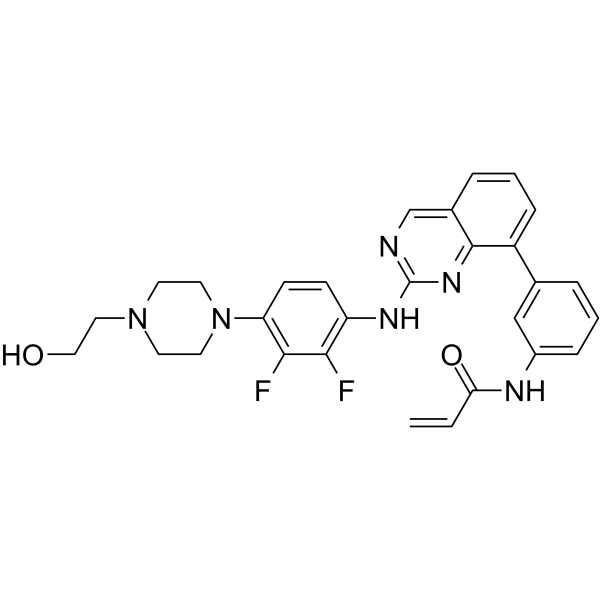
-
- HY-P9964
-
|
|
EGFR
|
Cancer
|
|
Necitumumab is a human IgG monoclonal antibody directed against EGFR. Necitumumab can be used for research of NSCLC, colorectal cancer, etc .
|
-

-
- HY-118263
-
|
PF-00299804 hydrate; PF-299804 hydrate
|
EGFR
|
Cancer
|
|
Dacomitinib (PF-00299804) hydrate is an orally active, irreversible pan-ErbB inhibitor. Dacomitinib hydrate can be used in the research of cancers such as metastatic non-small cell lung cancer (NSCLC) .
|
-
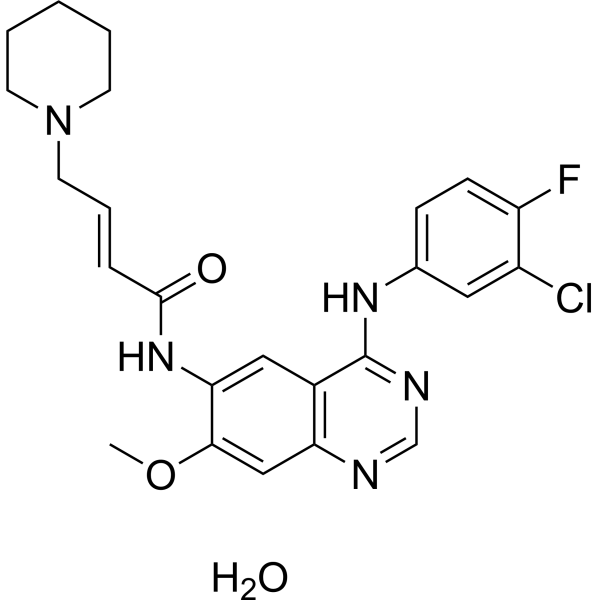
-
- HY-12857
-
|
AP-26113
|
Anaplastic lymphoma kinase (ALK)
|
Cancer
|
|
Brigatinib (AP-26113) is a highly potent, selective and orally active ALK inhibitor, with an IC50 of 0.6 nM. Brigatinib can be used for research of NSCLC .
|
-
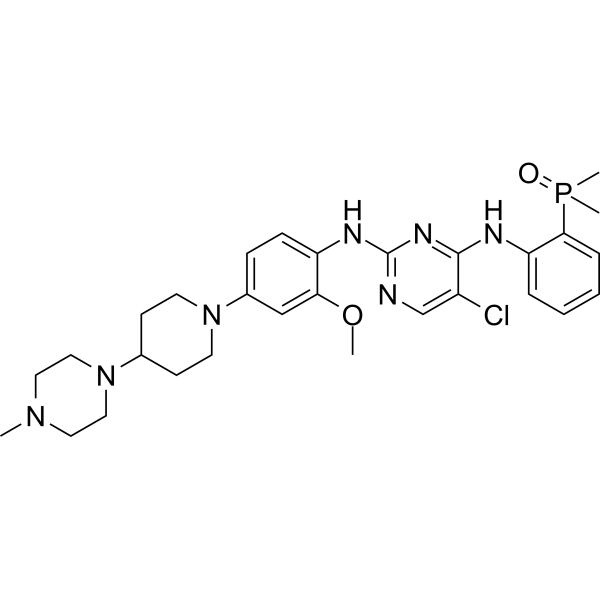
-
- HY-151571
-
|
|
Ras
|
Cancer
|
|
ZG1077 is a covalent KRAS G12C inhibitor. ZG1077 can be used in the research of non-small cell lung cancer (NSCLC) .
|
-
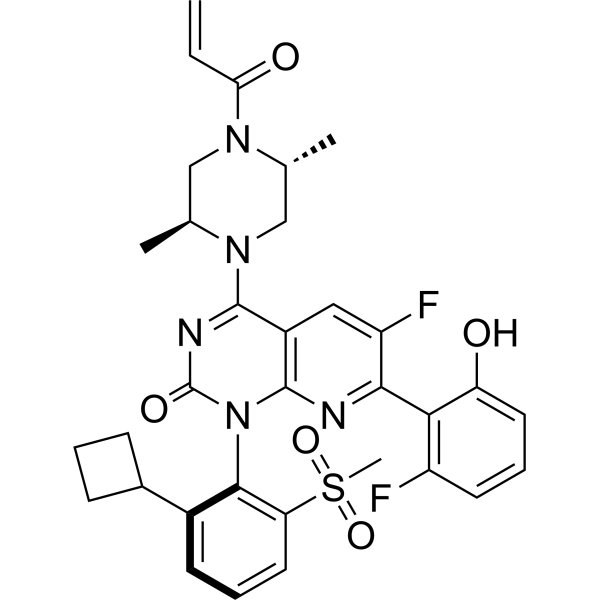
-
- HY-P5005
-
|
|
Biochemical Assay Reagents
|
Cancer
|
|
VIPhyb (compound VIPhyb) is a vasoactive intestinal polypeptide (VIP) receptor antagonist that can be used in the study of cancers such as non-small cell lung cancer (NSCLC) .
|
-
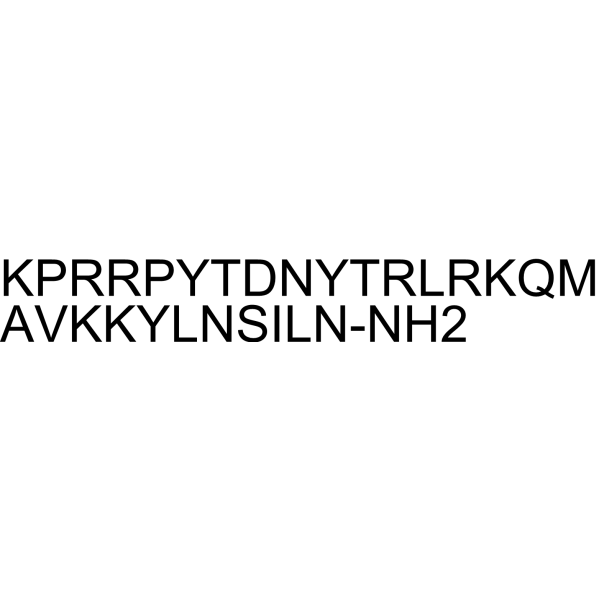
-
- HY-162300
-
|
|
EGFR
|
Cancer
|
EGFR kinase inhibitor 4 (Compound 4) is a bivalent ATP-allosteric EGFR inhibitor (IC50: 1.8 nM for mutant EGFR (LRTMCS)). EGFR kinase inhibitor 4 can be used for research of NSCLC .
|
-
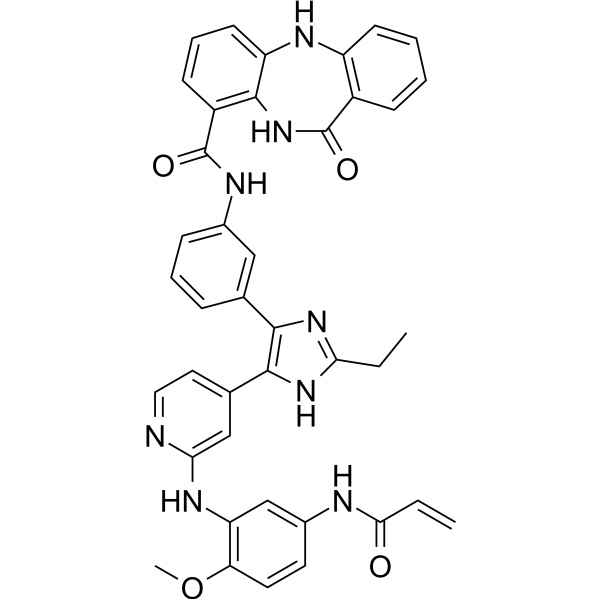
-
- HY-137433A
-
|
D-0316 mesylate
|
EGFR
|
Cancer
|
|
Befotertinib (D-0316) mesylate is the third-generation EGFR tyrosine kinase inhibitor. Befotertinib (D-0316) mesylate can be used for the research of EGFR T790M-positive non-small cell lung cancer (NSCLC) .
|
-
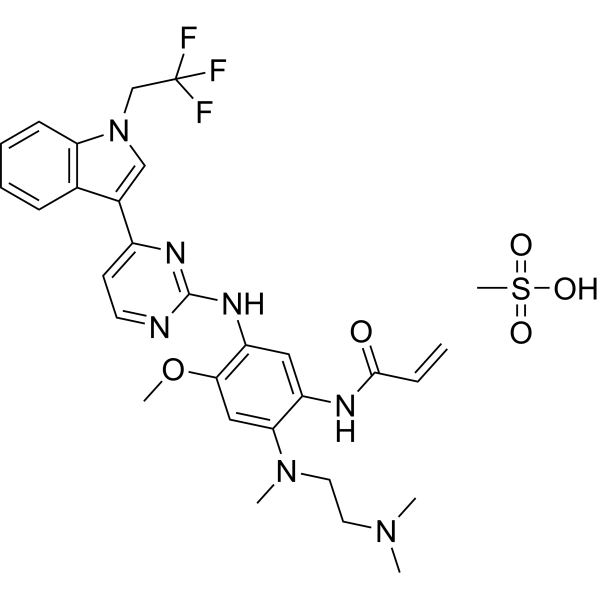
-
- HY-142283AS
-
|
|
EGFR
|
Cancer
|
|
Dosimertinib-d5 (mesylate) is a potent and orally active EGFR inhibitor. Dosimertinib-d5 (mesylate) decreases the expression of p-EGFR and p-ERK protein levels. Dosimertinib-d5 (mesylate) shows antiproliferative and anti-tumor activity. Dosimertinib-d5 (mesylate) has the potential for the research of non-small-cell lung cancer (NSCLC)[1].
|
-
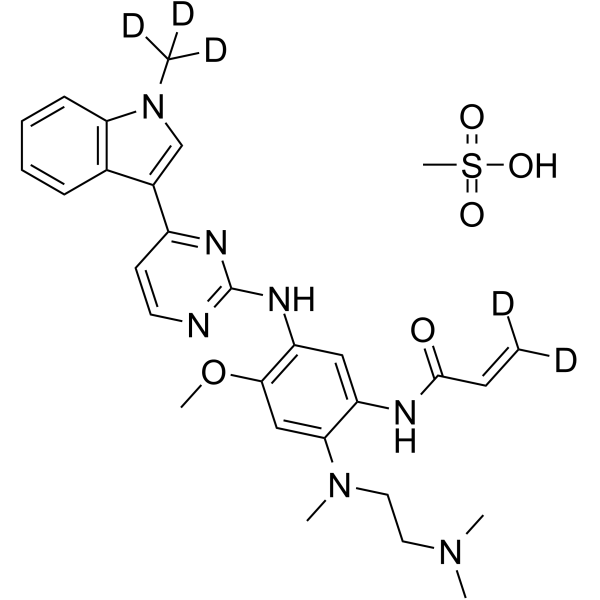
-
- HY-155163
-
-
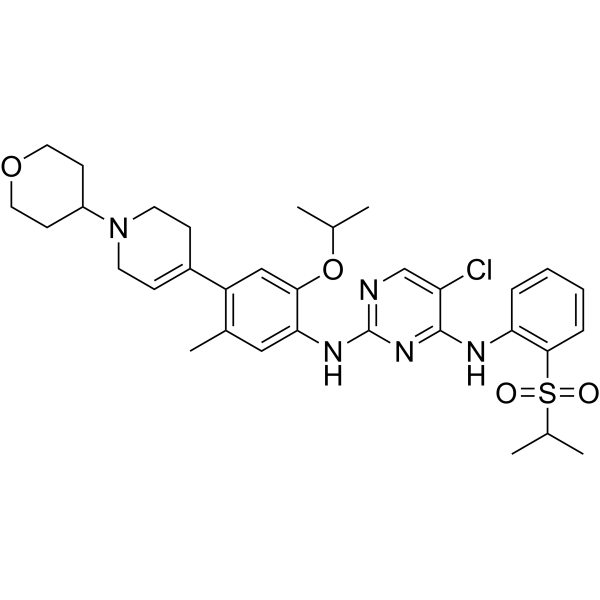
-
- HY-114491
-
|
|
ERK
Raf
|
Cancer
|
|
Rineterkib (compound B) is an orally available ERK1 and ERK2 inhibitor in the treatment of a proliferative disease characterized by activating mutations in the MAPK pathway. The activity is particularly related to the treatment of KRAS-mutant NSCLC, BRAF-mutant NSCLC, KRAS-mutant pancreatic cancer, KRAS-mutant colorectal cancer (CRC) and KRAS-mutant ovarian cancer. Rineterkib hydrochloride can also inhibit RAF .
|
-
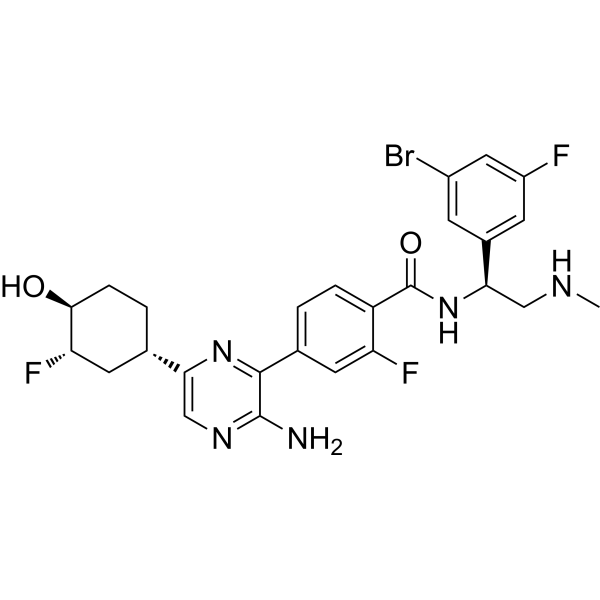
-
- HY-114491A
-
|
|
ERK
Raf
|
Cancer
|
|
Rineterkib hydrochloride (compound B) is an orally available ERK1 and ERK2 inhibitor in the treatment of a proliferative disease characterized by activating mutations in the MAPK pathway. The activity is particularly related to the treatment of KRAS-mutant NSCLC, BRAF-mutant NSCLC, KRAS-mutant pancreatic cancer, KRAS-mutant colorectal cancer (CRC) and KRAS-mutant ovarian cancer. Rineterkib hydrochloride can also inhibit RAF .
|
-
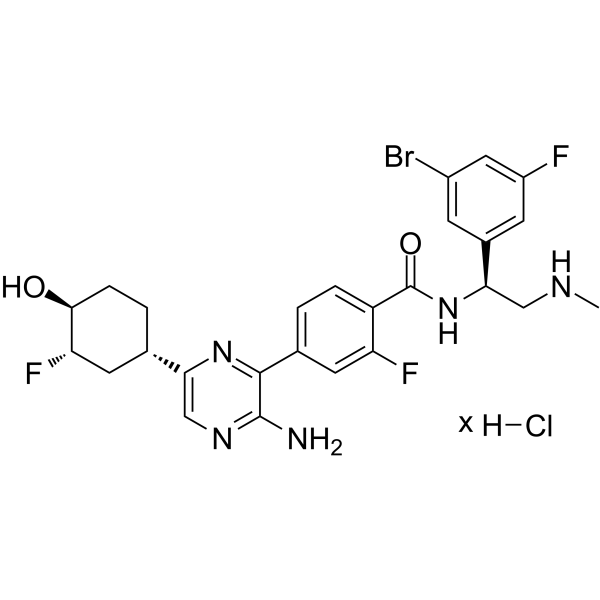
-
- HY-138751A
-
|
ASK120067 diTFA
|
EGFR
|
Cancer
|
|
limertinib (ASK120067) diTFA is a potent and orally active inhibitor of EGFR T790M (IC50: 0.3 nM) with selectivity over EGFR WT (IC50: 6.0 nM). limertinib diTFA is a third-generation EGFR-TKI for the research of non-small cell lung cancer (NSCLC) .
|
-
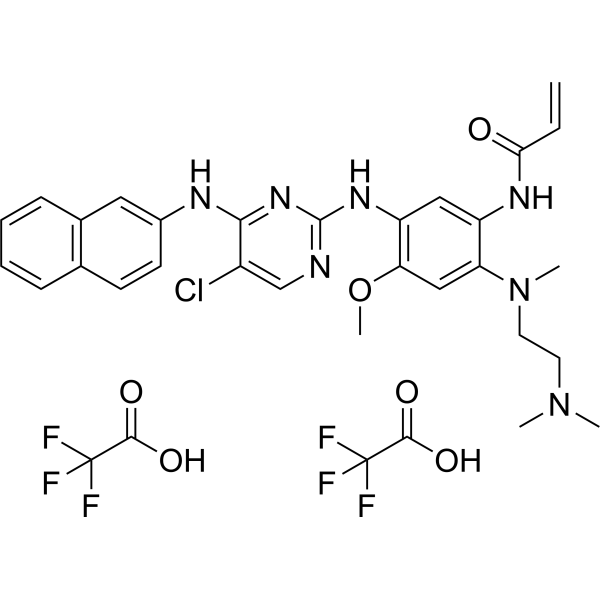
-
- HY-P99269
-
|
BIBH 1; Anti-Human FAP Recombinant Antibody
|
FAP
|
Cancer
|
|
Sibrotuzumab (BIBH 1) is a humanized IgG1 monoclonal antibody targets fibroblast activation protein (FAP). Sibrotuzumab can be used for the research of colorectal cancer and non-small cell lung cancer (NSCLC) .
|
-

-
- HY-138751
-
|
ASK120067
|
EGFR
|
Cancer
|
|
limertinib (ASK120067) is a potent and orally active inhibitor of EGFR T790M (IC50:0.3 nM) with selectivity over EGFR WT (IC50:6.0 nM). limertinib is a third-generation EGFR-TKI for the research of non-small cell lung cancer (NSCLC) .
|
-
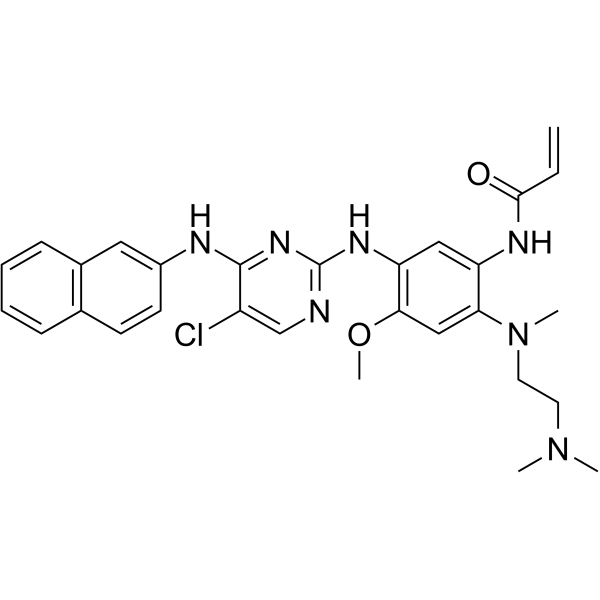
-
- HY-W423595
-
|
|
EGFR
|
Cancer
|
|
BEBT-109 is a potent pan-mutant-selective EGFR inhibitor. BEBT-109 has improved pharmacokinetic properties. BEBT-109 can be used for multiple mutant-EGFR-driven non-small cell lung cancer (NSCLC) research .
|
-
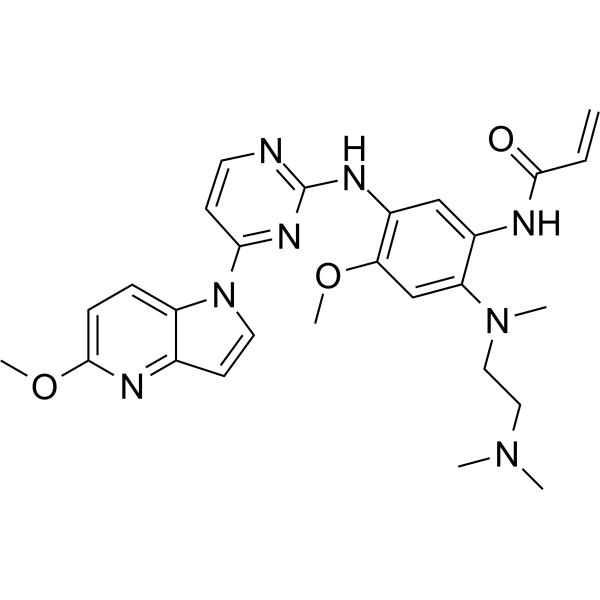
-
- HY-142283
-
|
|
Isotope-Labeled Compounds
EGFR
|
Cancer
|
|
Dosimertinib-d3-d3 is a potent and orally active EGFR inhibitor. Dosimertinib-d3-d3 decreases the expression of p-EGFR and p-ERK protein levels. Dosimertinib-d3-d3 shows antiproliferative and anti-tumor activity. Dosimertinib-d3-d3 has the potential for the research of non-small-cell lung cancer (NSCLC)[1].
|
-
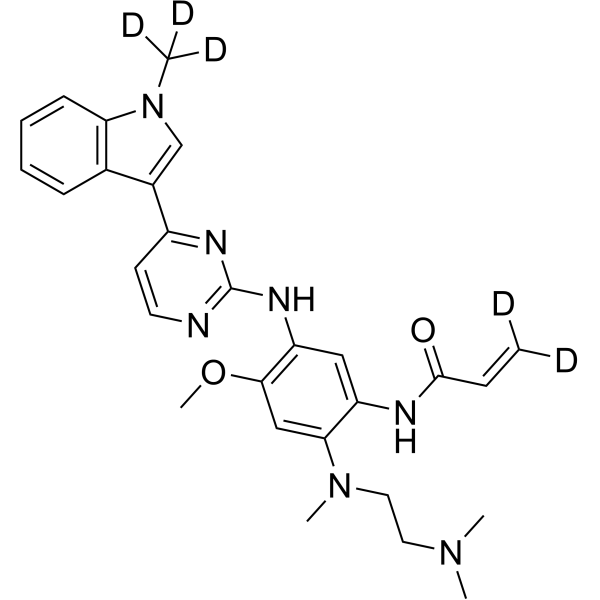
-
- HY-137433
-
|
D-0316
|
EGFR
|
Cancer
|
|
Befotertinib (D-0316) is the third-generation EGFR tyrosine kinase inhibitor. Befotertinib can be used for the research of EGFR T790M-positive non-small cell lung cancer (NSCLC) .
|
-
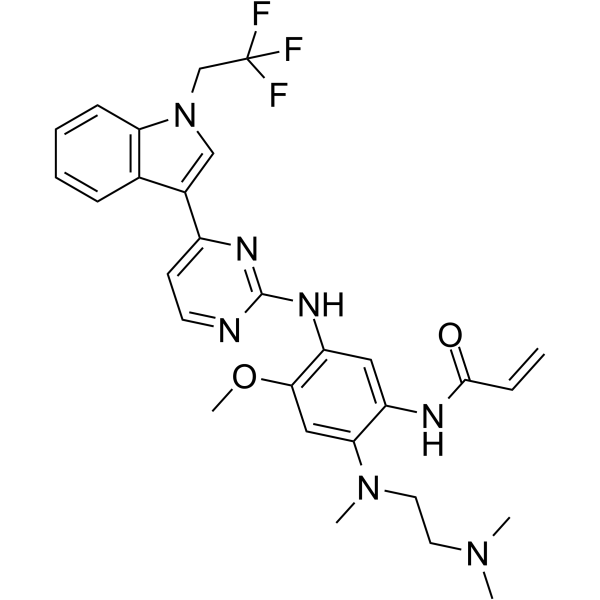
-
- HY-N11912
-
|
|
Biochemical Assay Reagents
|
Cancer
|
|
Soladulcoside A is a steroidal glycoside and antineoplastic agent that can be obtained from the whole plant of Solanum nigrum. Soladulcoside A can inhibit A549 cells and has the potential to study cancers such as non-small cell lung cancer (NSCLC) .
|
-
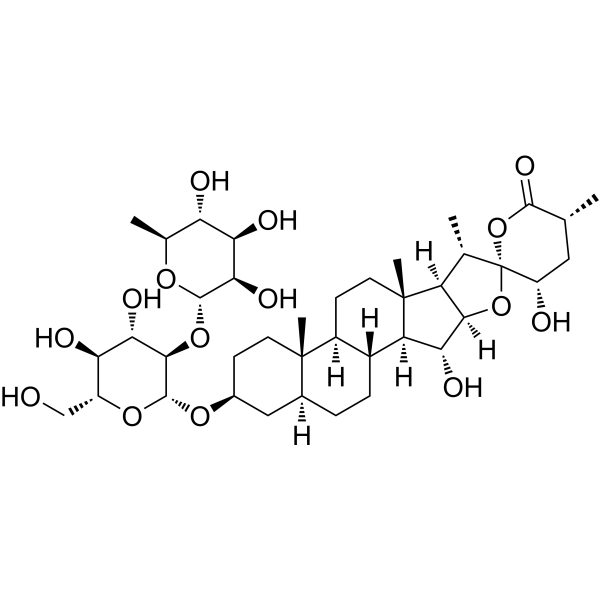
-
- HY-18750A
-
|
AZD3759 hydrochloride
|
EGFR
Apoptosis
|
Cancer
|
|
Zorifertinib (AZD3759) hydrochloride is a potent, orally active, central nervous system-penetrant, EGFR inhibitor (IC50s: 0.3, 0.2, and 0.2 nM for EGFR wt, EGFR L858R, and EGFR exon 19Del, respectively). Zorifertinib hydrochloride induces cancer cell apoptosis. Zorifertinib hydrochloride has antitumor activity, and can be used for NSCLC, HCC etc. research .
|
-
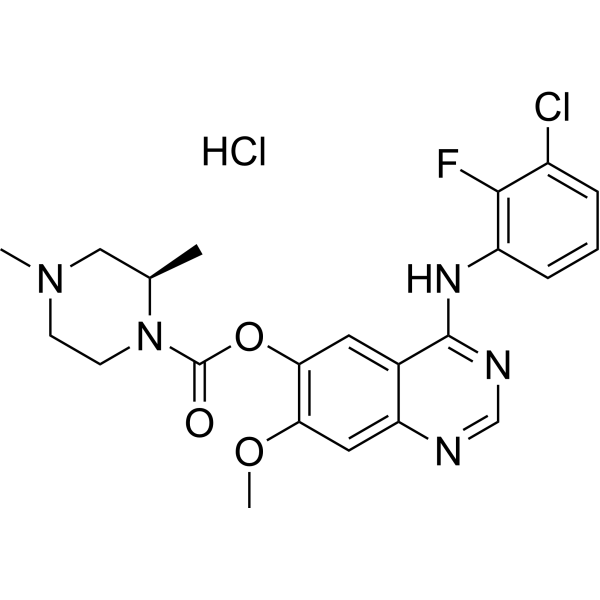
-
- HY-148900
-
|
|
E1/E2/E3 Enzyme
|
Cancer
|
|
SCFSkp2-IN-2 (Compound AAA-237) is a Skp2 inhibitor with a KD of 28.77 μM. AAA-237 induces apoptosis of NSCLC cells and shows antitumor activities .
|
-
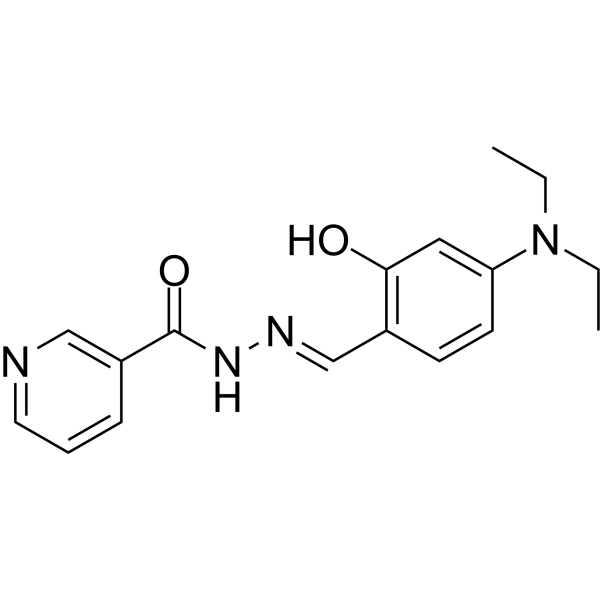
-
- HY-112870A
-
|
Alflutinib mesylate; Furmonertinib mesylate; AST2818 mesylate
|
EGFR
|
Cancer
|
|
Firmonertinib (Alflutinib) mesylate is is a potent inhibitor of EGFR. Firmonertinib mesylate inhibits EGFR active mutations as well as the T790M acquired resistant mutation. Firmonertinib has the potential for the research of cancer diseases, especially non-small cell lung cancer (NSCLC) .
|
-
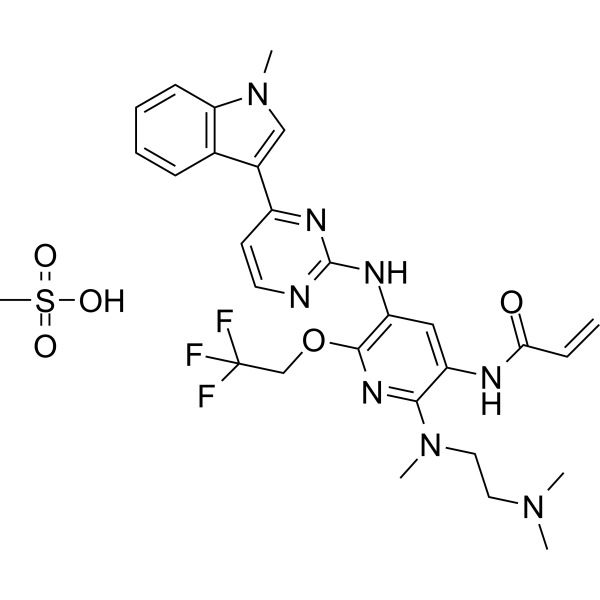
-
- HY-145574
-
|
WX-0593
|
Anaplastic lymphoma kinase (ALK)
ROS Kinase
|
Cancer
|
|
Iruplinalkib (WX-0593) is a potent, selective, and orally active inhibitor of ALK and ROS1 tyrosine kinase. Iruplinalkib (WX-0593) shows favorable safety and promising antitumor activity in advanced NSCLC with ALK or ROS1 rearrangement .
|
-
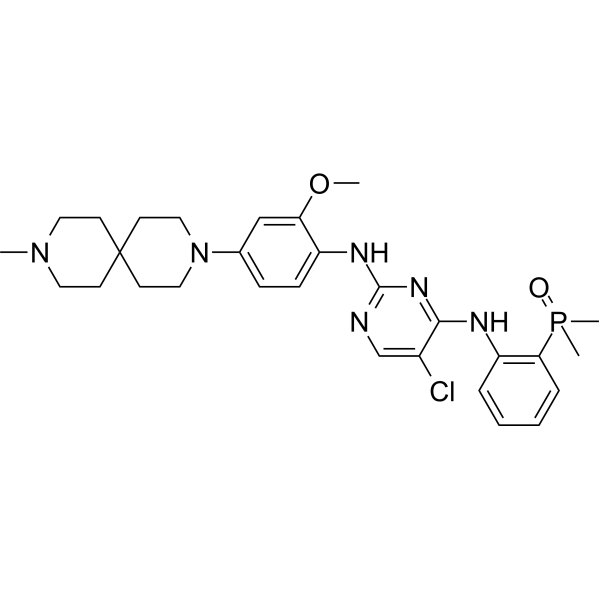
-
- HY-112870
-
|
Alflutinib; Furmonertinib; AST2818
|
EGFR
|
Cancer
|
|
Firmonertinib (Alflutinib) is a potent inhibitor of EGFR. Firmonertinib inhibits EGFR active mutations as well as the T790M acquired resistant mutation. Firmonertinib has the potential for the research of cancer diseases, especially non-small cell lung cancer (NSCLC) .
|
-
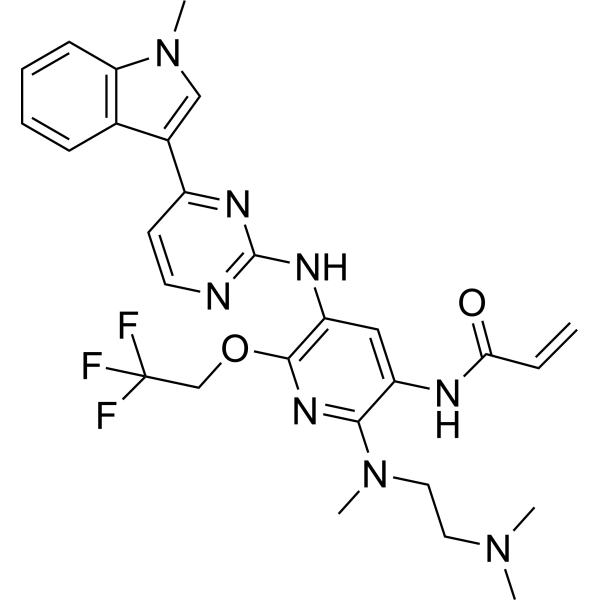
-
- HY-139534
-
|
|
ROR
Apoptosis
|
Cancer
|
|
ARI-1 is an inhibitor of receptor tyrosine kinase-like orphan receptor 1 (ROR1) inhibitor. ARI-1 effectively inhibits aberrant ROR1 expression, which is associated with the development of non-small cell lung cancer (NSCLC) and EGFR-TKI-induced drug resistance. ARI-1 binds to the extracellular Frizzled domain of ROR1 and regulates PI3K/AKT/mTOR signaling in a ROR1-dependent manner. ARI-1 potently inhibits NSCLC cell proliferation and migration and has antitumor activity in vivo [1] .
|
-
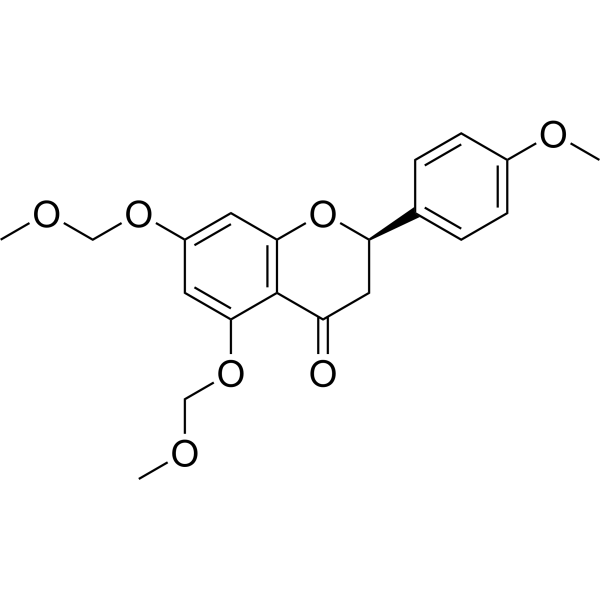
-
- HY-110171
-
iMDK
1 Publications Verification
|
PI3K
|
Cancer
|
|
iMDK is a potent PI3K inhibitor and inhibits the growth factor MDK (also known as midkine or MK). iMDK suppresses non-small cell lung cancer (NSCLC) cooperatively with A MEK inhibitor without harming normal cells and mice .
|
-
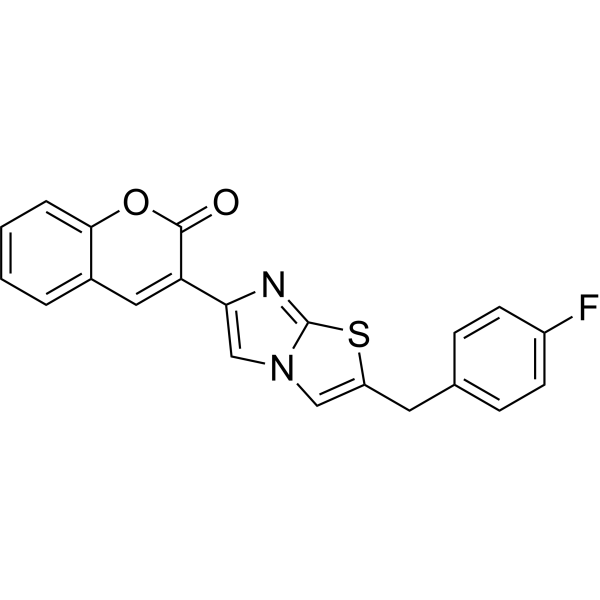
-
- HY-110171A
-
|
|
PI3K
|
Cancer
|
|
iMDK quarterhydrate is a potent PI3K inhibitor and inhibits the growth factor MDK (also known as midkine or MK). iMDK quarterhydrate suppresses non-small cell lung cancer (NSCLC) cooperatively with A MEK inhibitor without harming normal cells and mice .
|
-
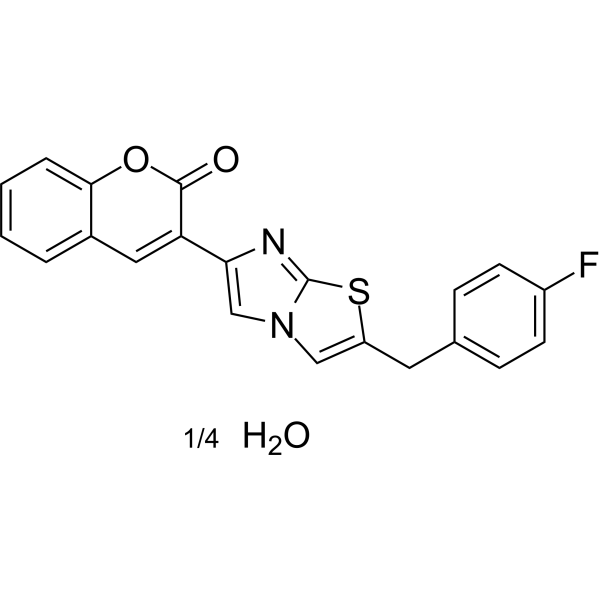
-
- HY-152098
-
|
|
EGFR
|
Cancer
|
|
HX103 is an epidermal growth factor receptor (EGFR)-tyrosine kinase inhibitor (TKI)-based fluorogenic probe. HX103 inhibits EGFR 19 del, EGFR L858R, EGFR wild type and EGFR T790M with IC50s of 1.3, 1.5, 4.0 and 977 nM, respectively. HX103 can be used for quantifying active-EGFR to predict agent sensitivity in NSCLC patients with EGFR-activating mutations .
|
-
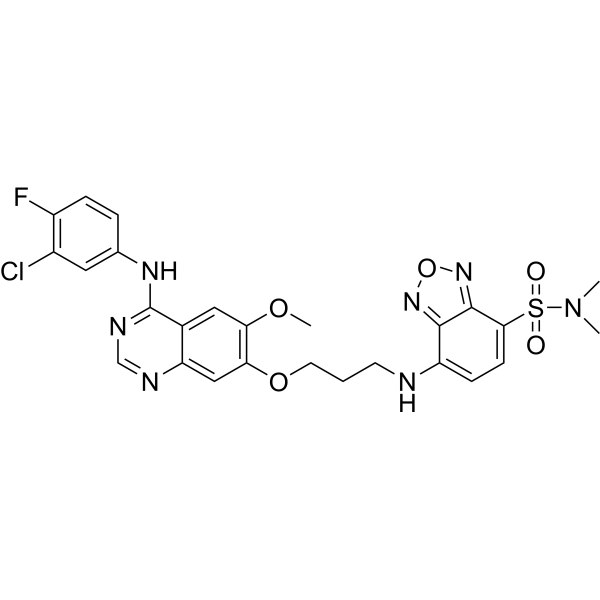
-
- HY-158006
-
|
|
MetAP
|
Cancer
|
|
SDX-7539 is a selective inhibitor for Methionine aminopeptidase type 2 (MetAP2). SDX-7539 inhibits proliferarion of HUVECs with an IC50 of 120 μM. SDX-7539 exhibits antitumor activity in NSCLC xenograft athymic nude mice .
|
-
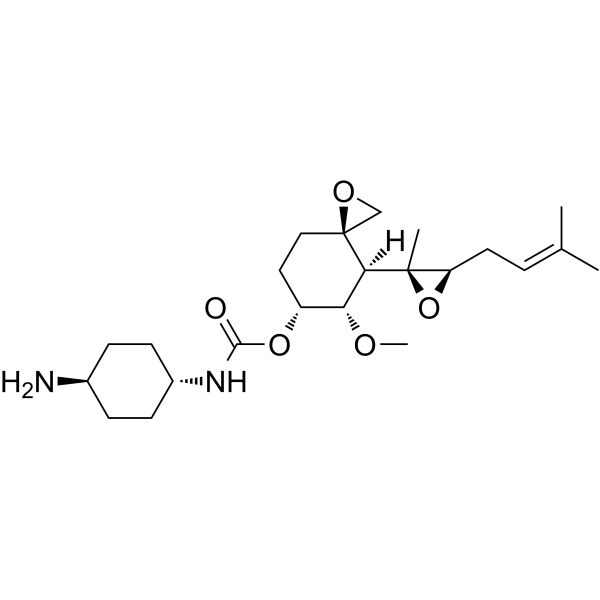
-
- HY-114358
-
|
ONO-7475
|
TAM Receptor
Trk Receptor
|
Cancer
|
|
Tamnorzatinib (ONO-7475) is a potent, selective, and orally active Axl/Mer inhibitor with IC50 values of 0.7 nM and 1.0 nM, respectively. Tamnorzatinib sensitizes AXL-overexpressing EGFR-mutant NSCLC cells to the EGFR-TKIs, suppresses the emergence and maintenance of tolerant cells. Tamnorzatinib combines with Osimertinib (HY-15772) provides a bright promise for the study of EGFR-mutated non-small cell lung cancer (NSCLC).
|
-
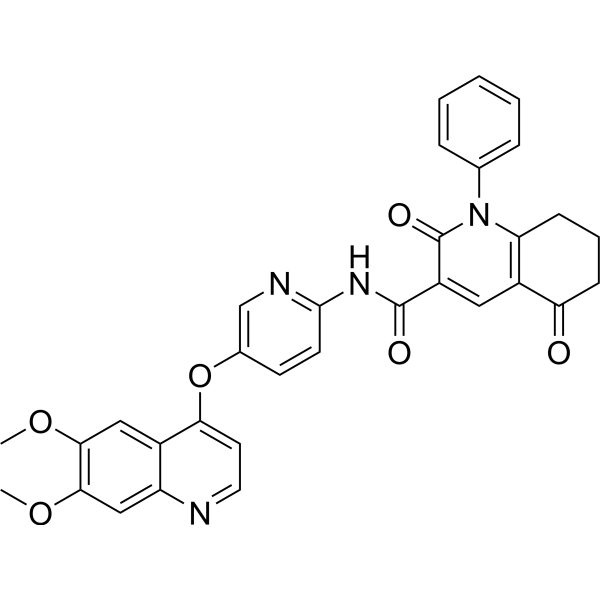
-
- HY-153604
-
|
|
Histone Acetyltransferase
|
Cancer
|
|
MC4171 (compound 34) is a selective KAT8 inhibitor (IC50=8.1 µM). MC4171 has been shown to exhibit moderate micromolar antiproliferative activity in different cancer cell lines, including NSCLC and AML, with potential for studying cancer .
|
-
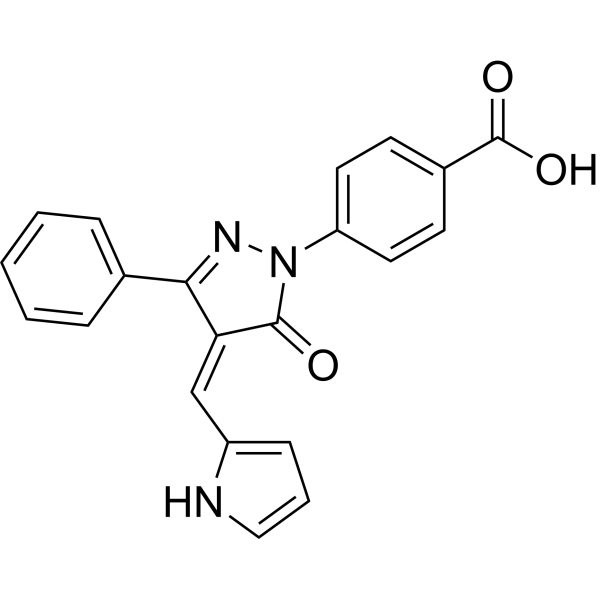
-
- HY-151905
-
|
|
c-Met/HGFR
|
Cancer
|
|
D6808 is a highly selective and potent c‑Met inhibitor with an IC50 value of 2.9 nM. D6808 induces cell apoptosis and cell cycle arrest. D6808 can be used for the research of NSCLC and gastric cancers .
|
-
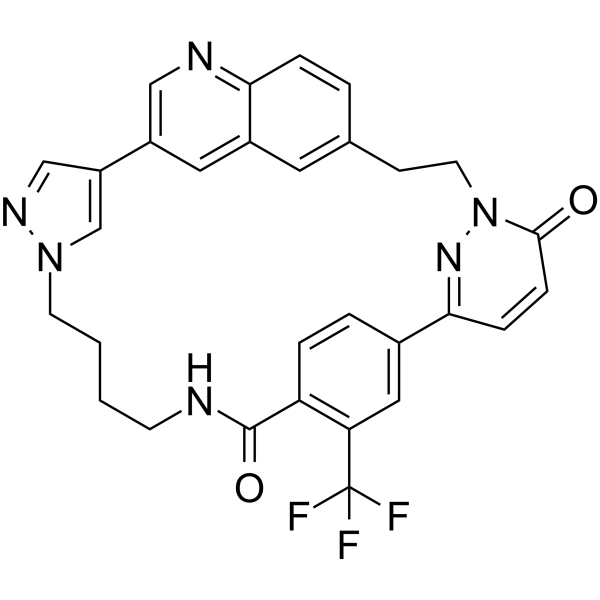
-
- HY-161284
-
|
|
MMP
|
Cancer
|
|
MMP-9/10-IN-1 (Compound 6b) is a potent dual MMP-9/10 Inhibotor with IC50s of 0.076 and 0.139 μM against NSCLC and A549 cells, respectively. MMP-9/10-IN-1 has anti-invasive and anti-angiogenic activities when in combination with Sorafenib (HY-10201) .
|
-
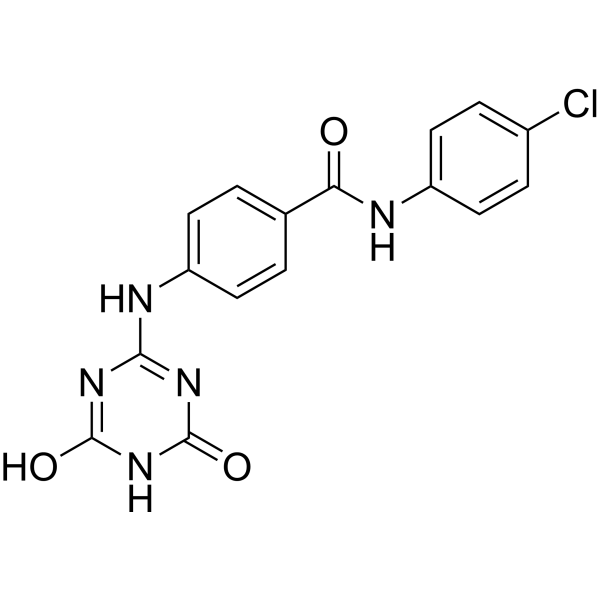
-
- HY-150571
-
|
|
Topoisomerase
c-Myc
Apoptosis
ROS Kinase
|
Cancer
|
|
Anticancer agent 76 (Compound CT2-3) is an anticancer agent. Anticancer agent 76 significantly inhibits the proliferation of human NSCLC cells, induces cell cycle arrest, causes ROS generation and induces cell apoptosis .
|
-
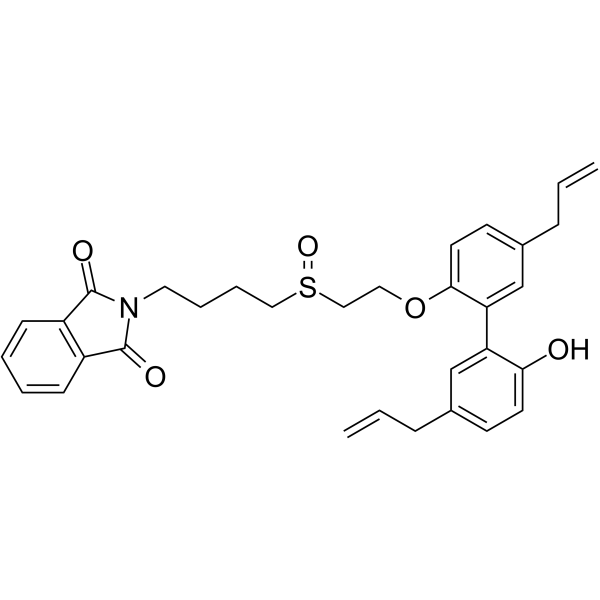
-
- HY-P99223
-
|
MEDI-575
|
PDGFR
|
Cancer
|
|
Tovetumab (MEDI-575) is an anti-PDGFRα monoclonal antibody that selectively blocks the PDGFRα signal transduction. Tovetumab can be used in the research of glioblastoma and non-small cell lung cancer (NSCLC) .
|
-

-
- HY-119307
-
|
TMI-005
|
MMP
TNF Receptor
|
Cancer
|
|
Apratastat (TMI-005) is an orally active, non-selective and reversible TACE/MMPs inhibitor, can inhibit inhibit the release of TNF-α. Apratastat has the potential to overcome radiotherapy-resistance in non-small cell lung cancer (NSCLC) . Apratastat is a click chemistry reagent, it contains an Alkyne group and can undergo copper-catalyzed azide-alkyne cycloaddition (CuAAc) with molecules containing Azide groups.
|
-
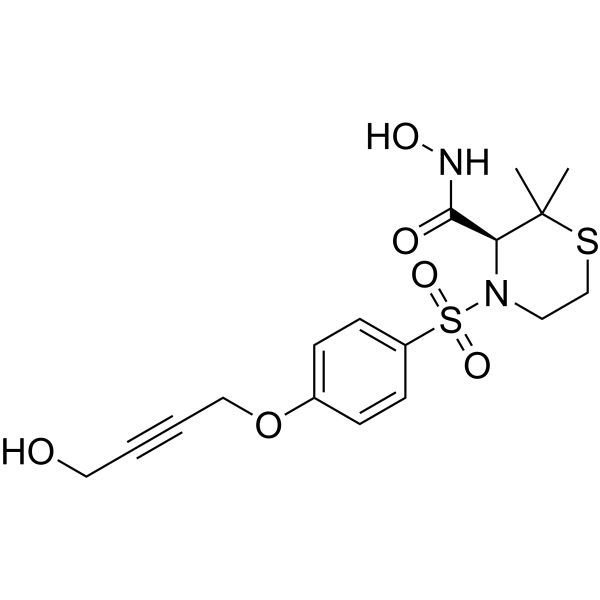
-
- HY-135815
-
|
TAK-788; AP32788
|
EGFR
|
Cancer
|
|
Mobocertinib (TAK-788) is an orally active and irreversible EGFR/HER2 inhibitor. Mobocertinib potently inhibits oncogenic variants containing activating EGFRex20ins mutations with selectivity over wild-type EGFR. Mobocertinib can be used in NSCLC research .
|
-
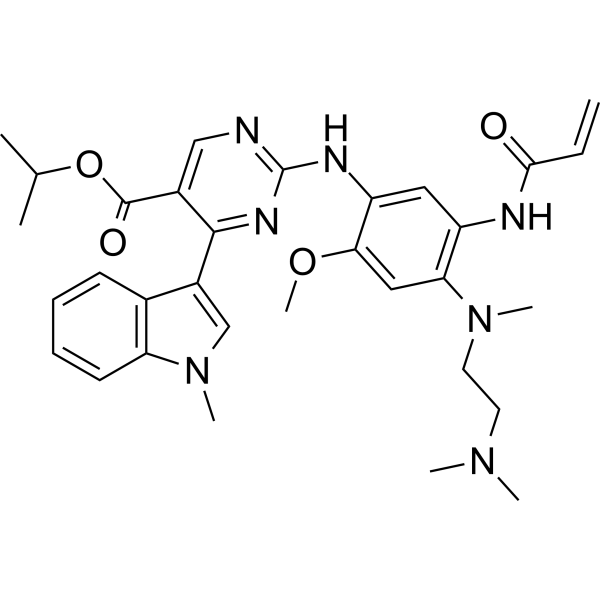
-
- HY-135815B
-
|
TAK-788 mesylate; AP32788 mesylate
|
EGFR
|
Cancer
|
|
Mobocertinib (TAK-788) mesylate is an orally active and irreversible EGFR/HER2 inhibitor. Mobocertinib mesylate potently inhibits oncogenic variants containing activating EGFRex20ins mutations with selectivity over wild-type EGFR. Mobocertinib mesylate can be used in NSCLC research .
|
-
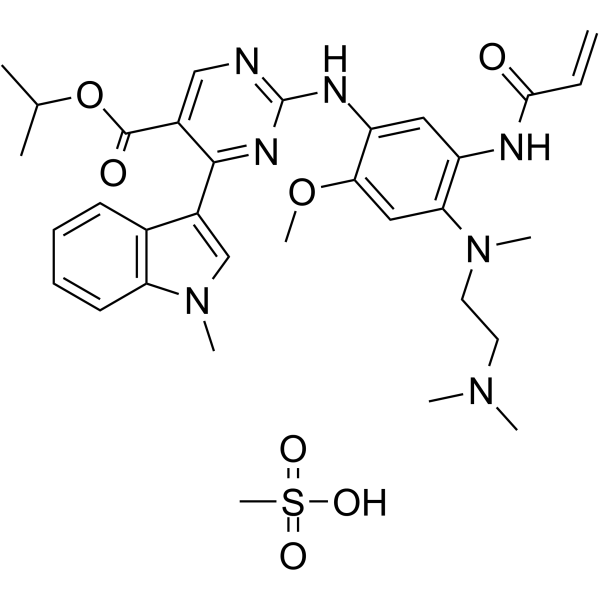
-
- HY-123766
-
|
|
EGFR
|
Cancer
|
|
EGFR-IN-99 (compound 1a) is a potent EGFR and HER2 Exon 20 insertion mutant inhibitor. EGFR-IN-99 has excellent antiproliferative activity against DFCI127 cells, with an EC50 of 11.5 nM. EGFR-IN-99 can be used for the research of non-small cell lung cancer (NSCLC) .
|
-
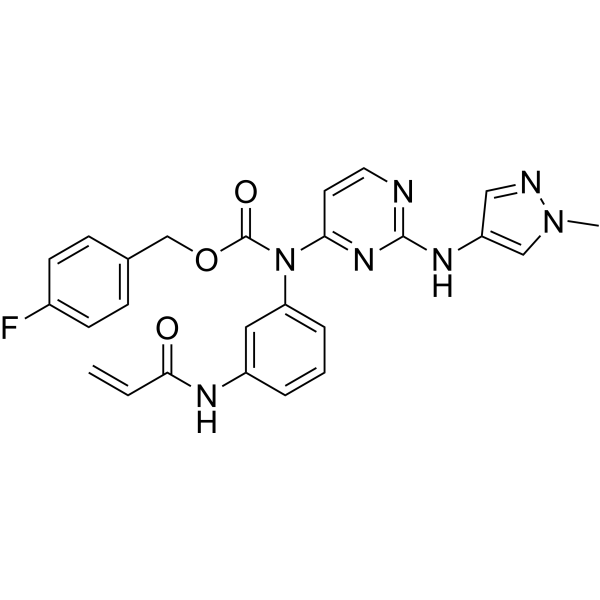
-
- HY-147942
-
|
|
PROTACs
EGFR
|
Cancer
|
|
MS9449 is a potent PROTAC EGFR degrader with Kds of 17 nM and 10 nM for EGFR WT and EGFR L858R, respectively. MS9449 effectively induces degradation of mutant EGFRs through both the ubiquitin/proteasome system (UPS) and autophagy/lysosome pathways. MS9449 potently inhibits the proliferation of NSCLC cells. MS9449 can be used for researching anticancer .
|
-
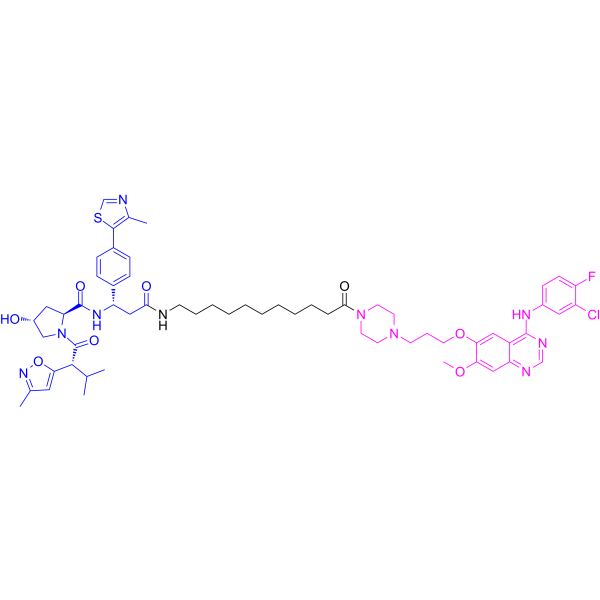
-
- HY-P99827
-
|
TSR-022; GSK4069889
|
Tim3
|
Cancer
|
|
Cobolimab (TSR-022) is an anti-TIM-3 monoclonal antibody. Cobolimab mediates the internalization of TIM3 with an IC50 value of 0.4464 nM. Cobolimab has potential application in solid tumors and non-small cell lung cancer (NSCLC) .
|
-

-
- HY-135815A
-
|
TAK-788 succinate; AP32788 succinate
|
EGFR
|
Cancer
|
|
Mobocertinib (TAK-788) succinate is an orally active and irreversible EGFR/HER2 inhibitor. Mobocertinib succinate potently inhibits oncogenic variants containing activating EGFRex20ins mutations with selectivity over wild-type EGFR. Mobocertinib succinate can be used in NSCLC research .
|
-
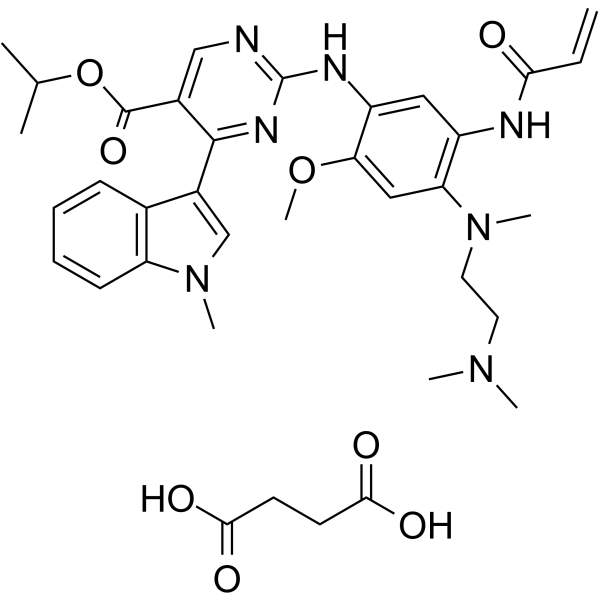
-
- HY-147941
-
|
|
PROTACs
EGFR
|
Cancer
|
|
MS9427 is a potent PROTAC EGFR degrader with Kds of 7.1 nM and 4.3 nM for EGFR WT and EGFR L858R, respectively. MS9427 selectively degrades the mutant but not the WT EGFR through both the ubiquitin/proteasome system (UPS) and autophagy/lysosome pathways. MS9427 potently inhibits the proliferation of NSCLC cells. MS9427 can be used for researching anticancer .
|
-
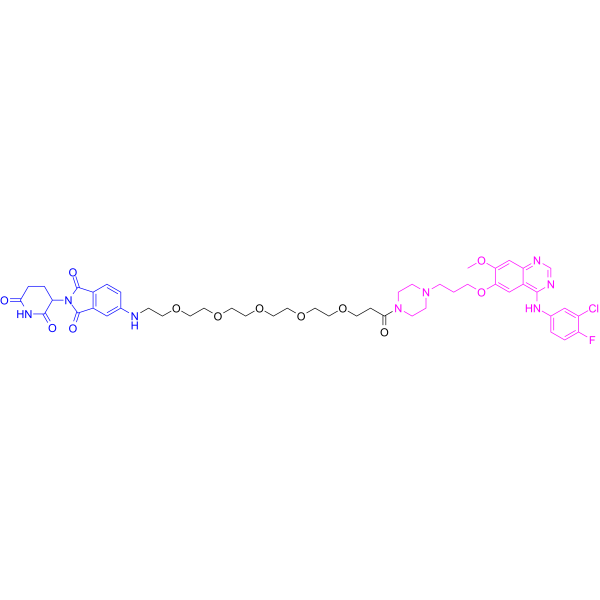
-
- HY-153901
-
|
|
EGFR
PROTACs
|
Cancer
|
|
PROTAC EGFR degrader 8 (T-184) is a PROTAC EGFR degrader. PROTAC EGFR degrader 8 degrades EGFR in HCC827 cell with a DC50 of 15.56 nM. PROTAC EGFR degrader 8 inhibits H1975, PC-9, HCC827 cell growth with IC50s of 7.72 nM, 121.9 nM, 14.21 nM. PROTAC EGFR degrader 8 can be used for research of cancer, especially NSCLC .
|
-
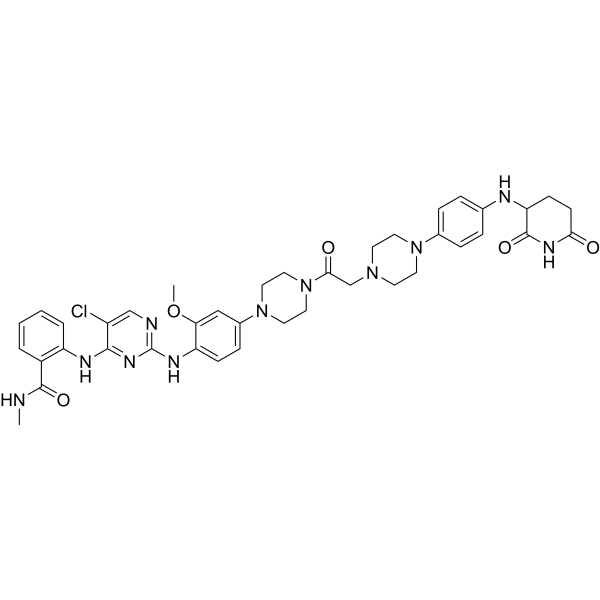
-
- HY-139047
-
|
|
GLUT
|
Cancer
|
|
SW157765 is a selective non-canonical glucose transporter GLUT8 (SLC2A8) inhibitor. KRAS/KEAP1 double mutant NSCLC cells are selectively sensitive to the SW157765, due to the convergent consequences of dual KRAS and NRF2 modulation of metabolic and xenobiotic gene regulatory programs .
|
-
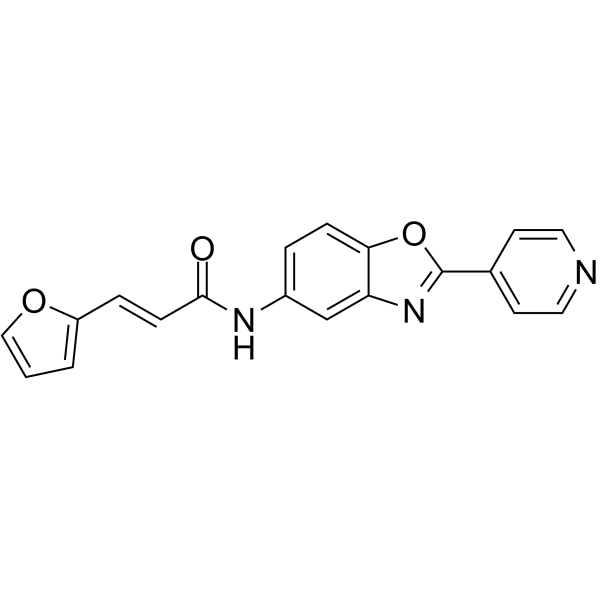
-
- HY-151377
-
|
|
RET
EGFR
Aurora Kinase
c-Fms
MAP4K
|
Cancer
|
|
RET-IN-19 (compound 59) is a potent RET inhibitor, with IC50 values of 6.8 and 13.51 nM against RET-wt and RET V804M, respectively. RET-IN-19 shows anticancer activity. RET-IN-19 can be used for non-small cell lung cancer (NSCLC) research .
|
-
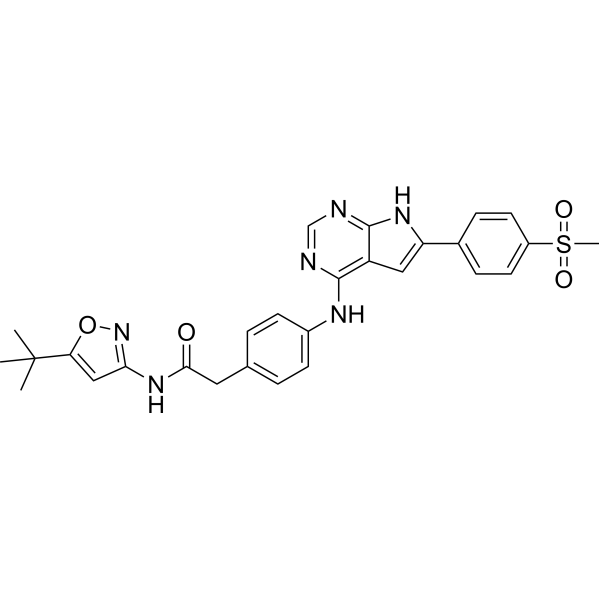
-
- HY-144048
-
|
|
EGFR
|
Cancer
|
|
EGFR-IN-31 is a potent inhibitor of EGFR. Overexpression and mutation of the epidermal growth factor receptor (EGFR) has been clearly demonstrated to lead to uncontrollable cell growth and is associated with the progression of most cancer diseases, especially NSCLC. EGFR-IN-31 has the potential for the research of diseases associated with EGFR mutations (extracted from patent WO2021185298A1, compound 2) .
|
-
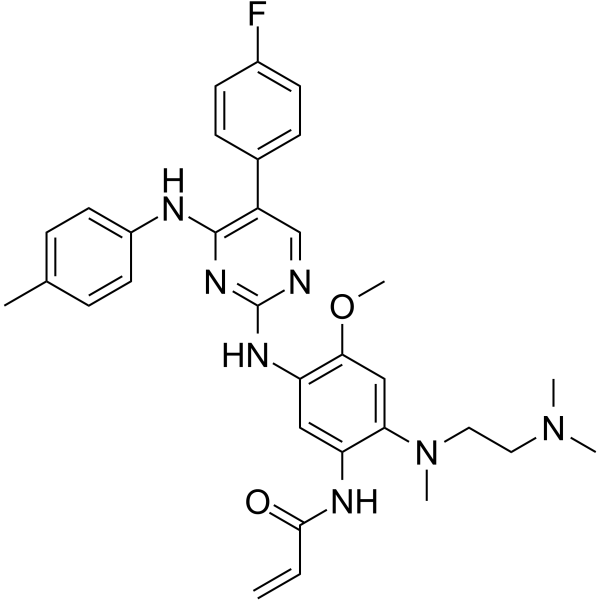
-
- HY-144049
-
|
|
EGFR
|
Cancer
|
|
EGFR-IN-32 is a potent inhibitor of EGFR. Overexpression and mutation of the epidermal growth factor receptor (EGFR) has been clearly demonstrated to lead to uncontrollable cell growth and is associated with the progression of most cancer diseases, especially NSCLC. EGFR-IN-32 has the potential for the research of diseases associated with EGFR mutations (extracted from patent WO2021185297A1, compound 2) .
|
-
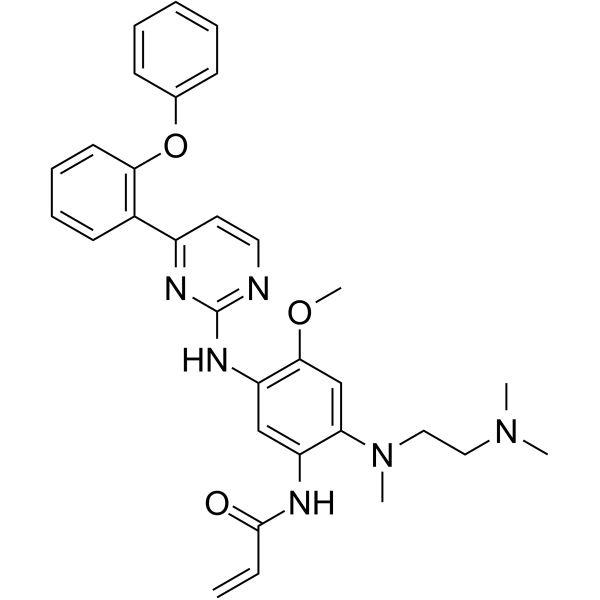
-
- HY-147941A
-
|
|
PROTACs
EGFR
|
Cancer
|
|
MS9427 TFA is a potent PROTAC EGFR degrader with Kds of 7.1 nM and 4.3 nM for EGFR WT and EGFR L858R, respectively. MS9427 TFA selectively degrades the mutant but not the WT EGFR through both the ubiquitin/proteasome system (UPS) and autophagy/lysosome pathways. MS9427 TFA potently inhibits the proliferation of NSCLC cells. MS9427 TFA can be used for researching anticancer .
|
-
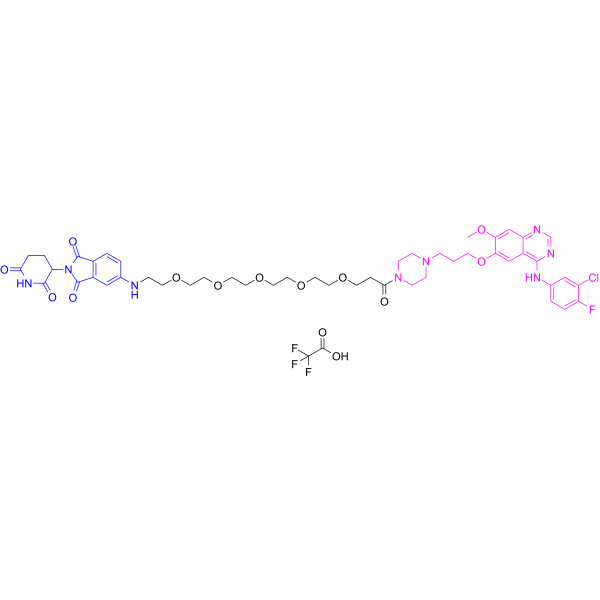
-
- HY-107553
-
|
|
HSP
Apoptosis
|
Cancer
|
|
Chetomin, an active component of Chaetomium globosum, is a heat shock protein 90/hypoxia-inducible factor 1 alpha (Hsp90/HIF1α) pathway inhibitor. Chetomin is a potent, nontoxic non-small cell lung cancer cancer stem cells (NSCLC CSC)-targeting molecule .
|
-
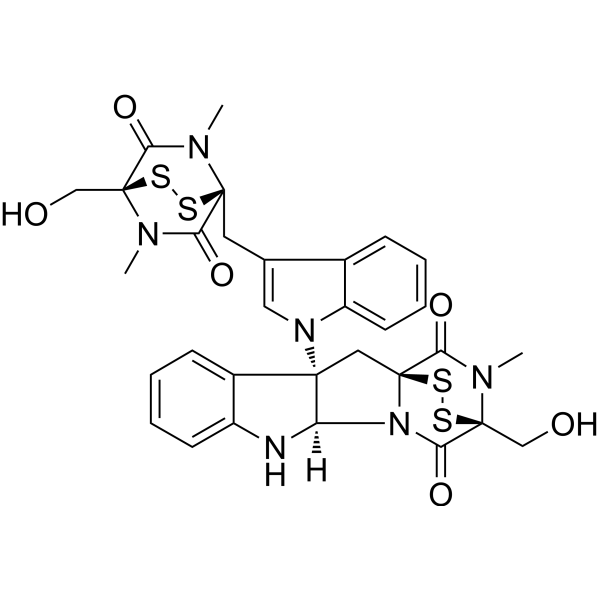
- HY-161269
-
|
|
EGFR
|
Cancer
|
|
EGFR-IN-101 (I-10) is a 2-phenylamino pyrimidine derivative. EGFR-IN-101 is a EGFR inhibitor. The IC50 values for EGFR L858R/T790M/C797S and Ba/F3-EGFR L858R/T790M/C797S are 33.26 and 106.4 nM, respectively. EGFR-IN-101 can be used IN the study of non-small cell lung cancer (NSCLC) .
|
-
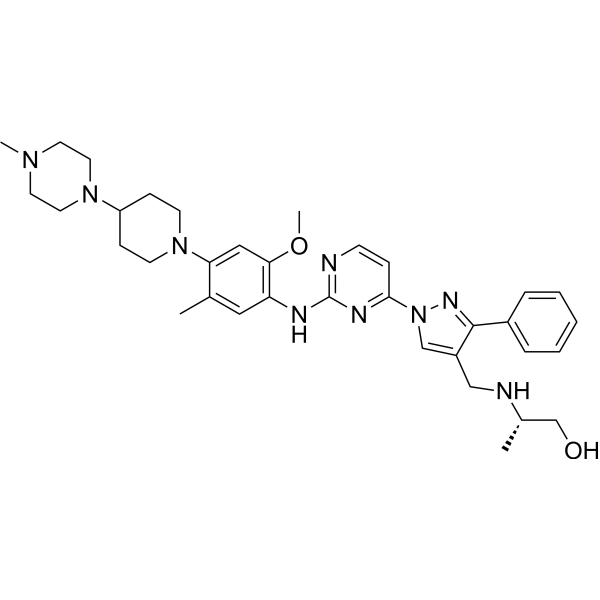
- HY-157427
-
|
|
PROTACs
Polo-like Kinase (PLK)
|
Cancer
|
|
PROTAC PLK1 Degrader-1 (DD-2) is a potent PROTAC PLK1 degrader. PROTAC PLK1 Degrader-1 selectively induces PLK1 degradation in cancer cells, including HeLa (DC50=2.5 μM) and nonsmall cell lung cancer (NSCLC), through the N-degron pathway .
|
-
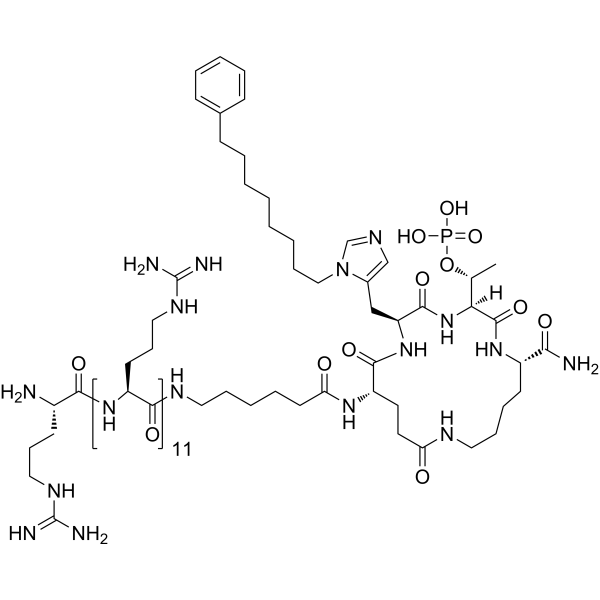
- HY-145433
-
|
|
Others
|
Cancer
|
|
17β-HSD1-IN-1 (Compound 1) is a highly selective 17β-HSD1 inhibitor with IC50s of 5.6 and 3155 nM for 17β-HSD1 and 17β-HSD2, respectively. 17β-HSD1-IN-1 can be used for the research of non-small cell lung cancer (NSCLC) .
|
-
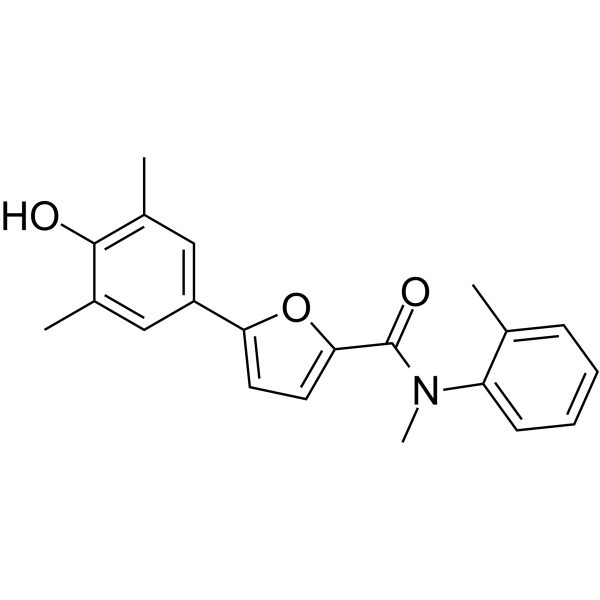
- HY-155227
-
|
|
Anaplastic lymphoma kinase (ALK)
EGFR
Apoptosis
|
Cancer
|
|
ALK/EGFR-IN-1 (Compound 8l) is an ALK/EGFR dual inhibitor that blocks the phosphorylation of EGFR and ALK. ALK/EGFR-IN-1 inhibits ALK/EGFR mutants respectively, with IC50 of 4.3 nM for EGFR L858R T790M in H1975 cells and EML4-ALK in BaF3 cells, respectively. and 3.6 nM. ALK/EGFR-IN-1 may be used in NSCLC research .
|
-
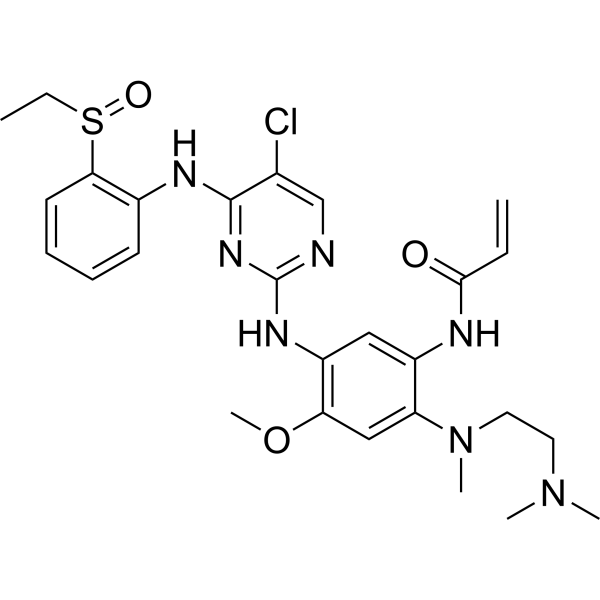
- HY-148510
-
|
|
Phosphatase
|
Cancer
|
|
HKB99 is an allosteric inhibitor of phosphoglycerate mutase 1 (PGAM1). HKB99 inhibits the formation of invasive pseudopodia and increases the level of PAI-2 in vitro. HKB99 increases the oxidative stress, activates JNK/c-Jun and suppresses AKT and ERK. HKB99 can be used for the research of non-small-cell lung cancer (NSCLC) .
|
-
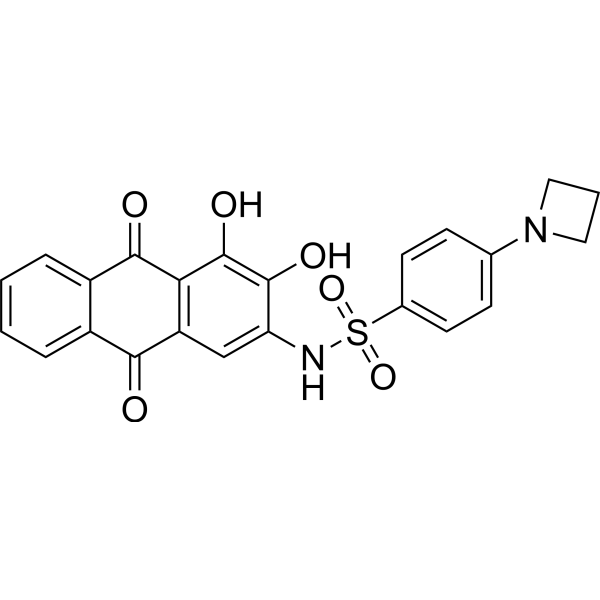
- HY-19642A
-
|
MGCD265 hydrochloride
|
TAM Receptor
c-Met/HGFR
|
Cancer
|
|
Glesatinib hydrochloride (MGCD265 hydrochloride) is an orally active, potent MET/SMO dual inhibitor. Glesatinib hydrochloride, a tyrosine kinase inhibitor, antagonizes P-glycoprotein (P-gp) mediated multidrug resistance (MDR) in non-small cell lung cancer (NSCLC) .
|
-
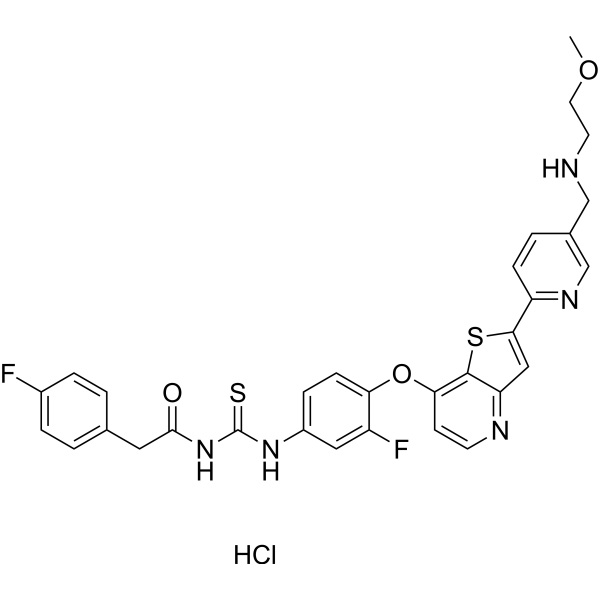
- HY-19642
-
|
MGCD265
|
TAM Receptor
c-Met/HGFR
|
Cancer
|
|
Glesatinib (MGCD265) is an orally active, potent MET/SMO dual inhibitor. Glesatinib, a tyrosine kinase inhibitor, antagonizes P-glycoprotein (P-gp) mediated multidrug resistance (MDR) in non-small cell lung cancer (NSCLC) .
|
-
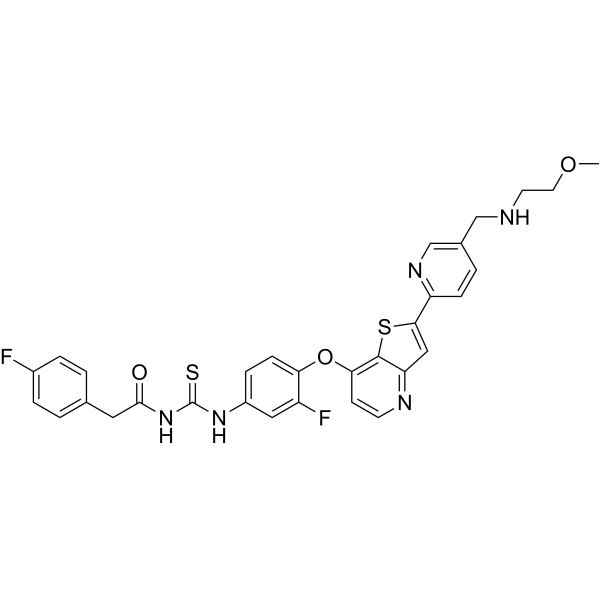
- HY-147281
-
|
|
Drug-Linker Conjugates for ADC
|
Cancer
|
|
BAY 1135626 is used to synthesize BAY 1129980, and use to anti-tumor research. BAY 1129980 is a Auristatin-based anti-C4.4A (LYPD3) antibody–agent conjugate (ADC), is used to non–small cell lung cancer (NSCLC) research .
|
-
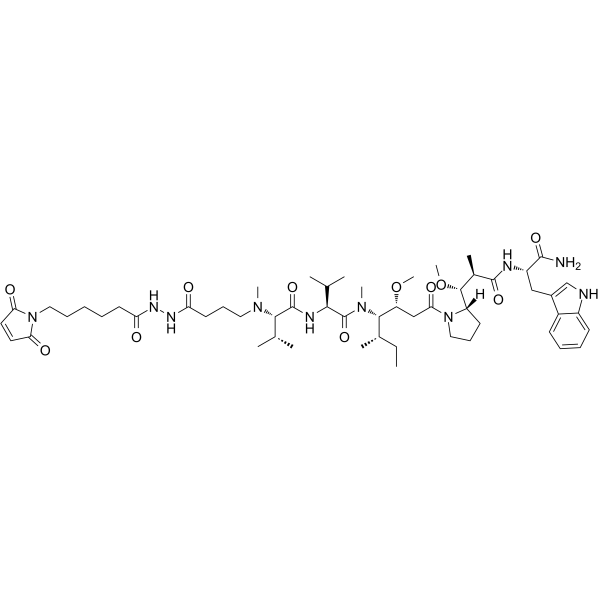
- HY-149352
-
|
|
Thymidylate Synthase
|
Cancer
|
|
DG1 (Compound 8Nc) is a Thymidylate Synthase (TS) inhibitor that affects cancer angiogenesis and metabolic reprogramming in NSCLC cells. DG1 can effectively inhibit the expression of CD26, ET-1, FGF-1 and EGF. DG1 also effectively inhibits the proliferation of cancer tissue in the A549 xenograft mouse model .
|
-
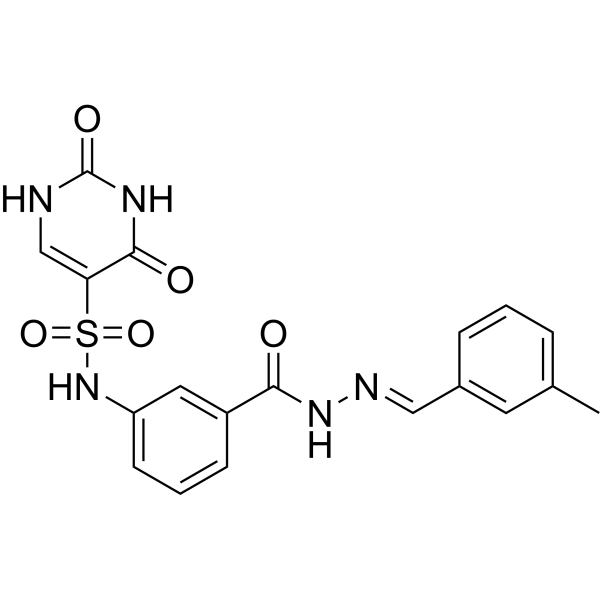
- HY-137295
-
|
|
PKC
Apoptosis
|
Inflammation/Immunology
|
|
Ingenol 3,20-dibenzoate is a potent protein kinase C (PKC) isoform-selective agonist. Ingenol 3,20-dibenzoate induces selective translocation of nPKC-delta, -epsilon, and -theta and PKC-mu from the cytosolic fraction to the particulate fraction and induces morphologically typical apoptosis through de novo synthesis of macromolecules. Ingenol 3,20-dibenzoate increases the IFN-γ production and degranulation by NK cells, especially when NK cells are stimulated by NSCLC cells .
|
-
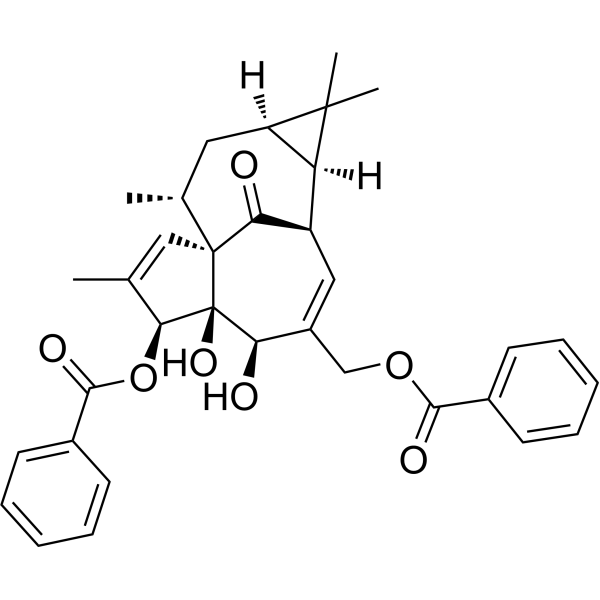
- HY-163417
-
|
|
EGFR
|
Cancer
|
|
HER2-IN-15 (Compound 1) is an inhibitor for HER2, which inhibits the Her YVMA exon 20 insertion mutation (HER2 YVMA) with an IC50 <200 nM. HER2-IN-15 inhibits proliferation of HER2 YVMA mutated BaF3 cells with an IC50 <200 nM and amliorates non-small-cell lung cancer (NSCLC) .
|
-
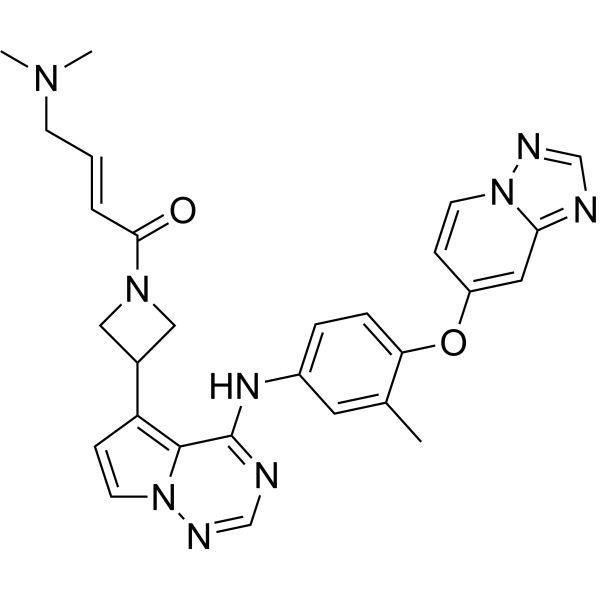
- HY-163418
-
|
|
EGFR
|
Cancer
|
|
HER2-IN-17 (Compound 2) is an inhibitor for HER2, which inhibits the Her YVMA exon 20 insertion mutation (HER2 YVMA) with an IC50 <200 nM. HER2-IN-17 inhibits proliferation of HER2 YVMA mutated BaF3 cells with an IC50 <200 nM and amliorates non-small-cell lung cancer (NSCLC) .
|
-
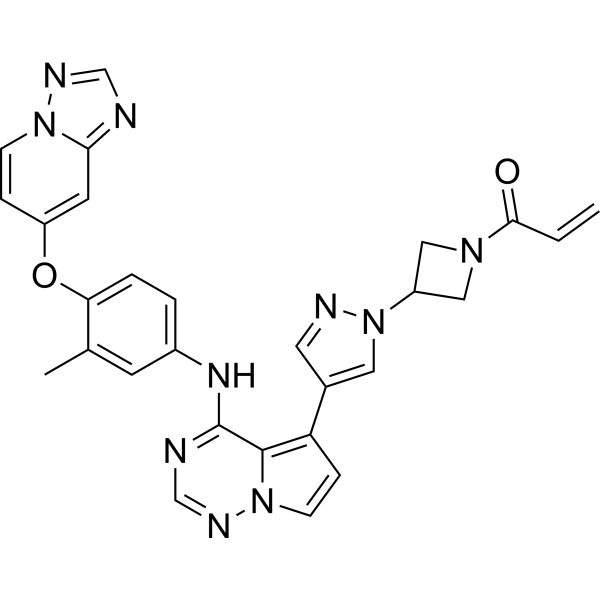
- HY-163420
-
|
|
EGFR
|
Cancer
|
|
HER2-IN-16 (Compound 14) is an inhibitor for HER2, which inhibits the Her YVMA exon 20 insertion mutation (HER2 YVMA) with an IC50 <200 nM. HER2-IN-16 inhibits proliferation of HER2 YVMA mutated BaF3 cells with an IC50 <200 nM and amliorates non-small-cell lung cancer (NSCLC) .
|
-
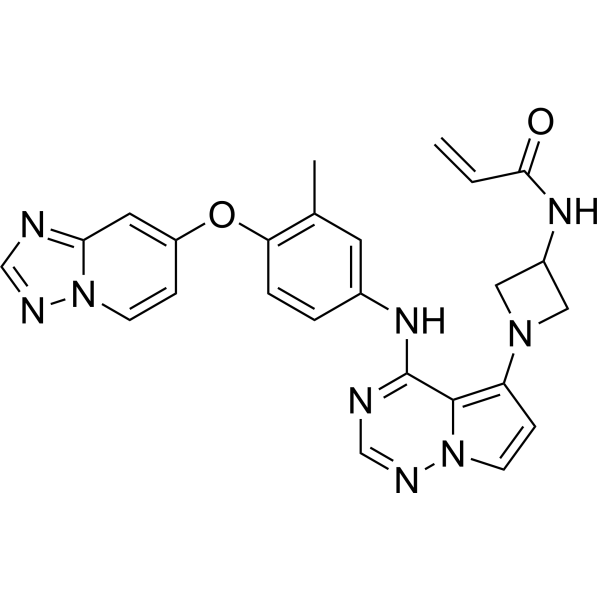
- HY-13299
-
MK-8033
2 Publications Verification
|
c-Met/HGFR
|
Cancer
|
|
MK-8033 is an orally active ATP competitive c-Met/Ron dual inhibitor (IC50s: 1 nM (c-Met),7 nM (Ron)), with preferential binding to the activated kinase conformation. MK-8033 can be used in the research of cancers, such as breast and bladder cancers, non-small cell lung cancers (NSCLCs) .
|
-
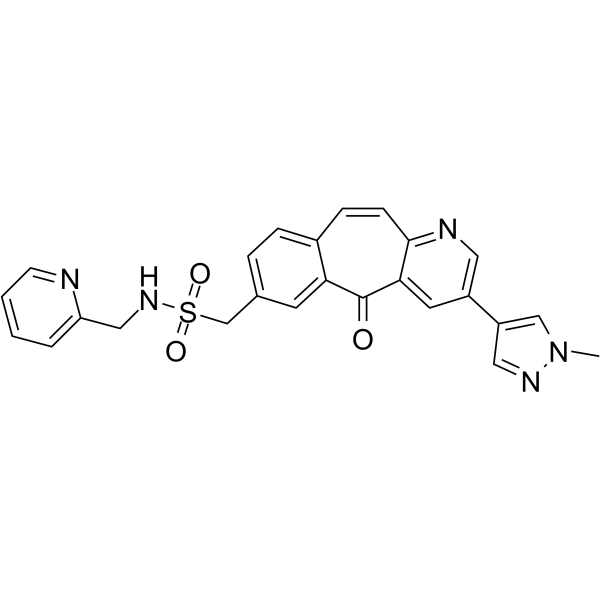
- HY-13299A
-
|
|
c-Met/HGFR
|
Cancer
|
|
MK-8033 hydrochloride is an orally active ATP competitive c-Met/Ron dual inhibitor (IC50s: 1 nM (c-Met),7 nM (Ron)), with preferential binding to the activated kinase conformation. MK-8033 hydrochloride can be used in the research of cancers, such as breast and bladder cancers, non-small cell lung cancers (NSCLCs) .
|
-
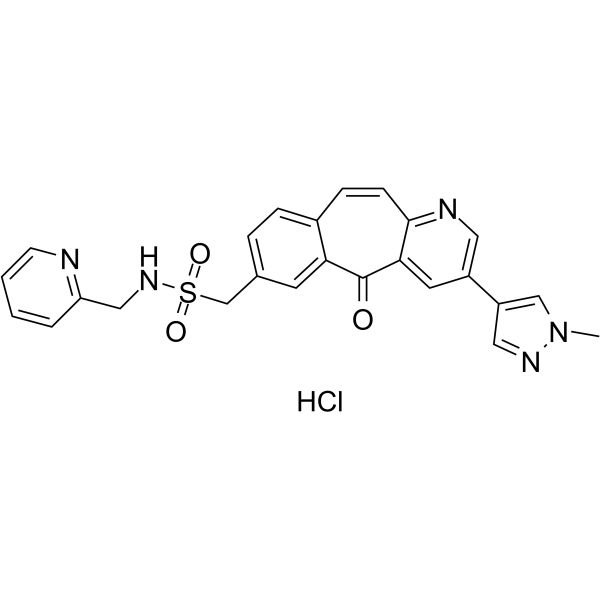
- HY-119694
-
|
|
Others
|
Cancer
|
|
Rotenolone is an antiproliferative agent. Rotenolone shows antiproliferative activity against the ovarian cancer A2780, breast cancer BT-549, prostate cancer DU 145, NSCLC NCI-H460, and colon cancer HCC-2998 cell lines, with IC50s of 0.95, 1.6, 2.7, 2.0, and 2.9 μM, respectively .
|
-
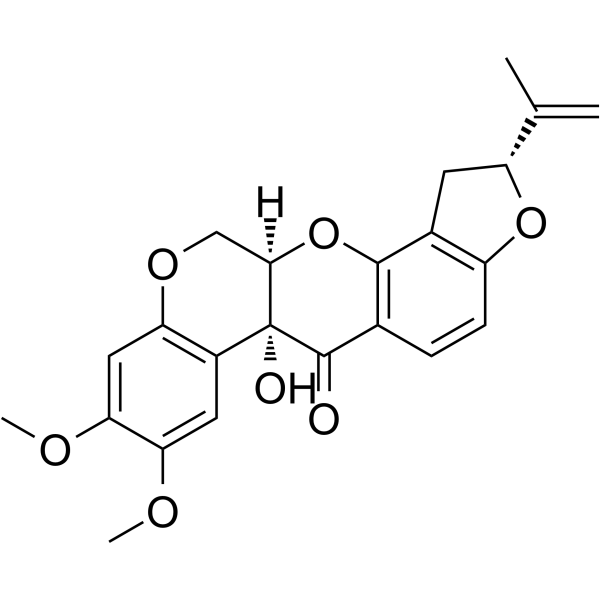
- HY-19939S
-
VX-984
4 Publications Verification
M9831
|
DNA-PK
|
Cancer
|
|
VX-984 is an orally active, potent, selective and BBB-penetrated DNA-PK inhibitor. VX-984 efficiently inhibits NHEJ (non-homologous end joining) and increases DSBs (DNA double-strand breaks). VX-984 can be used for glioblastomas (GBM) and non-small cell lung cancer (NSCLC) research. VX-984 is a de novo deuterium .
|
-
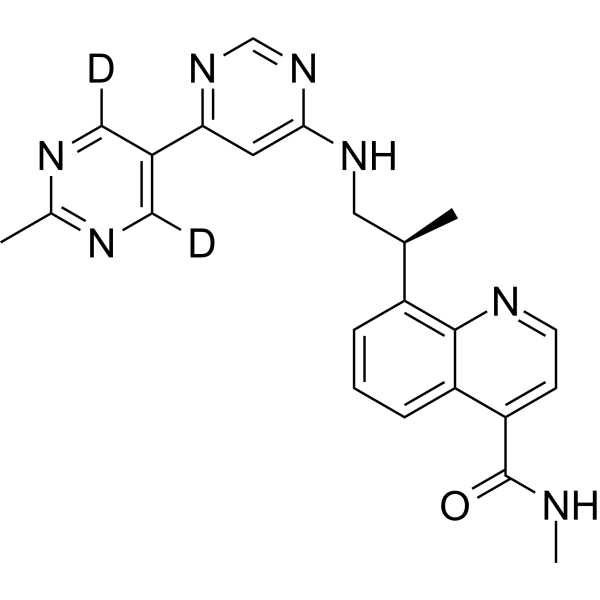
- HY-151606
-
|
|
Akt
|
Cancer
|
|
Akt3 degrader 1 (compound 12l) is a selective Akt3 degrader that overcomes Osimertinib (HY-15772)-induced resistance in H1975OR NSCLC cells. Akt3 degrader 1 also has anti-proliferative activity and significantly inhibits tumour growth in mice. Akt3 degrader 1 can be used in the study of drug-resistant non-small cell lung cancer .
|
-
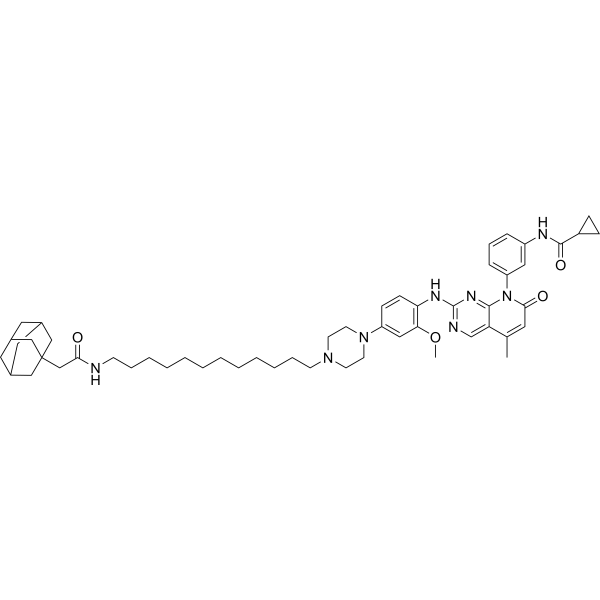
- HY-147259
-
|
|
c-Met/HGFR
|
Cancer
|
|
Dalmelitinib is an orally active selective c-Met kinase inhibitor (IC50: 2.9 nM) that binds to the ATP-binding region of c-Met. Dalmelitinib induces the phosphorylation of MET, partially or completely inhibits the phosphorylation of AKT and ERK. Dalmelitinib potently inhibits cancer cell (c-Met oncogene amplification) proliferation, and is used for the research of cancers like human non-small cell lung cancer (NSCLC) .
|
-
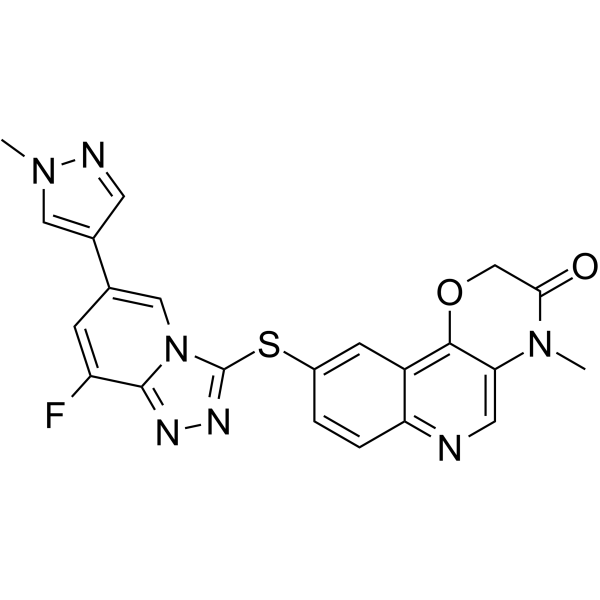
- HY-110088
-
|
|
MDM-2/p53
|
Cancer
|
|
SCH529074 is a potent and orally active p53 activator. SCH529074 binds specifically and conformation-dependently to p53 DBD ( DNA binding domain) with a Ki of 1-2 μM in a saturable manner. SCH529074 restores mutant p53 function and interrupts HDM2-mediated ubiquitination of wild Type p53. SCH529074 can be used for the study of non-small-cell lung carcinoma (NSCLC) .
|
-
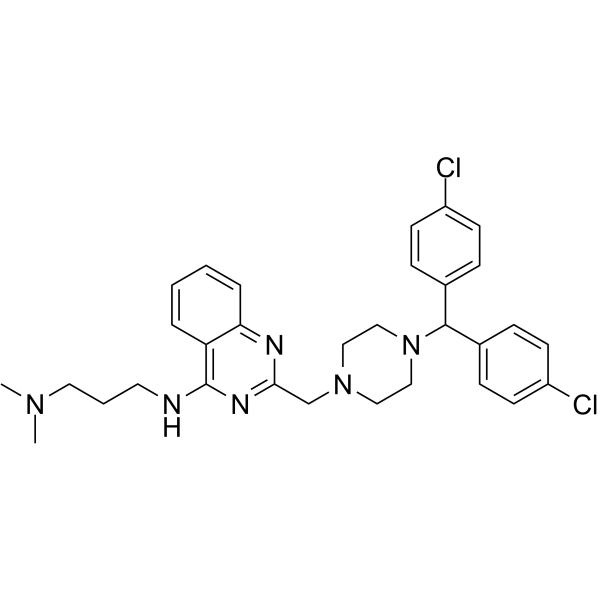
- HY-153356
-
|
|
Apoptosis
|
Cancer
|
|
MRT-2359 is a potent, orally active and selective GSPT1 depressant (IC50: >30 nM and <300 nM) that specifically induces apoptosis dependent on protein translation. MRT-2359 exhibits significant and preferred anti-proliferative activity in a variety of cancer cell lines, especially MYC-driven cell lines, such as non-small cell lung cancer (NSCLC) and small cell lung cancer (SCLC) with high expression of N-Myc or L-Myc. MRT-2359 inhibits the growth of drug-resistant NSCLC and SCLC cells, making it suitable for cancer research .
|
-
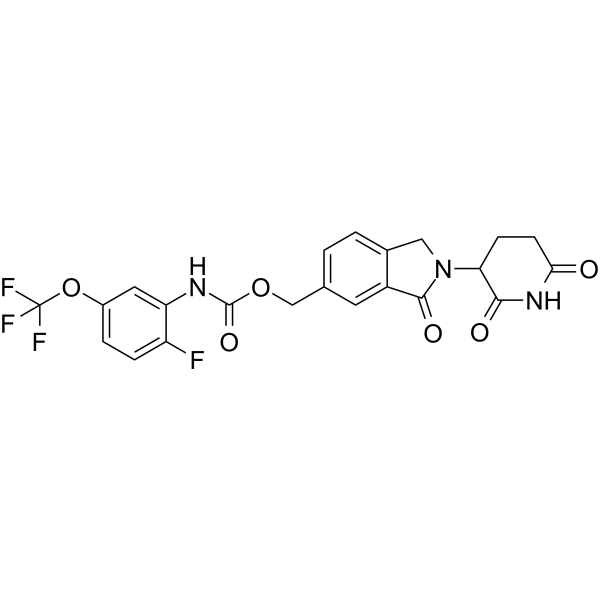
- HY-N8321
-
|
|
Others
|
Cancer
|
|
5-O-Caffeoylshikimic acid can be used in the study for NSCLC .
|
-
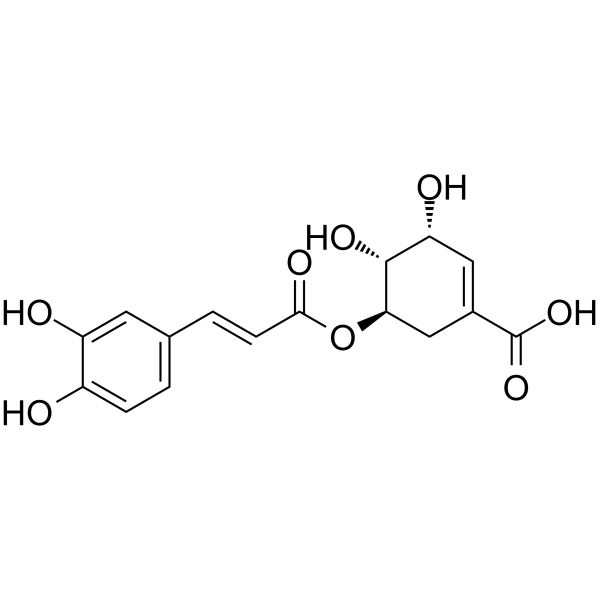
- HY-116749
-
|
BBSKE
|
TrxR
|
Cancer
|
|
Ethaselen (BBSKE) is an orally active, selective thioredoxin reductase (TrxR) inhibitor with IC50s of 0.5 and 0.35 μM for the wild-type human TrxR1 and rat TrxR1, respectively. Ethaselen specifically binds to the unique selenocysteine-cysteine redox pair in the C-terminal active site of mammalian TrxR1. Ethaselen, an organoselenium compound, is a potent antitumor candidate that exerts potent inhibition on non-small cell lung cancer (NSCLC) by targeting TrxR .
|
-
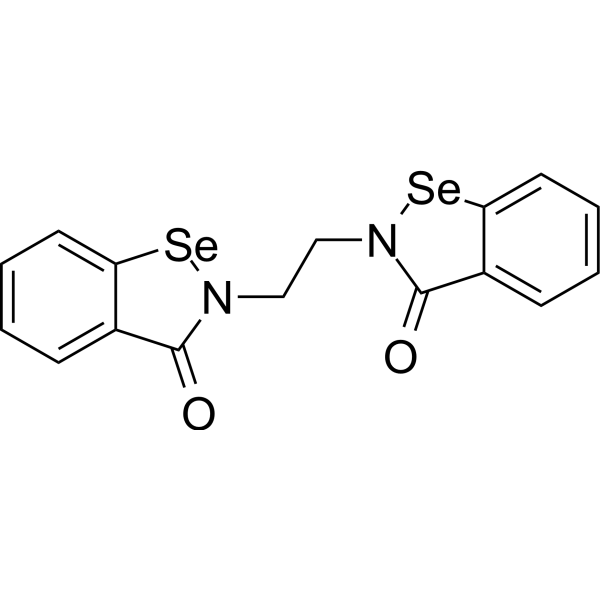
- HY-150610
-
|
|
EGFR
|
Cancer
|
|
EGFR-IN-69 (compound 17g) is a potent EGFR inhibitor, with IC50 values of 4.3, 6.6 and 25.6 nM against EGFR L858R/T790M/C797S, EGFR L858R/T790M, and EGFR 19del/T790M/C797S, respectively. EGFR-IN-69 can be used for non-small-cell-lung-cancer (NSCLC) research .
|
-
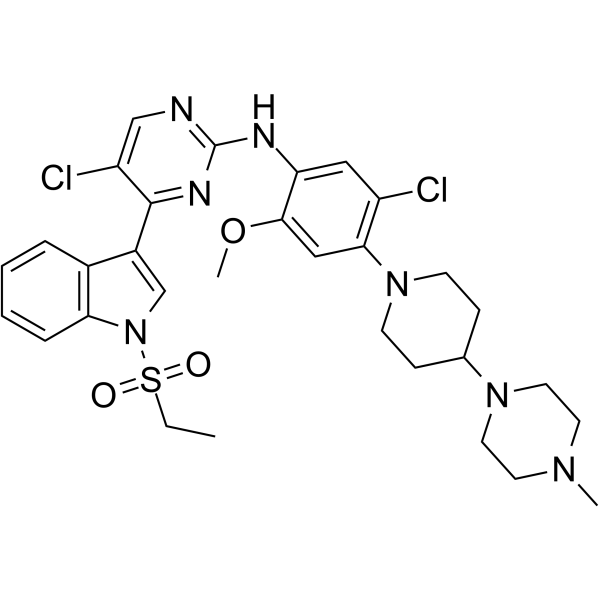
- HY-144056
-
|
|
EGFR
|
Cancer
|
|
EGFR-IN-39 is a potent inhibitor of EGFR. EGFR-IN-39 is an anti-tumor agent with low toxic side effects. EGFR-IN-39 is an acrylamide derivative compound. Overexpression and mutation of the epidermal growth factor receptor (EGFR) has been clearly demonstrated to lead to uncontrollable cell growth and is associated with the progression of most cancer diseases, especially NSCLC. EGFR-IN-39 has the potential for the research of diseases associated with EGFR mutations (extracted from patent WO2021185348A1, compound 2) .
|
-
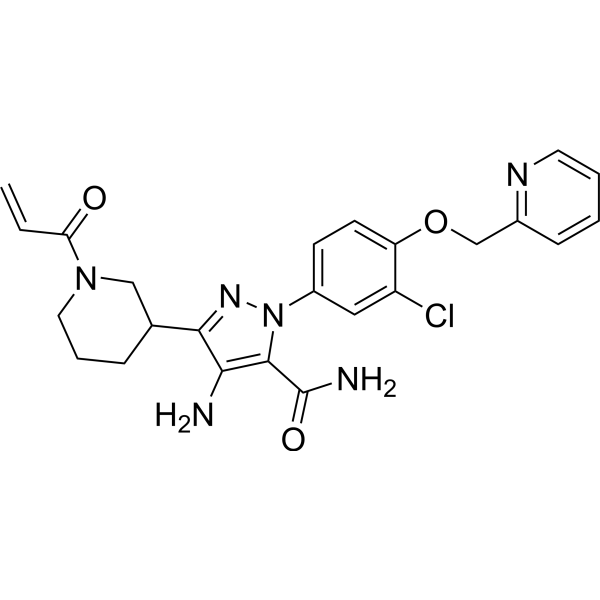
- HY-144055
-
|
|
EGFR
|
Cancer
|
|
EGFR-IN-38 is a potent inhibitor of EGFR. EGFR-IN-38 is an anti-tumor agent with low toxic side effects. EGFR-IN-33 is an acrylamide derivative compound. Overexpression and mutation of the epidermal growth factor receptor (EGFR) has been clearly demonstrated to lead to uncontrollable cell growth and is associated with the progression of most cancer diseases, especially NSCLC. EGFR-IN-38 has the potential for the research of diseases associated with EGFR mutations (extracted from patent WO2021185348A1, compound 4) .
|
-
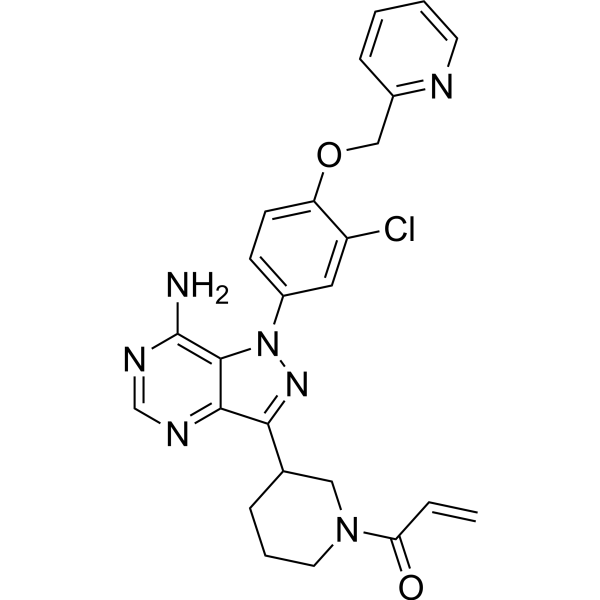
- HY-144054
-
|
|
EGFR
|
Cancer
|
|
EGFR-IN-37 is a potent inhibitor of EGFR. EGFR-IN-37 is an anti-tumor agent with low toxic side effects. EGFR-IN-39 is an acrylamide derivative compound. Overexpression and mutation of the epidermal growth factor receptor (EGFR) has been clearly demonstrated to lead to uncontrollable cell growth and is associated with the progression of most cancer diseases, especially NSCLC. EGFR-IN-37 has the potential for the research of diseases associated with EGFR mutations (extracted from patent WO2021185348A1, compound 7) .
|
-
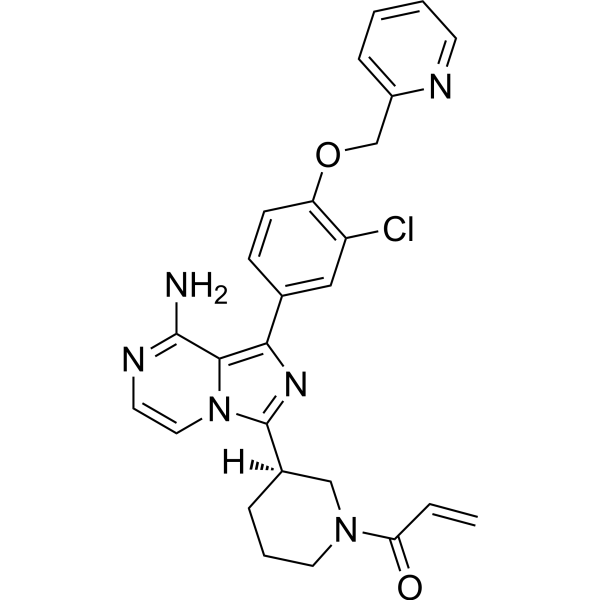
- HY-144052
-
|
|
EGFR
|
Cancer
|
|
EGFR-IN-35 is a potent inhibitor of EGFR. EGFR-IN-35 is an anti-tumor agent with low toxic side effects. EGFR-IN-35 is an acrylamide derivative compound. Overexpression and mutation of the epidermal growth factor receptor (EGFR) has been clearly demonstrated to lead to uncontrollable cell growth and is associated with the progression of most cancer diseases, especially NSCLC. EGFR-IN-35 has the potential for the research of diseases associated with EGFR mutations (extracted from patent WO2021185348A1, compound 11) .
|
-
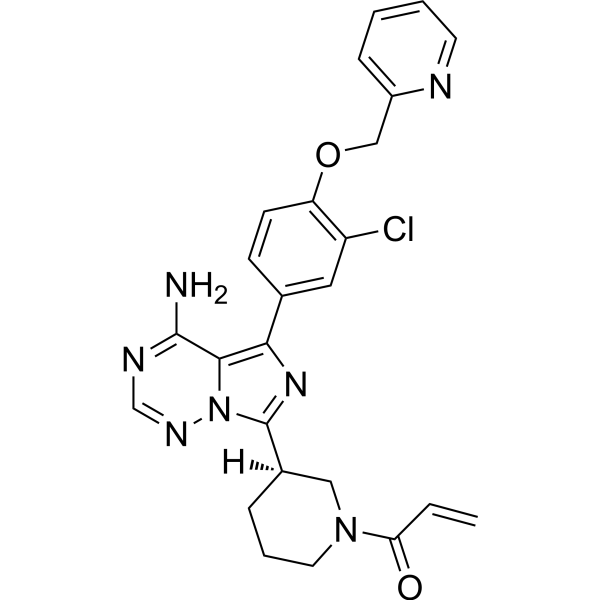
- HY-144051
-
|
|
EGFR
|
Cancer
|
|
EGFR-IN-34 is a potent inhibitor of EGFR. EGFR-IN-34 is an anti-tumor agent with low toxic side effects. EGFR-IN-35 is an acrylamide derivative compound. Overexpression and mutation of the epidermal growth factor receptor (EGFR) has been clearly demonstrated to lead to uncontrollable cell growth and is associated with the progression of most cancer diseases, especially NSCLC. EGFR-IN-34 has the potential for the research of diseases associated with EGFR mutations (extracted from patent WO2021185348A1, compound 12) .
|
-
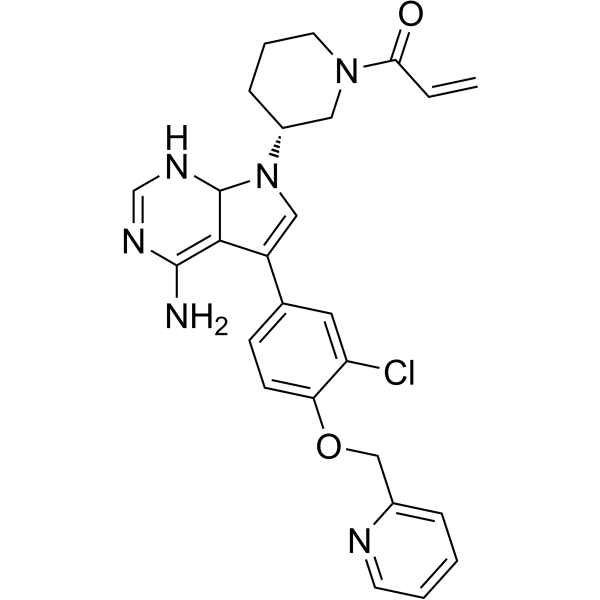
- HY-144050
-
|
|
EGFR
|
Cancer
|
|
EGFR-IN-33 is a potent inhibitor of EGFR. EGFR-IN-33 is an anti-tumor agent with low toxic side effects. EGFR-IN-33 is an acrylamide derivative compound. Overexpression and mutation of the epidermal growth factor receptor (EGFR) has been clearly demonstrated to lead to uncontrollable cell growth and is associated with the progression of most cancer diseases, especially NSCLC. EGFR-IN-33 has the potential for the research of diseases associated with EGFR mutations (extracted from patent WO2021185348A1, compound 13) .
|
-
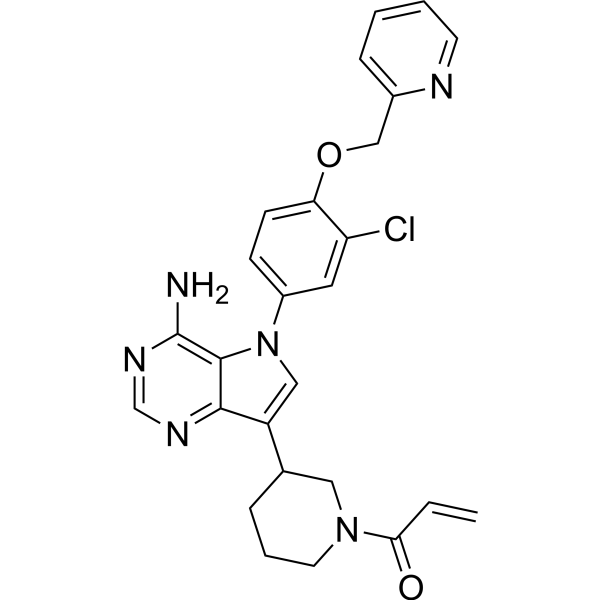
- HY-12972
-
|
PF-06747775
|
EGFR
|
Cancer
|
|
Mavelertinib is a selective, orally available and irreversible EGFR tyrosine kinase inhibitor (EGFR TKI), with IC50s of 5, 4, 12 and 3 nM for Del, L858R, and double mutants T790M/L858R and T790M/Del, respectively. Mavelertinib can be used for the research of non-small-cell lung cancer (NSCLC) .
|
-
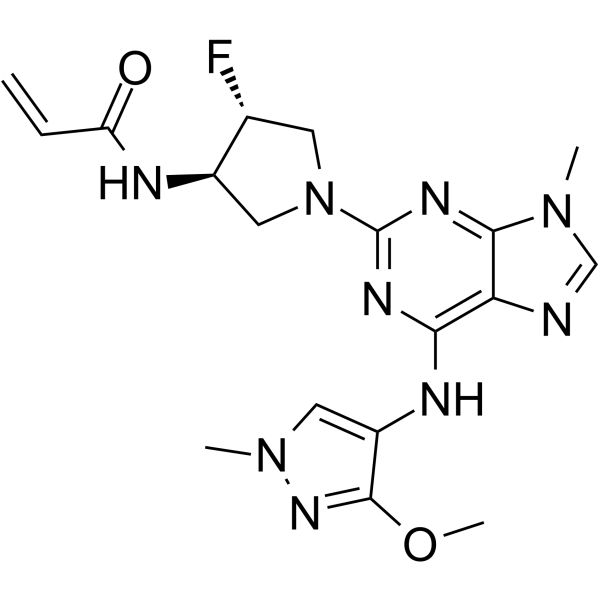
- HY-W004206
-
|
4-Methoxyphenylacetic acid
|
Endogenous Metabolite
|
Cancer
|
|
2-(4-Methoxyphenyl)acetic acid is a plasma metabolite, with high sensitivity and specificity value as a biomarker for discriminating between NSCLC and healthy controls.
|
-
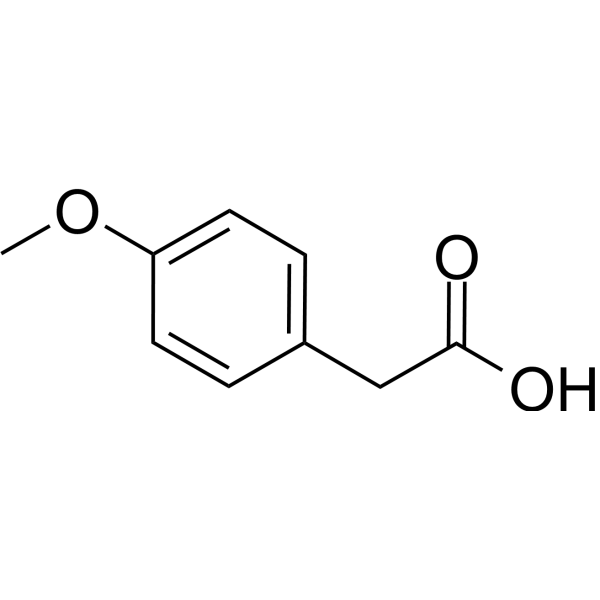
- HY-19637
-
|
|
Topoisomerase
|
Cancer
|
|
SW044248 is a non-canonical topoisomerase I inhibitor, and selectively toxic for certain non-small cell lung cancer (NSCLC) cell lines.
|
-
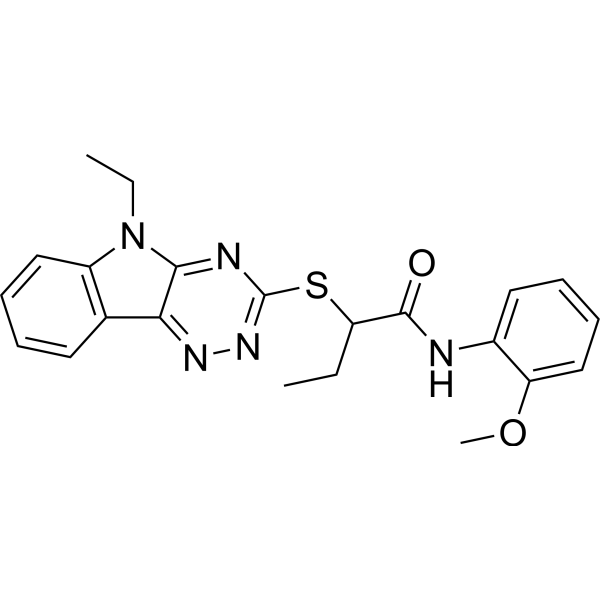
- HY-121537
-
|
|
COX
Akt
Apoptosis
|
Neurological Disease
Inflammation/Immunology
Cancer
|
|
CAY10404 is a potent and selective cyclooxygenase-2 (COX-2) inhibitor with an IC50 of 1 nM and a selectivity index (SI; COX-1 IC50/COX-2 IC50) of >500000. CAY10404 is a potent PKB/Akt and MAPK signaling pathways inhibitor and induces apoptosis in non-small cell lung cancer (NSCLC) cells. CAY10404, a diarylisoxazole, has good analgesic, anti-inflammatory, and anti-cancer activities .
|
-
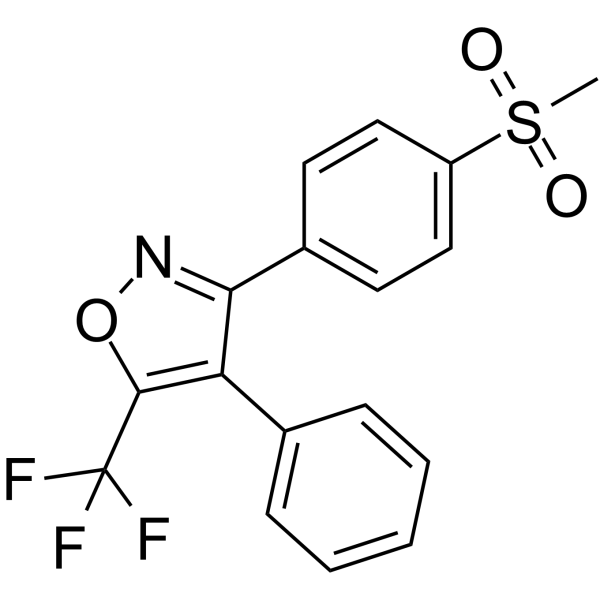
- HY-N2104
-
|
|
Others
|
Cancer
|
|
Daurinoline is an alkaloid that can be isolated from the roots of Menispermum dauricum. Daurinoline may be a potential anti-tumor agent or chemosensitizer for chemo-resistant NSCLC research .
|
-
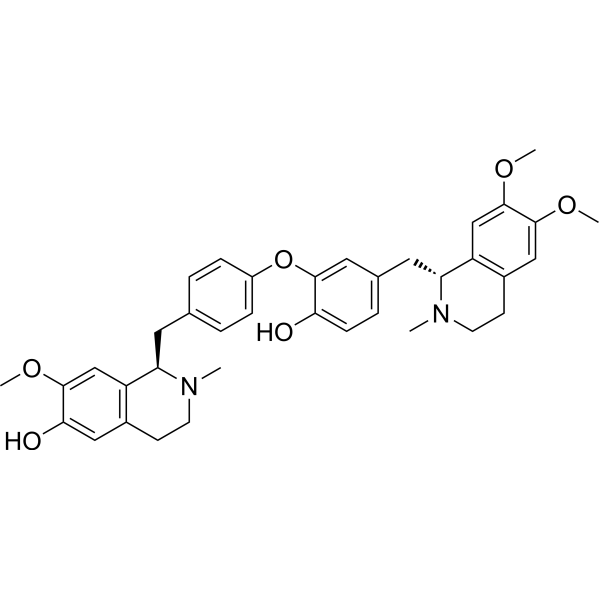
- HY-139534A
-
|
|
Others
|
Others
|
|
(S)-ARI-1 is an S-enantiomer of ARI-1. ARI-1 is a ROR1 inhibitor and apoptosis inducer, used in NSCLC research .
|
-
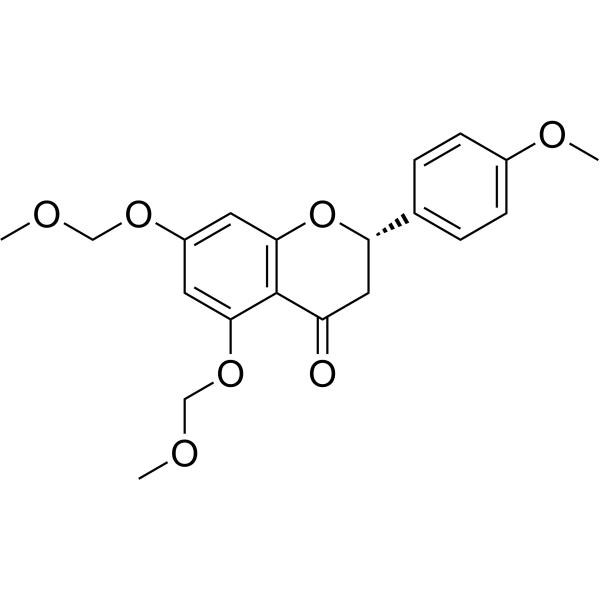
- HY-114315
-
|
|
Others
|
Cancer
|
|
NQO1 substrate acts as an efficient NQO1 substrate and may be a new option for the treatment of NQO1-overexpresssing drug-resistant NSCLC .
|
-
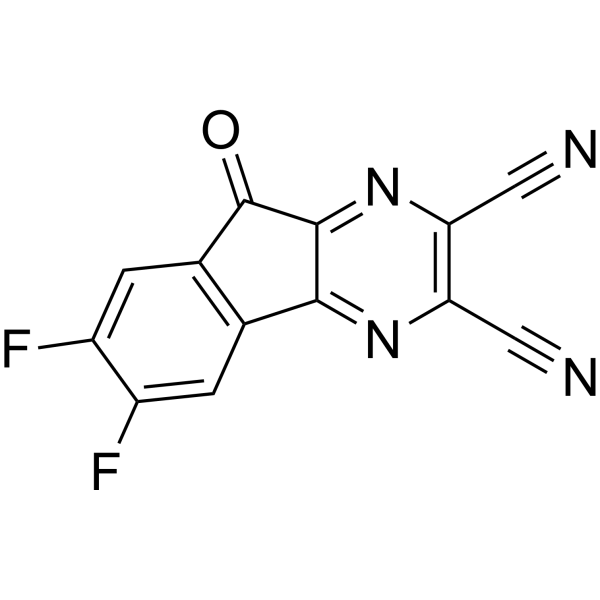
- HY-P9971
-
|
SHR-1210
|
PD-1/PD-L1
|
Cancer
|
|
Camrelizumab (SHR-1210) is a potent humanied high-affinity IgG4-κ monoclonal antibody (mAb) to PD-1. Camrelizumab binds PD-1 at a high affinity of 3 nM and inhibits the binding interaction of PD-1 and PD-L1 with an IC50 of 0.70 nM. Camrelizumab acts as anti-PD-1/PD-L1 agent and can be used for cancer research, including NSCLC, ESCC, Hodgkin lymphoma, and advanced HCC et,al .
|
-

- HY-10261
-
|
BIBW 2992
|
EGFR
Autophagy
Apoptosis
c-Met/HGFR
Akt
p38 MAPK
|
Cancer
|
|
Afatinib (BIBW 2992) is an orally active, potent and irreversible dual specificity inhibitor of ErbB family (EGFR and HER2), with IC50 values of 0.5 nM, 0.4 nM, 10 nM and 14 nM for EGFR wt, EGFR L858R, EGFR L858R/T790M and HER2, respectively. Afatinib can be used for the research of esophageal squamous cell carcinoma (ESCC), non-small cell lung cancer (NSCLC) and gastric cancer .
|
-
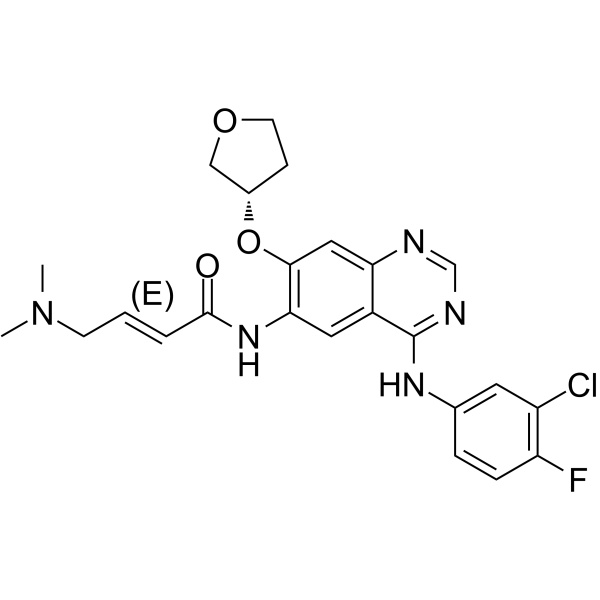
- HY-10261A
-
|
BIBW 2992MA2
|
EGFR
Autophagy
Apoptosis
c-Met/HGFR
Akt
p38 MAPK
|
Cancer
|
|
Afatinib (BIBW 2992) dimaleate is an orally active, potent and irreversible dual specificity inhibitor of ErbB family (EGFR and HER2), with IC50 values of 0.5 nM, 0.4 nM, 10 nM and 14 nM for EGFR wt, EGFR L858R, EGFR L858R/T790M and HER2, respectively. Afatinib dimaleate can be used for the research of esophageal squamous cell carcinoma (ESCC), non-small cell lung cancer (NSCLC) and gastric cancer .
|
-
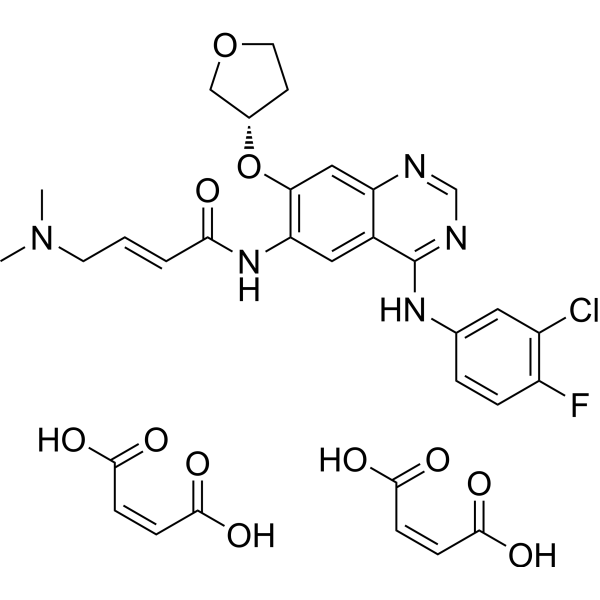
- HY-10261D
-
|
BIBW 2992 oxalate
|
EGFR
Autophagy
Apoptosis
c-Met/HGFR
Akt
|
Cancer
|
|
Afatinib (BIBW 2992) oxalate is an orally active, potent and irreversible dual specificity inhibitor of ErbB family (EGFR and HER2), with IC50 values of 0.5 nM, 0.4 nM, 10 nM and 14 nM for EGFR wt, EGFR L858R, EGFR L858R/T790M and HER2, respectively. Afatinib oxalate can be used for the research of esophageal squamous cell carcinoma (ESCC), non-small cell lung cancer (NSCLC) and gastric cancer .
|
-
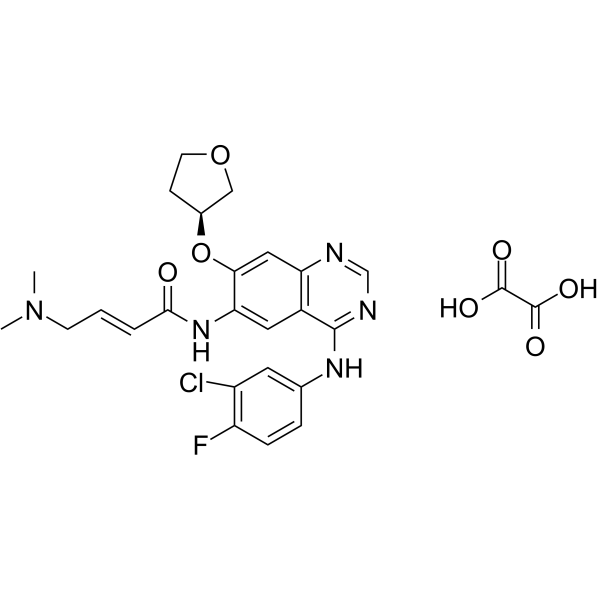
- HY-126320
-
|
|
EGFR
c-Met/HGFR
|
Cancer
|
|
EGFR-IN-8 is a dual EGFR and c-Met inhibitor, compound 48. EGFR-IN-8 can be a promising candidate for further development to target EGFR TKI-resistant NSCLC .
|
-
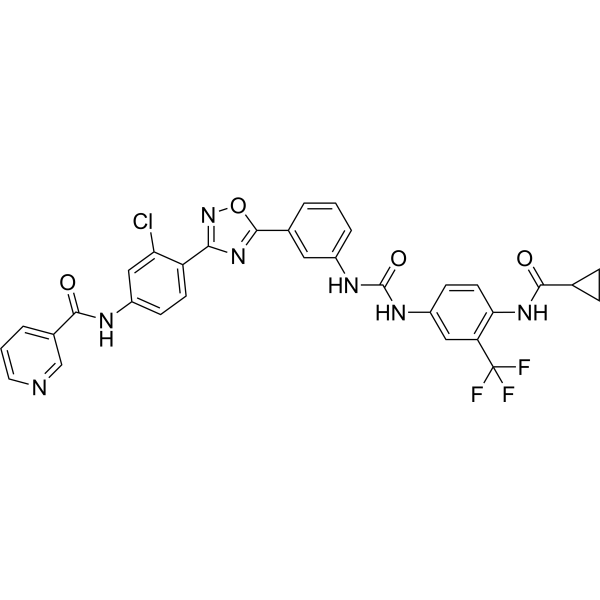
- HY-147858
-
|
|
PROTACs
EGFR
Apoptosis
|
Cancer
|
|
PROTAC EGFR degrader 7 (compound 13b) is a potent and selective CRBN-recruiting PROTAC EGFR L858R/T790M degrader, with a DC50 of 13.2 nM. PROTAC EGFR degrader 7 inhibits NCI–H1975 cells proliferation, with an IC50 of 46.82 nM. PROTAC EGFR degrader 7 significantly induces apoptosis and G2/M phase arrest in NCI–H1975 cell. PROTAC EGFR degrader 7 shows antitumor activity, and can be used for non-small cell lung cancer (NSCLC) research . PROTAC EGFR degrader 7 is a click chemistry reagent, it contains an Alkyne group and can undergo copper-catalyzed azide-alkyne cycloaddition (CuAAc) with molecules containing Azide groups.
|
-
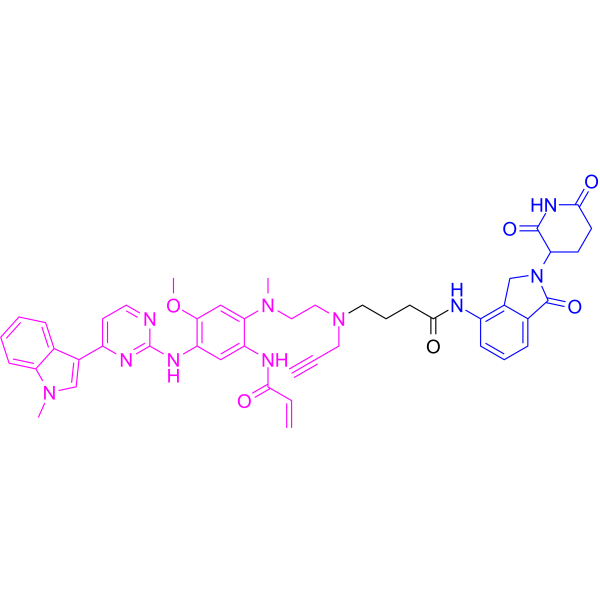
- HY-19730
-
|
HM61713, BI 1482694
|
EGFR
|
Cancer
|
|
Olmutinib (HM61713; BI-1482694) is an orally active and irreversible third EGFR tyrosine kinase inhibitor that binds to a cysteine residue near the kinase domain. Olmutinib is used for NSCLC .
|
-
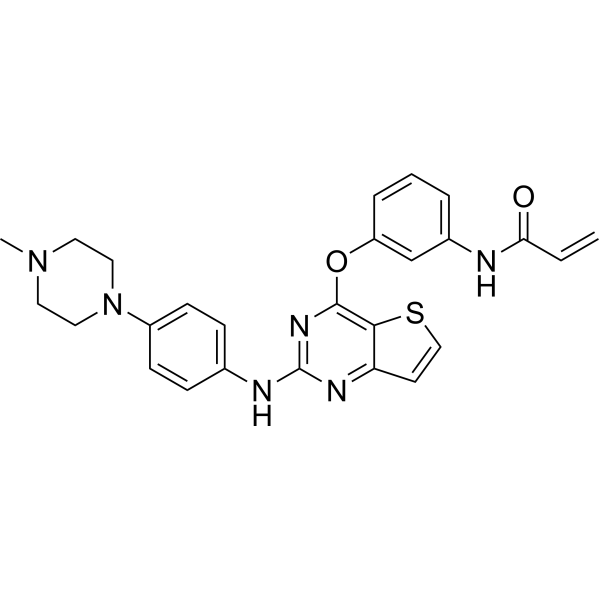
- HY-147802
-
|
|
EGFR
Apoptosis
|
Cancer
|
|
EGFR-IN-59 (Compound 8c) is a EGFR inhibitor (IC50=190 nM) and apoptosis inducer. EGFR-IN-59 exhibits cytotoxicity against non-small lung cancer cell lines (A549) and normal lung fibroblasts (WI38) with IC50s of 8.62 and 52.6 µM, respectively. EGFR-IN-59 can be used for the research of various cancers such as non-small cell lung cancer (NSCLC), head and neck cancer, breast cancer and colorectal cancer .
|
-
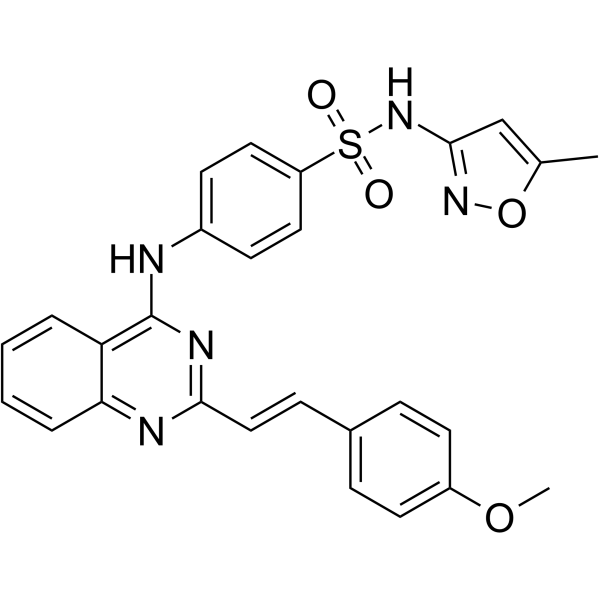
- HY-155358
-
|
|
EGFR
Apoptosis
|
Cancer
|
|
Os30, a potent fourth-generation EGFR inhibitor, is a potent EGFRC797S-TK inhibitor with IC50 values of 18 nM and 113 nM for EGFRDel19/T790M/C797S TK and EGFRL858R/T790M/C797S TK, respectively. Os30 can suppress EGFR phosphorylation, arrest at G1 phase and induce the apoptosis of KC-0116 (BaF3-EGFRDel19/T790M/C797S) cells. Os30 shows potent antitumor efficacy on non-small cell lung cancer (NSCLC) with EGFmRC797S mutation .
|
-
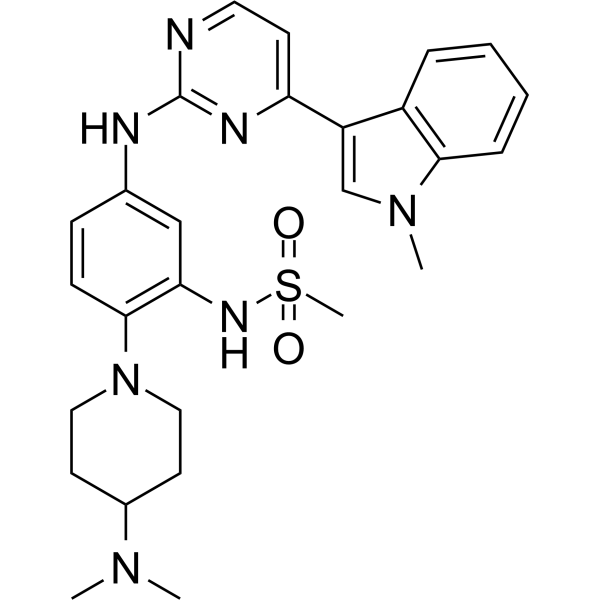
- HY-146325
-
|
|
HSP
|
Cancer
|
|
HSP90-IN-11 (Compound 12c) is a potent inhibitor of HSP90. HSP90-IN-11 displays potent HSP90α inhibition comparable to AUY-922 (Luminespib). HSP90-IN-11 shows significant antiproliferative activity in CRC and NSCLC cells in a double digit nM range. HSP90-IN-11 leads to rapid degradation of client proteins EGFR and Akt in NSCLC cells. HSP90-IN-11 induces significant accumulation of a sub-G1 phase population .
|
-
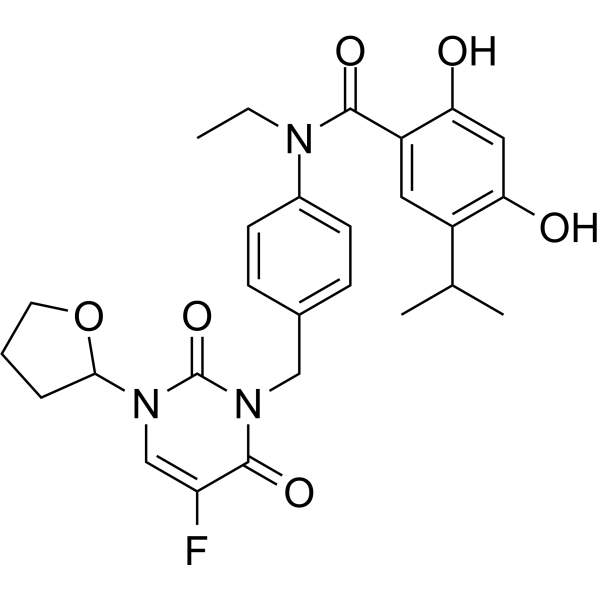
- HY-161031
-
|
|
EGFR
|
Cancer
|
|
EGFR-IN-93 (compound 18) is an allosteric inhibitor of T790M/L858R double mutant EGFR. EGFR-IN-93 can be used for non-small lung cancer (NSCLC) research .
|
-
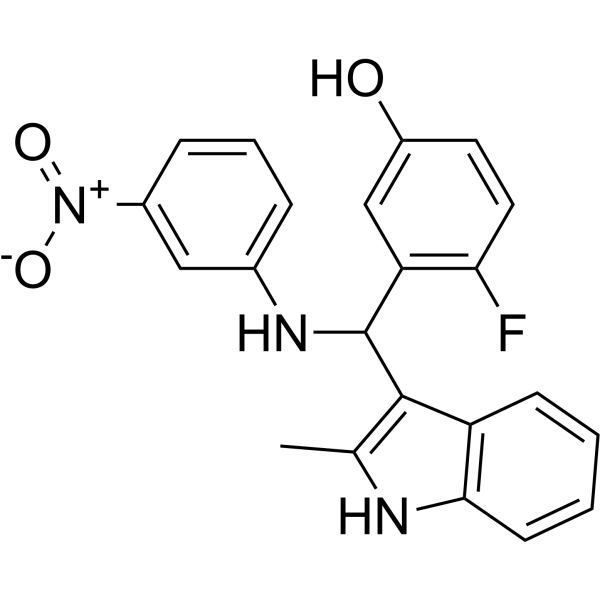
- HY-103443
-
|
|
EGFR
|
Cancer
|
|
HKI-357 is an irreversible dual inhibitor of EGFR and ERBB2 with IC50s of 34 nM and 33 nM, respectively. HKI-357 suppresses EGFR autophosphorylation (at Y1068), and AKT and MAPK phosphorylation .
|
-
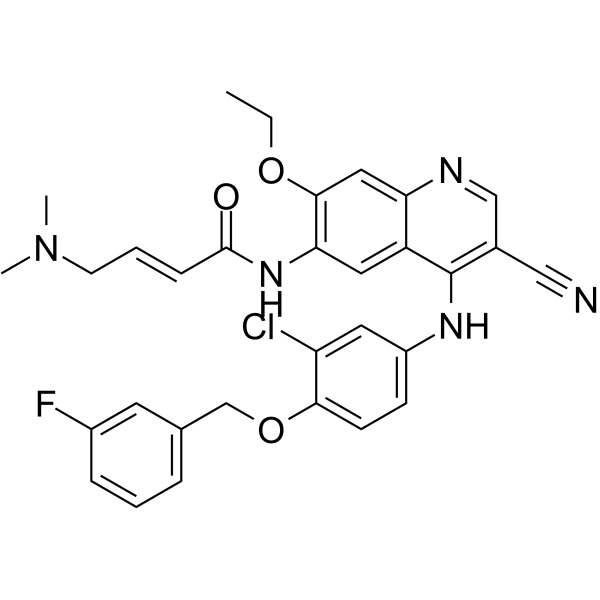
- HY-N4139
-
|
|
Others
|
Cancer
|
|
Protohypericin is a naturally occurring naphthodianthrone derived from plant Hypericum perforatum. Radioiodinated protohypericin is used in Tumor necrosis targeted radiotherapy .
|
-
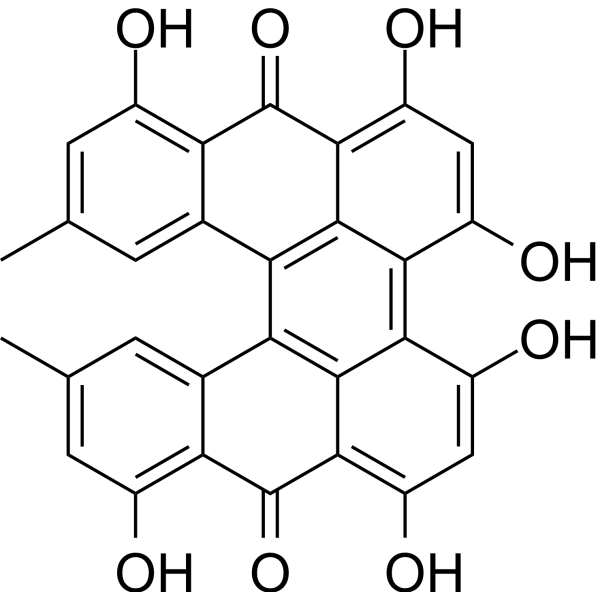
- HY-126251
-
|
|
CDK
Apoptosis
|
Cancer
|
|
CDK9-IN-7 (compound 21e) is a selective, highly potent, and orally active CDK9/cyclin T inhibitor (IC50=11 nM), which exhibits more potent over other CDKs (CDK4/cyclinD=148 nM; CDK6/cyclinD=145 nM). CDK9-IN-7 shows antitumor activity without obvious toxicity. CDK9-IN-7 induces NSCLC cell apoptosis, arrests the cell cycle in the G2 phase, and suppresses the stemness properties of NSCLC .
|
-
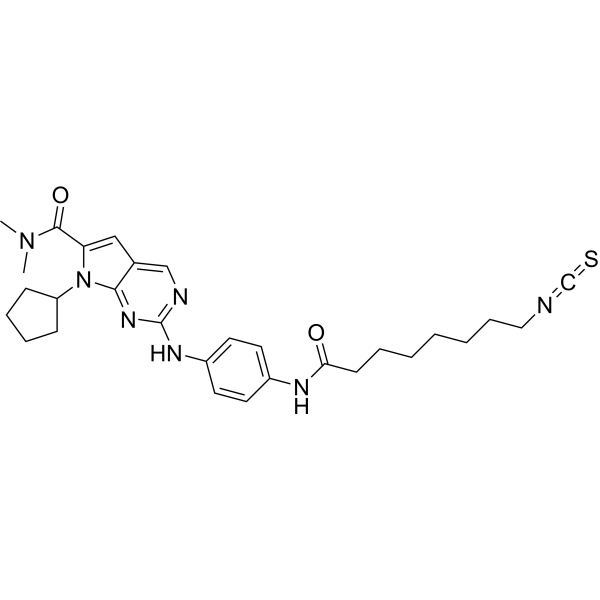
- HY-119182
-
|
NSC 300288
|
DNA/RNA Synthesis
|
Cancer
|
|
Mitonafide (NSC 300288) is a cytostatic agent. Mitonafide binds to double-stranded DNA through intercalation, and inhibits DNA and RNA synthesis. Mitonafide is an antitumor agent that can be used in the research of cancers, such as non-small cell lung cancer (NSCLC), leukemia .
|
-
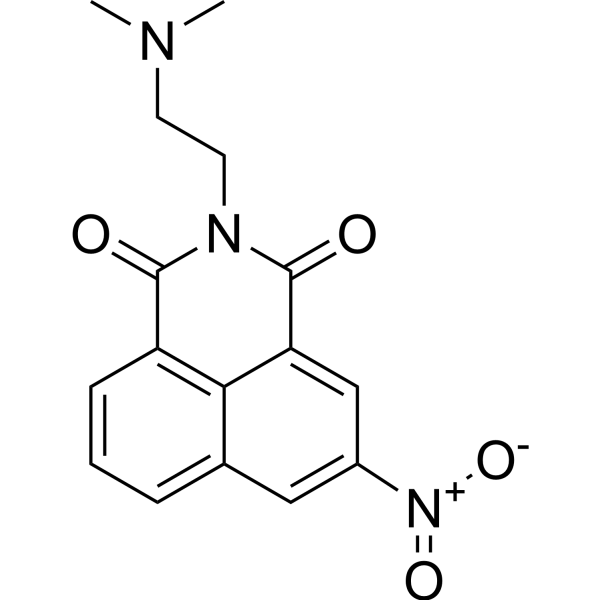
- HY-117366
-
|
|
PKC
|
Cancer
|
|
PS432 is a PKC inhibitor with IC50s of 16.9 μM (PKCι) and 18.5 μM (PKCζ), respectively. PS432 effectively inhibits the proliferation of non-small cell lung cancer cells (NSCLCs) and tumor growth in mouse xenograft models .
|
-
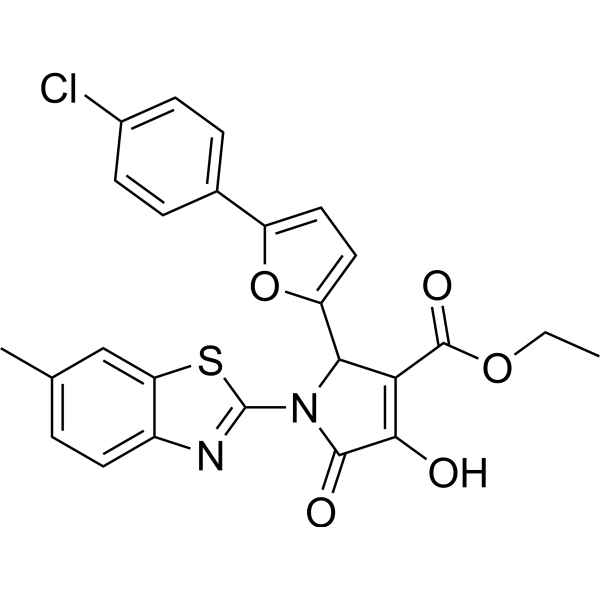
- HY-77493
-
|
(rel)-ARQ 197; (rel)-(3R,4R)-ARQ 198
|
Others
|
Cancer
|
|
(rel)-Tivantinib is a potent and highly selective inhibitor of the receptor tyrosine kinase c-MET. (rel)-Tivantinib has two novel targets, GSK3α and GSK3β, which play an important role in the cellular mechanism of non-small cell lung cancer (NSCLC) .
|
-
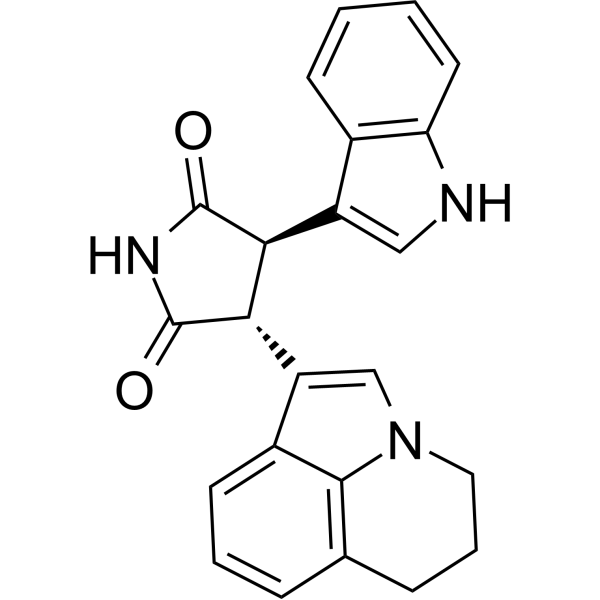
- HY-12029
-
|
|
EGFR
|
Cancer
|
|
WZ8040 is an irreversible mutated EGFR T790M inhibitor and inhibits EGFR phosphorylation. WZ8040 displays 100-fold greater activity against the mutated EGFR than the normal .
|
-
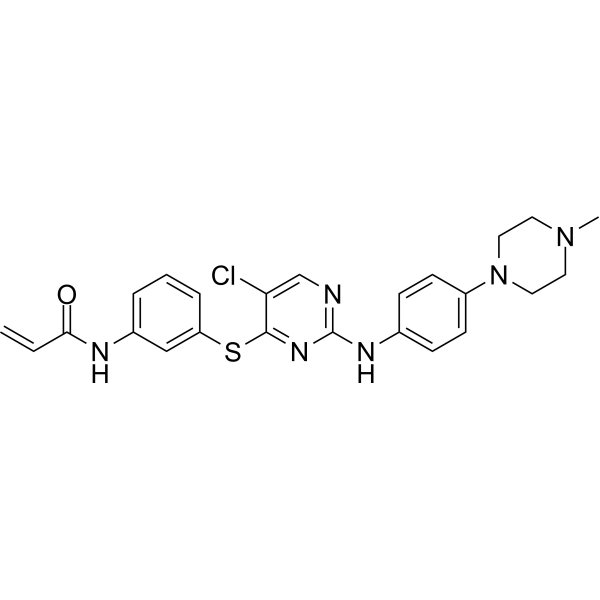
- HY-13525
-
|
|
Others
|
Metabolic Disease
Cancer
|
|
CP-91149 is a GP (glycogen phosphorylase) inhibitor. CP-91149 promotes glycogen resynthesis, but not its overaccumulation. CP-91149 has the potential for Type II (insulin-dependent) diabetes study .
|
-
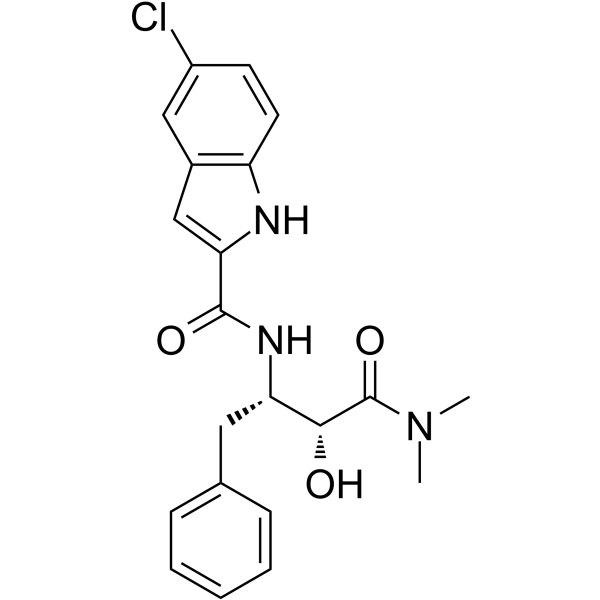
- HY-157432
-
|
|
EGFR
Apoptosis
|
Cancer
|
|
EGFR-IN-97 (compound 6q) is a EGFR inhibitor. EGFR-IN-97 shows inhibitory activity against Ba/F3-EGFR L858R/T790M/C797S and Ba/F3-EGFR Del19/T790M/C797S cells, with IC50 values of 0.42 μM and 0.41 μM, respectively. EGFR-IN-97 can promote apoptosis of NCI-H1975-EGFR L858R/T790M/C797S cells at the concentration of 0.8 μM .
|
-
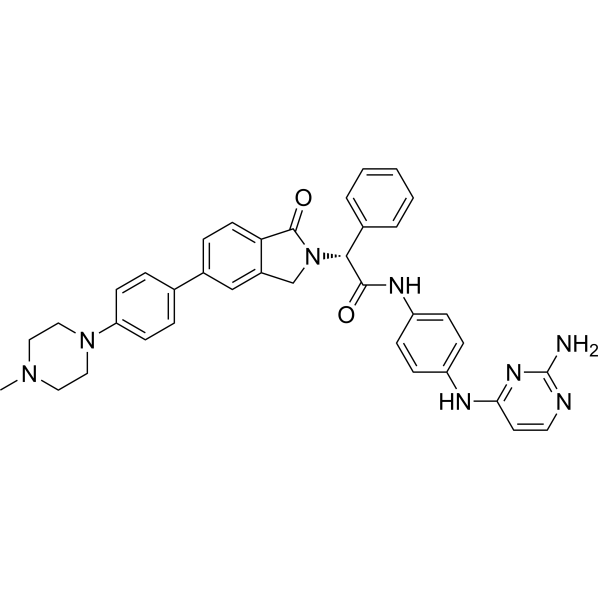
- HY-161030
-
|
|
EGFR
|
Cancer
|
|
EGFR-IN-92 (compound 15) is an allosteric T790M/L858R double mutant EGFR inhibitor. EGFR-IN-92 shows antiproliferative activity against H1975 non-small lung cancer (NSCLC) cancer cells expressing double mutant EGFR .
|
-
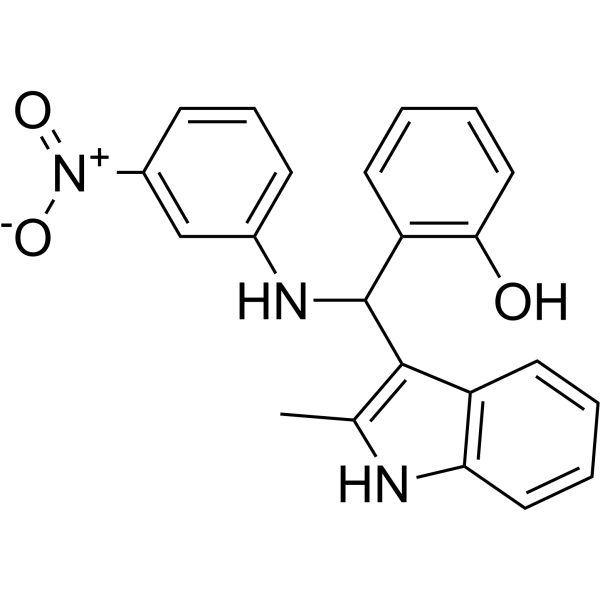
- HY-154960
-
|
|
Akt
Apoptosis
Microtubule/Tubulin
|
Cancer
|
|
Tubulin/AKT1-IN-1 (Compound D1-1) is an inhibitor of tubulin polymerization and AKT pathway activation. Tubulin/AKT1-IN-1 significantly inhibits the proliferation and metastasis of H1975 cells and slightly induced their apoptosis and can be used for non-small-cell lung cancer (NSCLC) research .
|
-
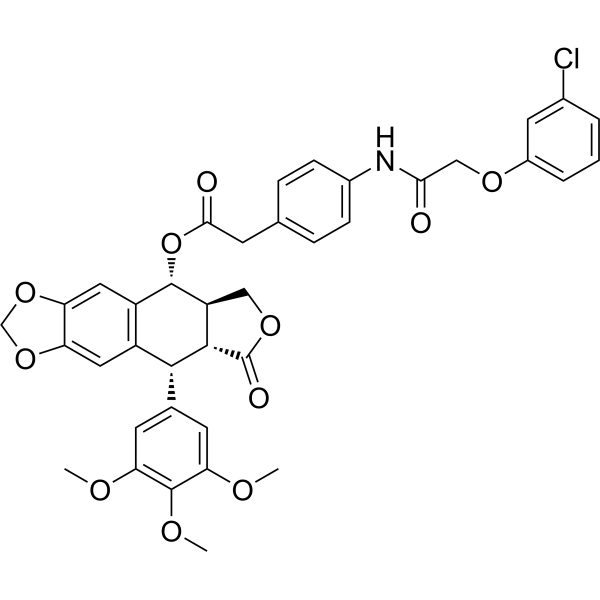
- HY-143337
-
|
|
Apoptosis
EGFR
|
Cancer
|
|
EGFR-IN-47 is a potent and orally active EGFR L858R/T790M/C797S inhibitor with an IC50 of 0.01 µM. EGFR-IN-47 induces cell cycle attest and cell apoptosis. EGFR-IN-47 has the potential for the research of NSCLC .
|
-
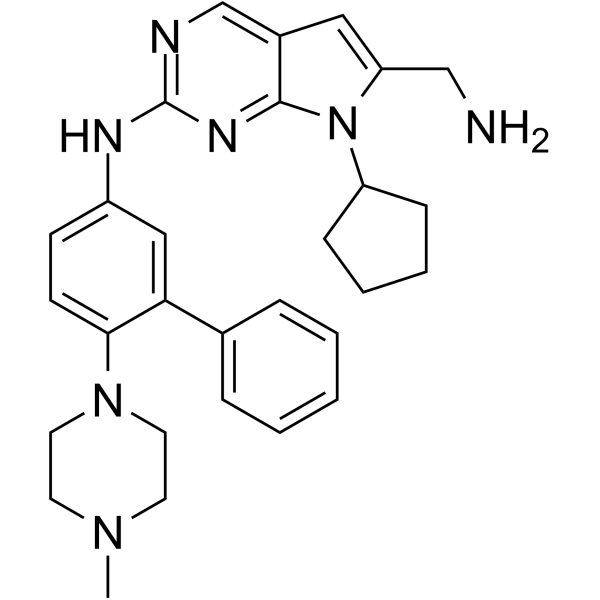
- HY-157564
-
|
|
Apoptosis
|
Cancer
|
|
Antitumor agent-135 (Compound 13) is a potent antitumor agent. Antitumor agent-135 induces cell apoptosis, with IC50s of 3.79 , 10.55, 1.14, and 4.14 μM for NSCLC cell lines (A549, H460, PC-9, and PC-9/GR) .
|
-
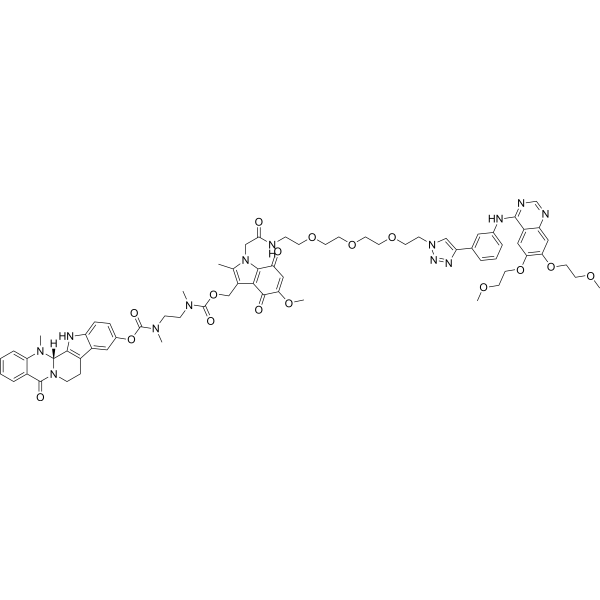
- HY-158058
-
|
|
Toll-like Receptor (TLR)
Pyroptosis
|
Inflammation/Immunology
Cancer
|
|
WYJ-2 is a selective agonist for toll-like receptor 2/1 (TLR2/1) with EC50 of 18.57 nM in human TLR2 and TLR1 transient-cotransfected HEK 293T cells. WYJ-2 induces pyroptosis and exhibits anticancer activity against non-small cell lung cancer (NSCLC) .
|
-
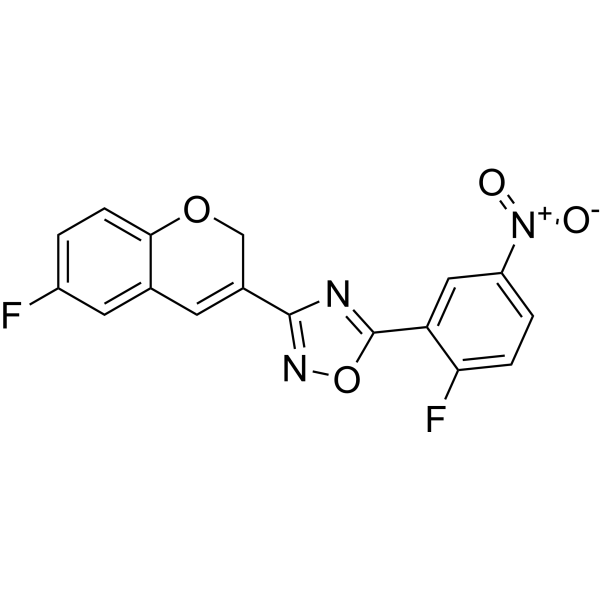
- HY-P99379
-
|
CAN04; Anti-IL-1RAP/IL-1R3 Reference Antibody (nidanilimab)
|
Interleukin Related
|
Cancer
|
|
Nidanilimab (CAN04) is a fully humanized monoclonal anti-IL1RAP antibody with a Kd value of 1.10 pM. Nidanilimab blocks IL1α and IL1β signaling and stimulates the immune system to destroy tumour cells. Nidanilimab can be used in research of non-small lung cancer (NSCLC) and pancreatic ductal adenocarcinoma (PDAC) .
|
-

- HY-N9954
-
|
|
Apoptosis
|
Cancer
|
|
Isoharringtonine is a natural alkaloid that can be purified from Cephalotaxus koreana Nakai. Isoharringtonine can inhibit cancer cell proliferation and migration, and induce cancer cell apoptosis. Isoharringtonine can be used for the research of cancers .
|
-
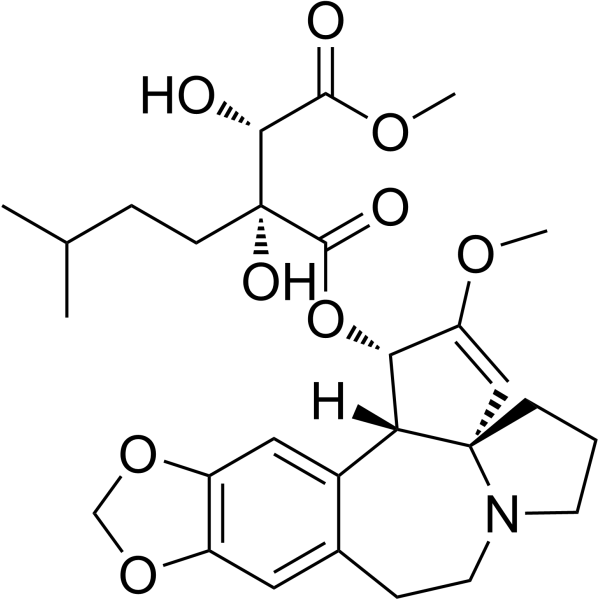
- HY-157480
-
|
|
EGFR
Aurora Kinase
|
Cancer
|
|
EGFR/AURKB-IN-1 (compound 7) is a dual-targeted EGFR/AURKB inhibitor, and inhibits the phpsphorylations of L858R EGFR and AURKB with IC50s of 0.07 and 1.1, respectively. EGFR/AURKB-IN-1 occupies the hydrophobic region I or the αC-helix out pocket of EGFR and the back pocket of AURKB, inhibiting the growth, division and metastasis of tumor cells, thus can be used for cancer research .
|
-
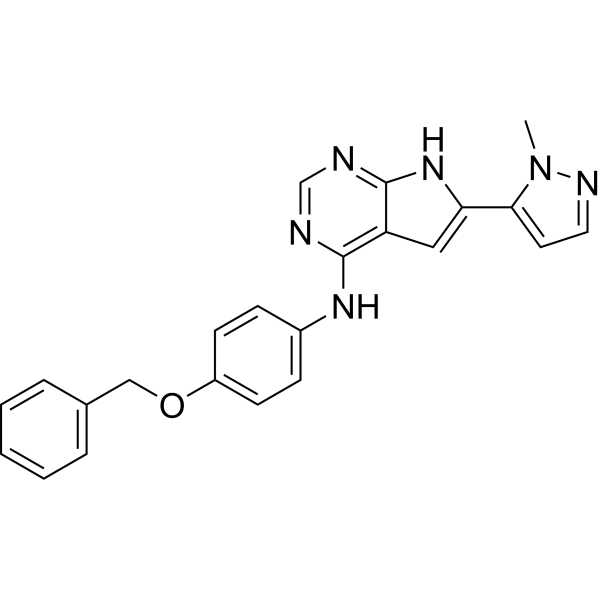
- HY-50687
-
|
(3S,4S)-ARQ 197; ARQ 198
|
Others
|
Cancer
|
|
(3S,4S)-Tivantinib is a potent and highly selective inhibitor of the receptor tyrosine kinase c-MET. (3S,4S)-Tivantinib has two novel targets, GSK3α and GSK3β, which play an important role in the cellular mechanism of non-small cell lung cancer (NSCLC) .
|
-
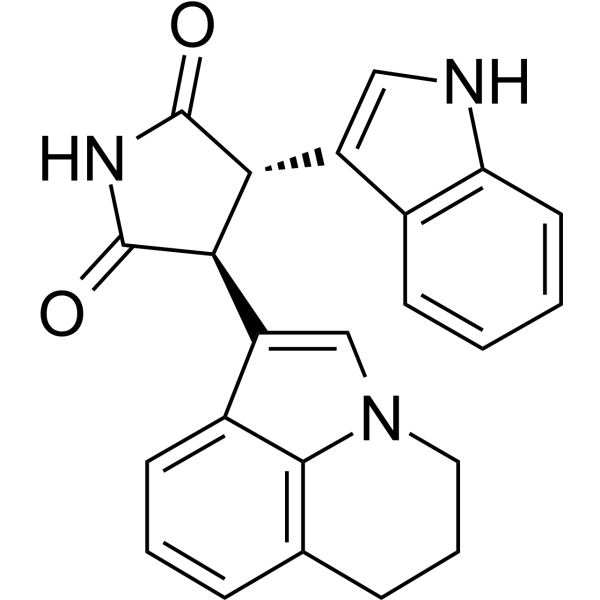
- HY-18750
-
|
AZD3759
|
EGFR
Apoptosis
|
Cancer
|
|
Zorifertinib (AZD3759) is a potent, orally active, central nervous system-penetrant, EGFR inhibitor. At Km ATP concentrations, the IC50s are 0.3, 0.2, and 0.2 nM for EGFR wt, EGFR L858R, and EGFR exon 19Del, respectively. Zorifertinib induces cancer cell apoptosis. Zorifertinib has antitumor activity, and can be used for NSCLC, HCC etc. research .
|
-
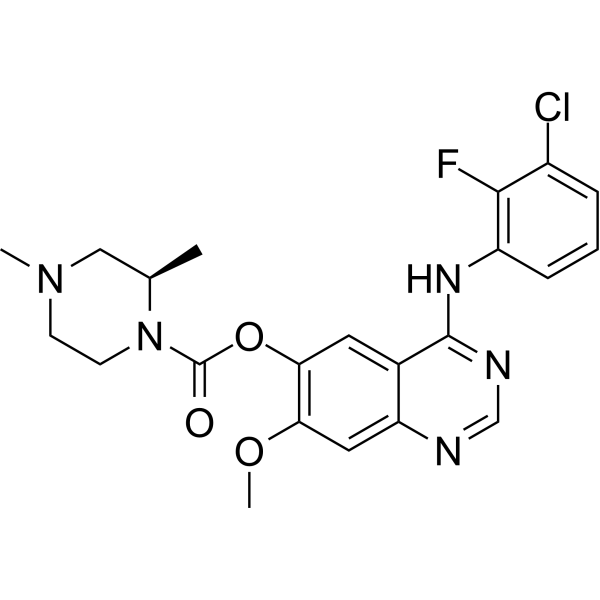
- HY-153863
-
|
|
MEK
|
Cancer
|
MS934 is a novel improved VHL-recruiting MEK 1/2 degrader. MS934 has anti-proliferation potency at inhibiting the growth of HT-29 cells with a GI50 value of 0.023 μM. MS934 can be used for the research of variety of human cancers, such as melanoma, nonsmall cell lung cancer (NSCLC), colorectal cancer, primary brain tumors, and hepatocellular carcinoma .
|
-
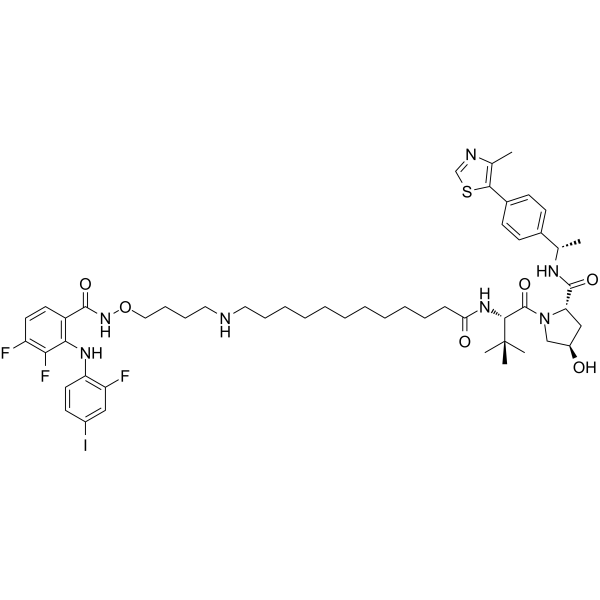
- HY-138072
-
|
|
EGFR
|
Cancer
|
|
EMI1 is an EGFR ex19del/T790M/C797S and EGFR L858R/T790M/C797S inhibitor. EMI1 can be used for the research of mutant EGFR-associated, drug-resistant non-small-cell lung cancer (NSCLC) .
|
-
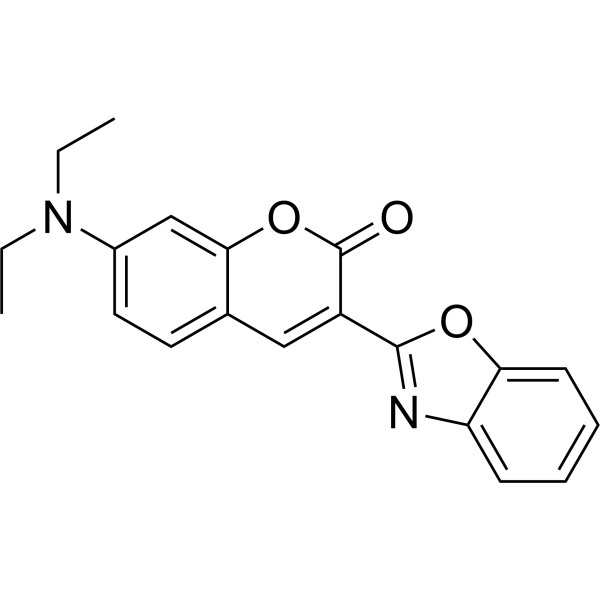
- HY-143466
-
|
|
FAK
ULK
AMPK
Apoptosis
Autophagy
|
Cancer
|
|
ULK1-IN-2 (compound 3s) is a potent ULK1 inhibitor. ULK1-IN-2 shows highest cytotoxic effect against cancer cell lines, with IC50 of 1.94 μM in A549. ULK1-IN-2 can induce apoptosis and simultaneously block autophagy, and can be used to study NSCLC (Non-small cell lung cancer) .
|
-
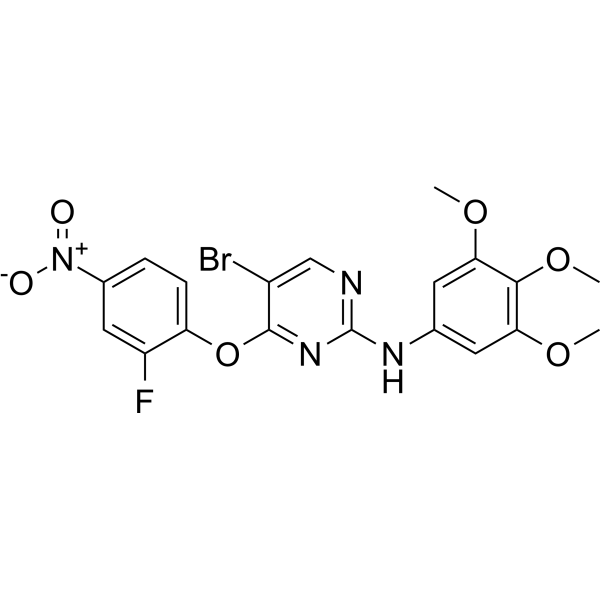
- HY-N0883
-
|
Gamabufagin
|
VEGFR
|
Cancer
|
|
Gamabufotalin (Gamabufagin), a main active compound isolated from Chinese medicine Chansu, has been shown to strongly inhibit cancer cell growth and inflammatory response. Gamabufotalin could inhibite angiogenesis by inhibiting the activation of VEGFR-2 signaling pathways.
|
-
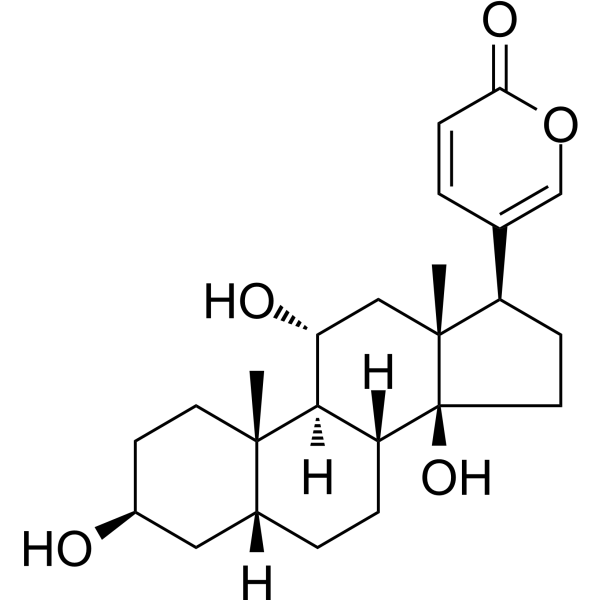
- HY-19985
-
|
|
EGFR
|
Cancer
|
|
PF-06459988 is an orally activity, irreversible and mutant-selective inhibitor of EGFR mutant forms. PF-06459988 demonstrates high potency and specificity to the T790M-containing double mutant EGFRs. PF-06459988 can be used for the research of cancer .
|
-
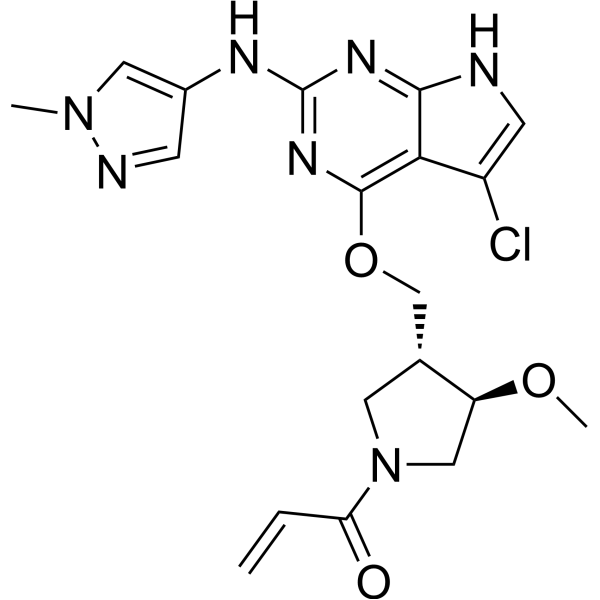
- HY-N2993
-
|
|
Apoptosis
|
Cancer
|
|
Polyporenic acid C is a lanostane-type triterpenoid isolated from P. cocos. Polyporenic acid C induces cell apoptosis through the death receptor-mediated apoptotic pathway without the involvement of the mitochondria. Polyporenic acid C is promising agent for lung cancer therapy .
|
-
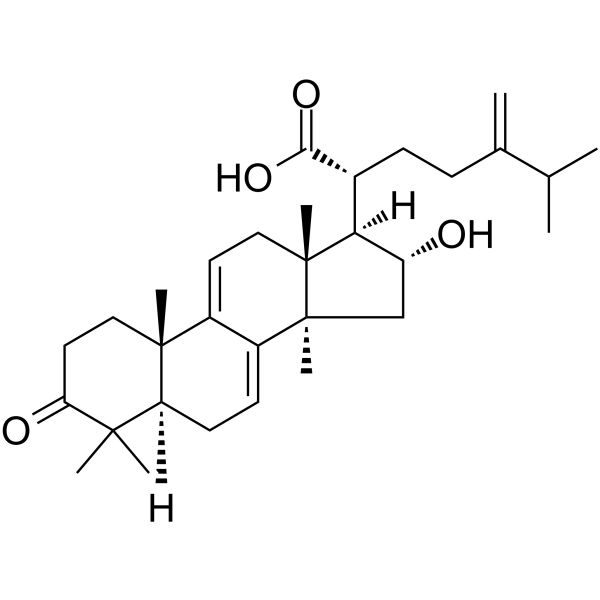
- HY-N8207
-
|
|
Apoptosis
MicroRNA
|
Cancer
|
|
Gypenoside LI, a gypenoside monomer, possesses anti-tumor activity. Gypenoside LI induces cell apoptosis, cell cycle and migration .
|
-
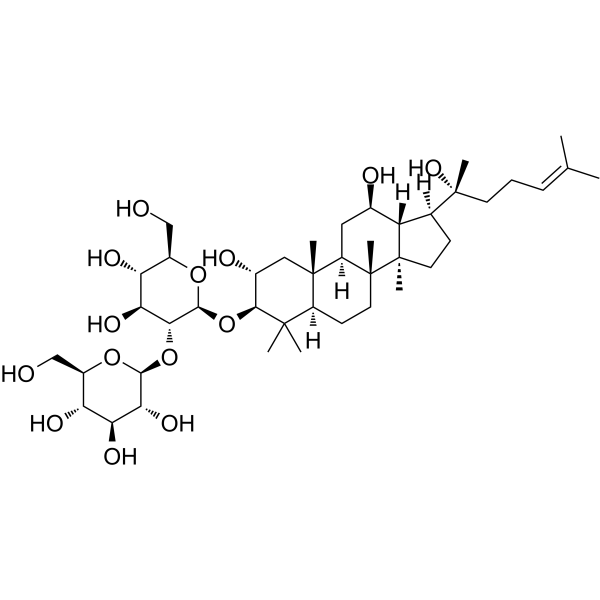
- HY-139611B
-
|
|
Histone Methyltransferase
|
Cancer
|
|
(S)-MRTX-1719 (example 16-7) is the S-enantiomer of MRTX-1719. (S)-MRTX-1719 is a PRMT5/MTA complex inhibitor, with an IC50 of 7070 nM .
|
-
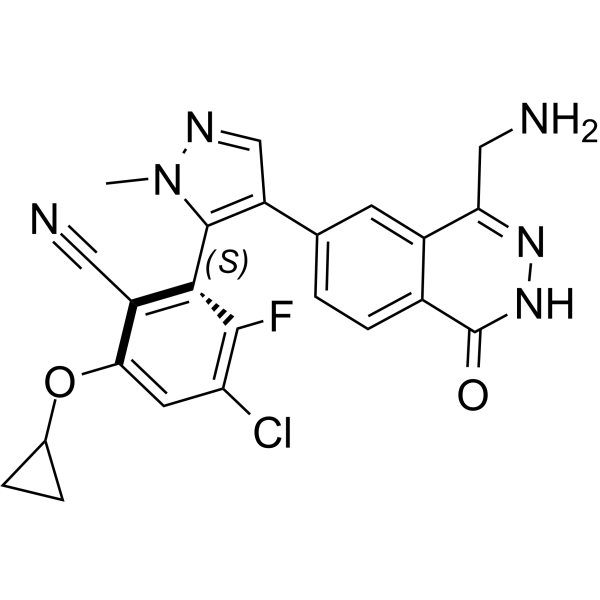
- HY-P99675
-
|
AK112
|
PD-1/PD-L1
VEGFR
|
Cancer
|
|
Ivonescimab (AK112) is a PD-1/VEGF Bispecific Antibody. Ivonescimab can be used for cancer research .
|
-

- HY-149302
-
|
|
Apoptosis
Autophagy
Histone Acetyltransferase
|
Cancer
|
MC4033 shows IC50s of 39.4 μM, 52.1 μM, 41 μM and 30.1 μM in HCT116, H1299, A549 and U937, respectively .
MC4033 (25, 50, 100, and 200 μM, 72 h) reduces the level of H4K16Ac in HT29 cells, suggesting its ability to inhibit KAT8 in cells .
|
-
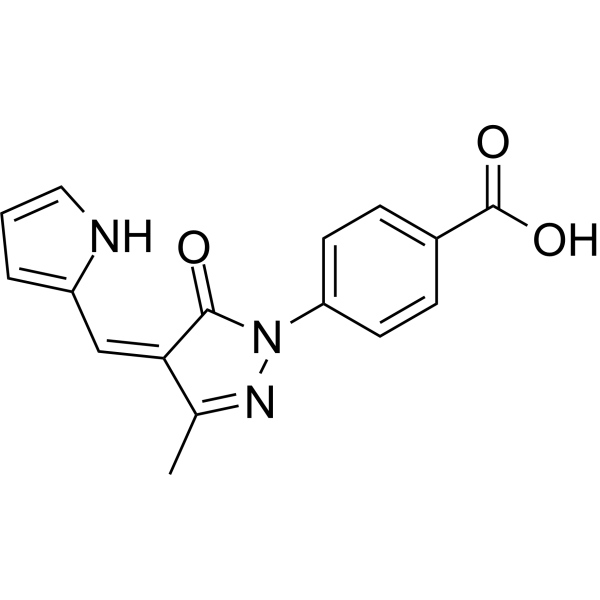
- HY-N3974
-
|
(+)-Griffipavixanthone
|
Apoptosis
|
Cancer
|
|
Griffipavixanthone can be extracted from Garcinia schomburgkiana. Griffipavixanthone induces cell apoptosis through mitochondrial apoptotic pathway accompanying with ROS production. Griffipavixanthone is an anti-cancer agent. Griffipavixanthone is a weak sucrase inhibitor (IC50: 4.58 mM) .
|
-
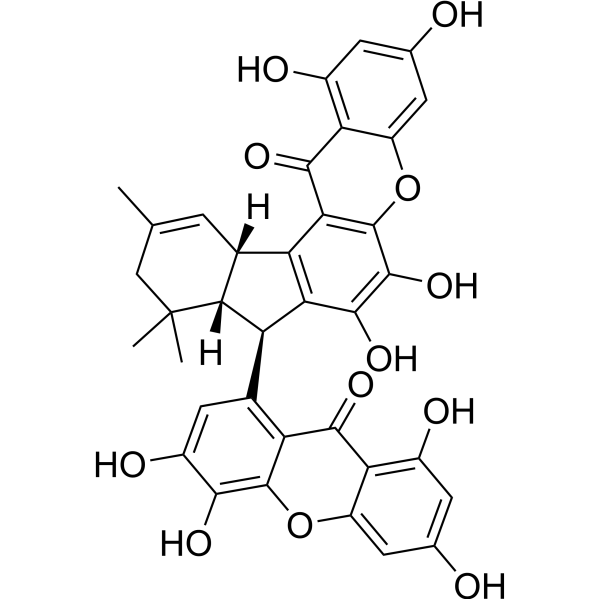
- HY-163199
-
|
|
ASCT
mTOR
Apoptosis
Autophagy
|
Cancer
|
|
ASCT2-IN-2 (compound 25e) is an ASCT2 inhibitor with IC50 of 5.14 μM. ASCT2-IN-2 regulates amino acid metabolism as well as mTOR signaling and thereby induces cell apoptosis. ASCT2-IN-2 inhibits tumor growth .
|
-
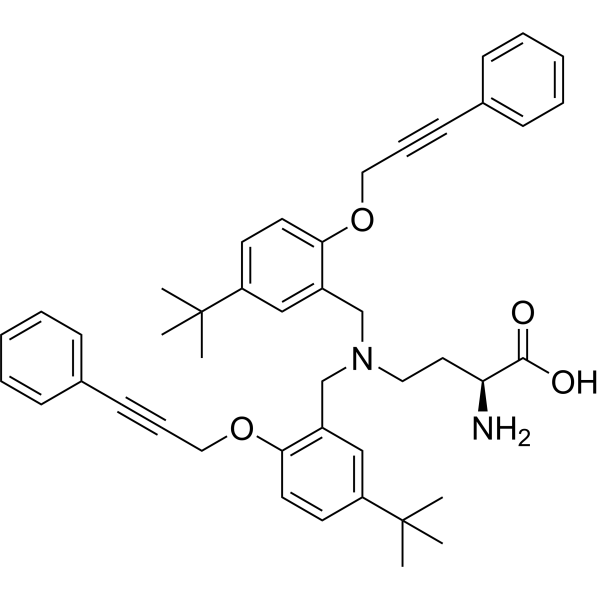
- HY-144680
-
|
ZL-2313
|
EGFR
|
Cancer
|
|
BLU-945 is a potent, highly selective, reversible and orally active epidermal growth factor receptor (EGFR) tyrosine kinase inhibitor (TKIs). BLU-945 can effectively inhibit EGFR with L858R and/or exon 19 deletion mutation, T790M mutation and C797S mutation. BLU-945 can be used for the research of lung cancer including non-small cell lung cancer (NSCLC) .
|
-
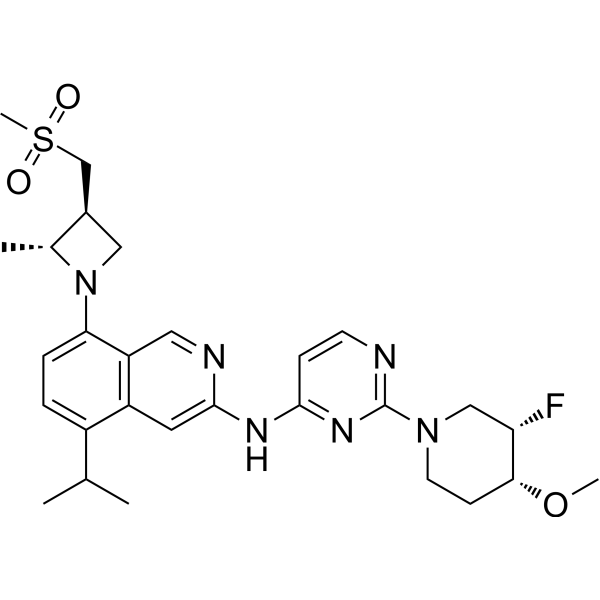
- HY-149275
-
|
|
Pyruvate Kinase
PDK-1
Akt
EGFR
Apoptosis
|
Cancer
|
|
PKM2/PDK1-IN-1, one of shikonin thioether derivatives, is a dual inhibitor of PKM2/PDK1. PKM2/PDK1-IN-1 inhibits the proliferation of NSCLC cells, and induces apoptosis. PKM2/PDK1-IN-1 induces intercellular ROS production, and regulates the apoptotic proteins, to involves in mitochondrial and death receptor pathway .
|
-
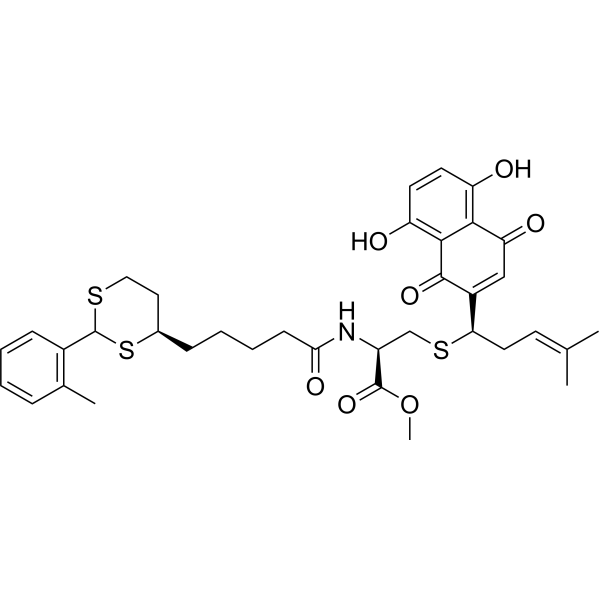
- HY-N2199
-
|
|
|
|
|
Sotetsuflavone is a flavonoid that can be isolated from Cycas revolute. Sotetsuflavone inhibits migration and invasion of A549 cells by reversing EMT, and induces cell apoptosis and autophagy. Sotetsuflavone inhibits HIF-1α, VEGF, angiostatin, MMP-9, and MMP-13 expression in A549 cells. Sotetsuflavone also protects mice against Crohn's disease (CD)-like colitis. Sotetsuflavone can be used for research of NSCLC .
|
-
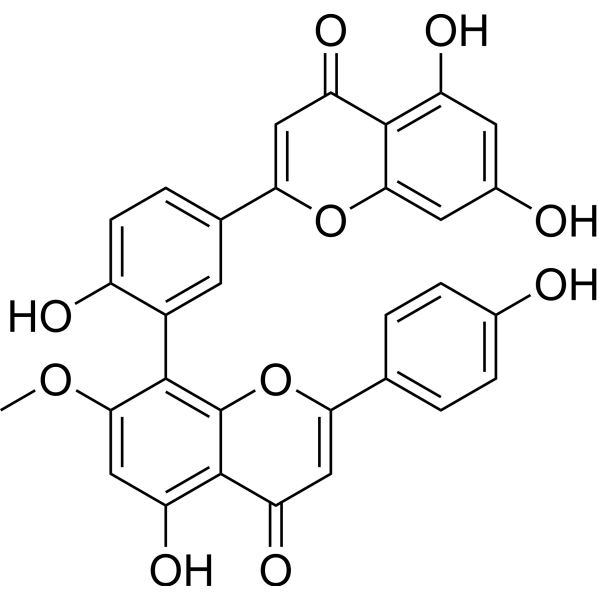
- HY-157526
-
|
|
EGFR
Apoptosis
|
Cancer
|
|
EGFR-TK-IN-1 (compound 7o) is a potent mutant EGFR inhibitor with IC50 of 8.5 nM an 9.3 nM against EGFR L858R/T790M and EGFR Del19.EGFR-TK-IN-1 showes strong antiproliferative effects against EGFR mutant-driven non-small cell lung cancer (NSCLC) cells and induces cell apoptosis .
|
-
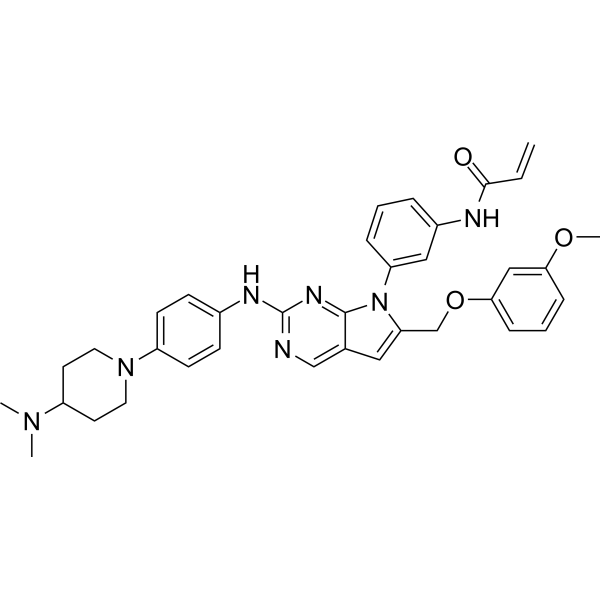
- HY-146194
-
|
|
Reactive Oxygen Species
|
Cancer
|
|
NHEJ inhibitor-1 (Compound C2) is a trifunctional Pt(II) complex, alleviates the non-homologous end connection (NHEJ)/homologous recombination (HR)-related double strand breaks (DSBs) repairs to evade Cisplatin-resistance in non-small cell lung cancer (NSCLC). NHEJ inhibitor-1 inhibits the damage repair proteins Ku70 and Rad51 to make tumors re-sensitive to Cisplatin。NHEJ inhibitor-1 also induces ROS generation and MMP deduction .
|
-
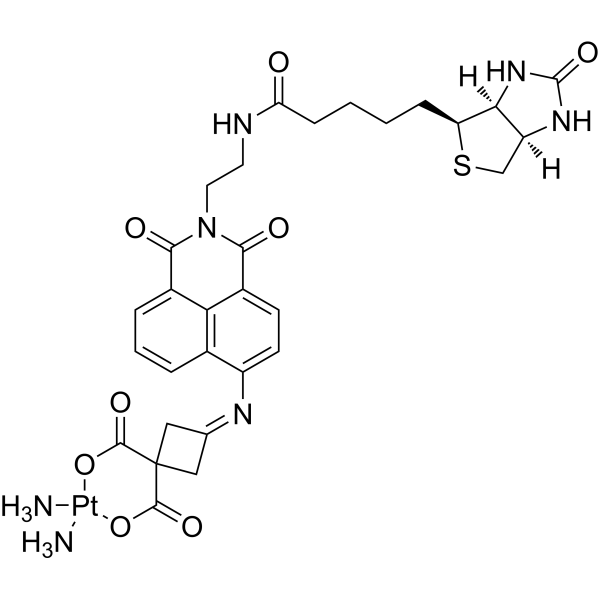
- HY-149695
-
|
|
EGFR
|
Cancer
|
|
EGFR-IN-91 (compound 9) is an orally available EGFR inhibitor with blood-brain barrier penetrability. EGFR-IN-91 inhibits EGFR L858R/C797S and EGFR exon 19del/C797S, inducing tumor regression in xenograft (PDX) mouse models. EGFR-IN-91 has the potential to inhibit localized and metastatic non-small cell lung cancer (NSCLC) driven by EGFR mutants .
|
-
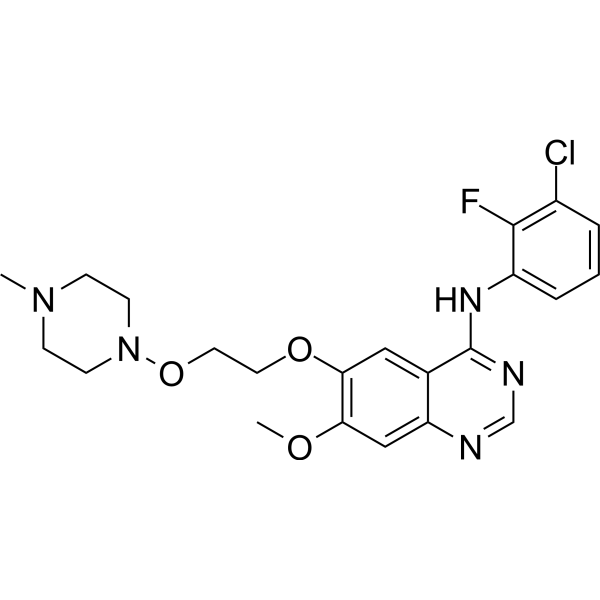
- HY-131066
-
|
|
EGFR
|
Cancer
|
|
EMI48, the derivative of EMI1, displays greater potency toward mutant EGFR than EMI1. EMI48 inhibits EGFR triple mutants .
|
-
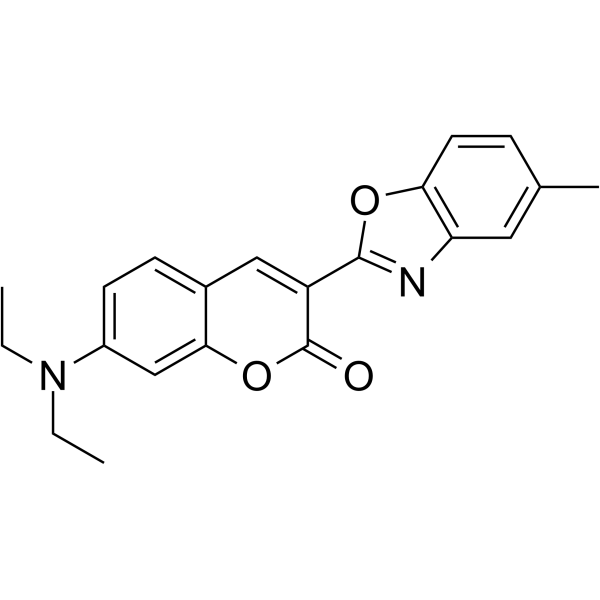
- HY-139611
-
|
|
Histone Methyltransferase
|
Cancer
|
|
MRTX-1719 is a potent, orally active, selective PRMT5•MTA complex inhibitor, with IC50 of 3.6 and 20.5 nM for PRMT5•MTA and PRMT5. MRTX-1719 binds to the PRMT5•MTA complex, with KD value of 0.14 pM. MRTX-1719 shows antineoplastic activity in vitro and in vivo, and can be used for cancer study .
|
-
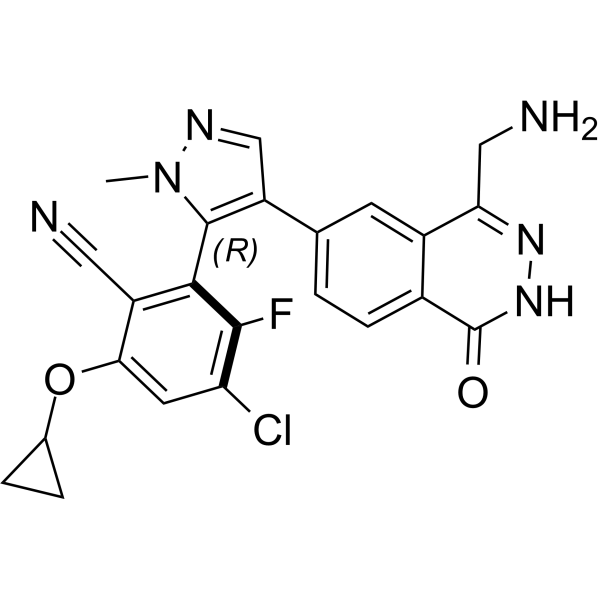
- HY-108230
-
|
|
Anaplastic lymphoma kinase (ALK)
|
Cancer
|
|
ALK-IN-12 is a potent and orally active ALK inhibitor with an IC50 of 0.18 nM. ALK-IN-12 also inhibits IGF1R and InsR (IC50=20.3 and 90.6 nM). Antitumor activities .
|
-
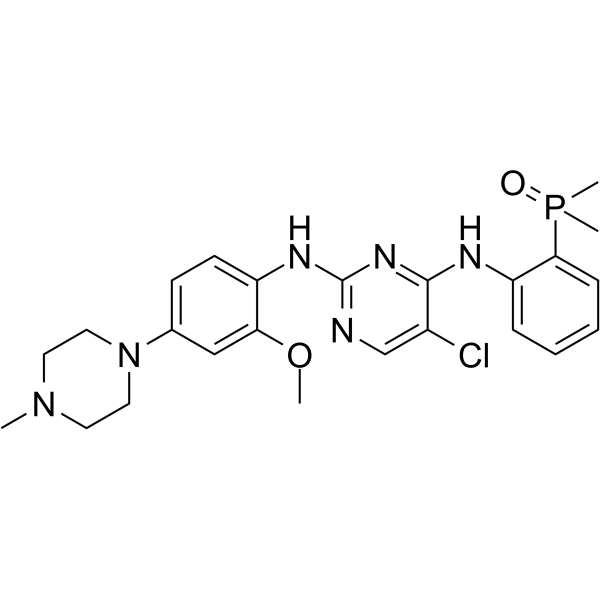
- HY-145928
-
|
GDC-6036
|
Ras
|
Cancer
|
|
Divarasib (GDC-6036) is an orally bioavailable, highly potent, and selective KRAS G12C inhibitor with an IC50 of <0.01 μM. Divarasib covalently binds to the switch II (SW-II) pocket of KRAS G12C and irreversibly locks it in the inactive GDP-bound state.
|
-
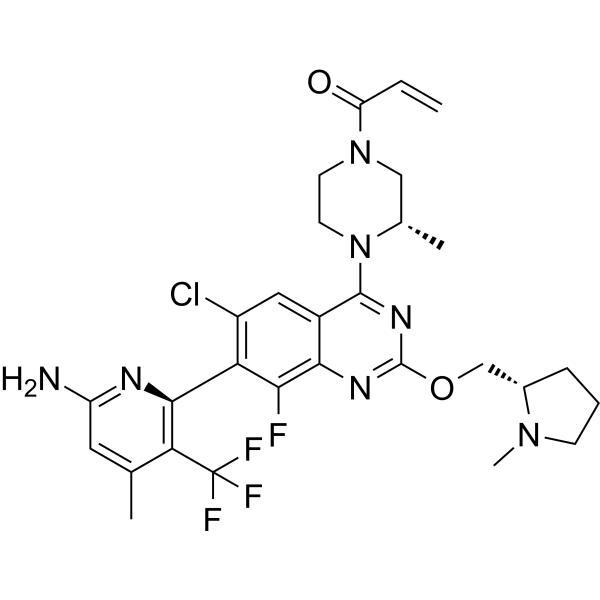
- HY-148278
-
|
|
Ras
|
Cancer
|
|
BI-0474 is a potent KRAS G12C inhibitor with an IC50 value of 7.0 nM for the GDP-KRAS::SOS1 protein-protein interaction. BI-0474 exhibits good anti-proliferative activity against NCI-H358 cells carrying the G12C mutation. BI-0474 also shows good anti-tumour activity in non-small cell lung cancer xenograft models .
|
-
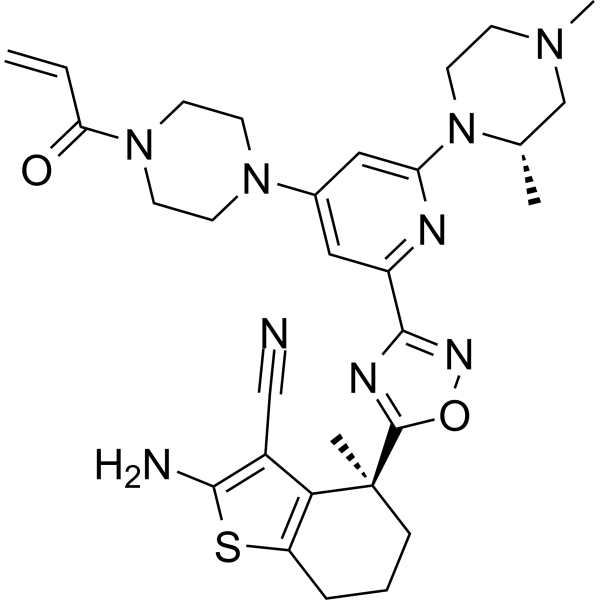
- HY-N1121
-
|
|
Others
|
Cancer
|
|
Triptonodiol can be isolated from Trypterygium wilfordii. Triptonodiol has anti-inflammatory and anti-cancer activity. Triptonodiol inhibits the biological activity of GSK .
|
-
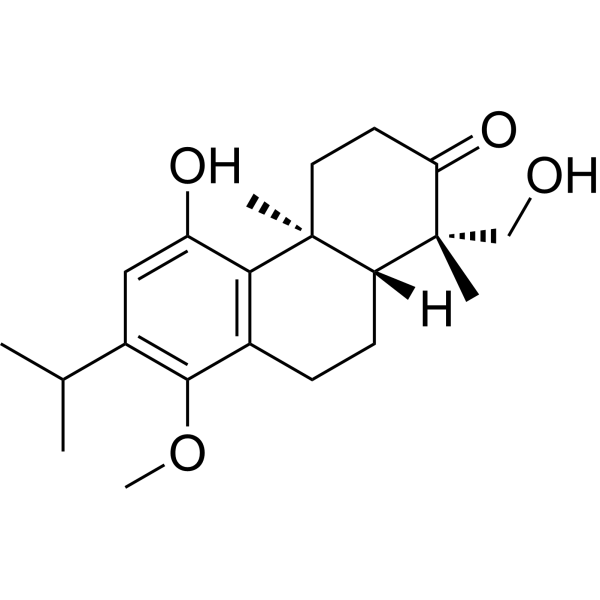
- HY-137191
-
|
|
EGFR
|
Cancer
|
|
CH7233163 is a noncovalent ATP-competitive inhibitor for EGFR-Del19/T790M/C797S. CH7233163 can overcome Osimertinib (HY-15772)-Resistant EGFR-Del19/T790M/C797S mutation. CH7233163 blocks the EGFR phosphorylation in the Del19/T790M/C797S_NIH3T3 cells. CH7233163 has antitumor activities .
|
-
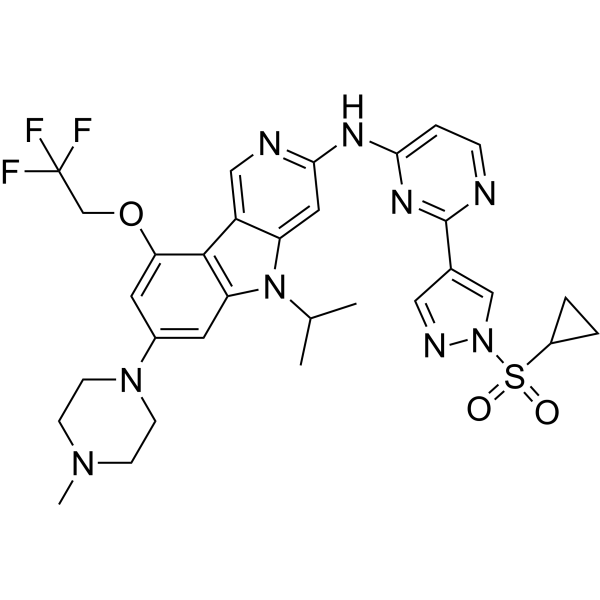
- HY-155178
-
|
|
EGFR
|
Cancer
|
|
Antiproliferative agent-34 (Compound A14) is a multi-target kinase inhibitor, with an IC50 of 177 nM and 1567 nM for EGFR L858R/T790M and EGFR WT. Antiproliferative agent-34 also inhibits JAK2, ROS1, FLT3, FLT4, PDGFRα with IC50 of 30.93, 106.90, 108.00, 226.60, 42.53 nM. Antiproliferative agent-34 inhibits H1975 and HCC827 cells proliferation with IC50 values below 40 nM under normoxic condition, and the anti-proliferation potency achieves 4–6-fold improvement (IC50 values < 10 nM) under hypoxic condition .
|
-
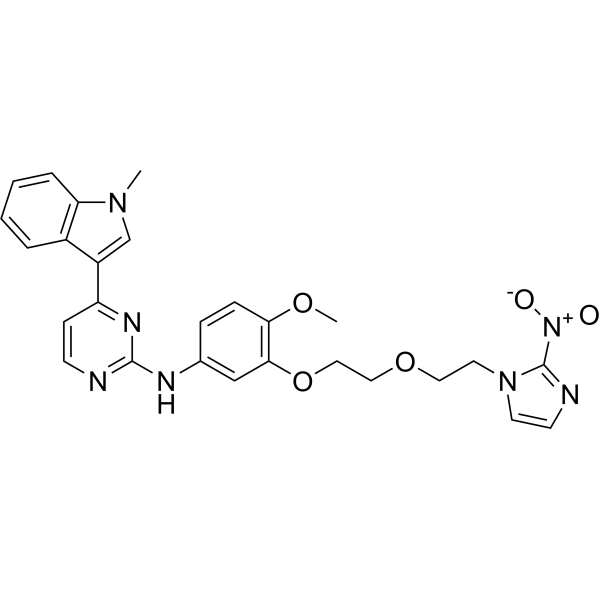
- HY-145928B
-
|
GDC-6036 adipate
|
Ras
|
Cancer
|
|
Divarasib (GDC-6036) adipate is an orally bioavailable, highly potent, and selective KRAS G12C inhibitor with an IC50 of <0.01 μM. Divarasib covalently binds to the switch II (SW-II) pocket of KRAS G12C and irreversibly locks it in the inactive GDP-bound state .
|
-
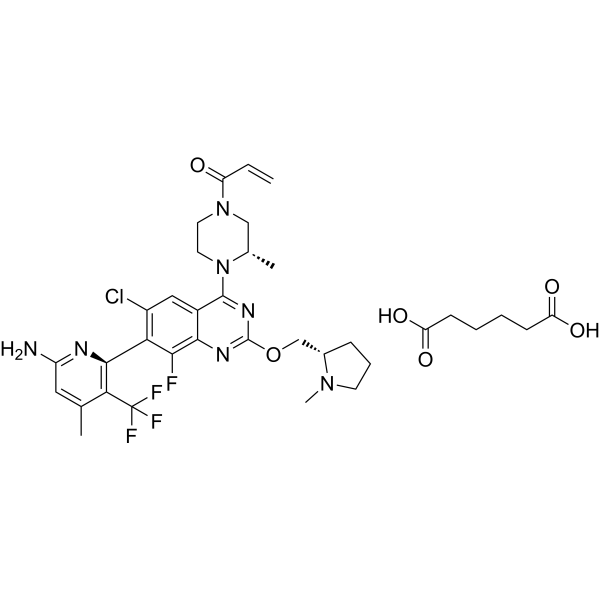
- HY-163198
-
|
|
ASCT
mTOR
Apoptosis
Autophagy
|
Cancer
|
|
ASCT2-IN-1 (compound 20k) is an ASCT2 inhibitor with IC50 values of 5.6 μM and 3.5 μM in cells A549 and HEK293, respectively. ASCT2-IN-1 induces cell apoptosis. ASCT2-IN-1 inhibits tumor growth .
|
-
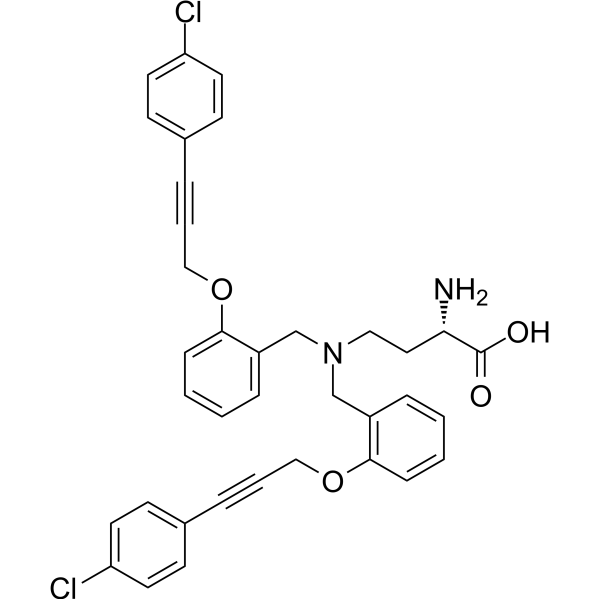
- HY-123938
-
|
CYH33
|
PI3K
|
Cancer
|
|
Risovalisib (CYH33) is an orally active, highly selective PI3Kα inhibitor with IC50s of 5.9 nM/598 nM/78.7 nM/225 nM against α/β/δ/γ isoform, respectively. Risovalisib inhibits phosphorylation of Akt, ERK and induces significant G1 phase arrest in breast cancer cells and non-small cell lung cancer (NSCLC) cells. Risovalisib has potent activity against solid tumors .
|
-
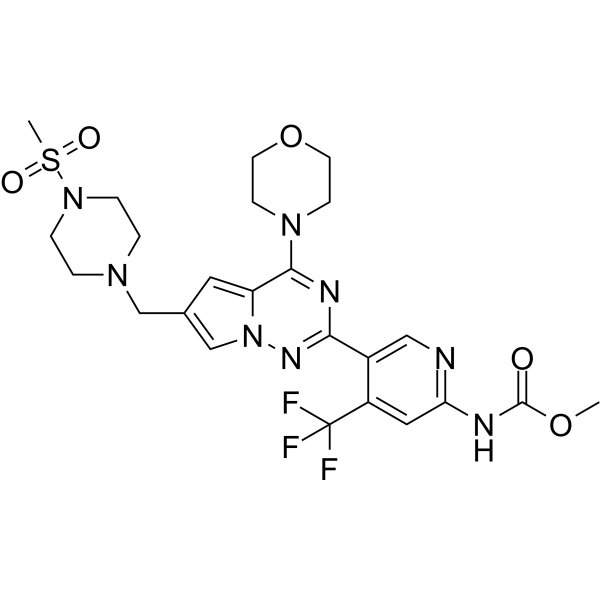
- HY-148260
-
|
|
Ras
|
Cancer
|
|
KRAS G12D inhibitor 16 is a KRAS G12D inhibitor. KRAS G12D inhibitor 16 has inhibitory activity against KRAS G12D and KRAS G12D mutation with IC50 value of 0.7 nM and 0.35 μM, respectively. KRAS G12D inhibitor 16 can be used for the research of many malignant tumor, such as pancreatic ductal adenocarcinomas (PDAC), colon and rectal carcinomas (CRC), non-small cell lung carcinomas (NSCLC) .
|
-
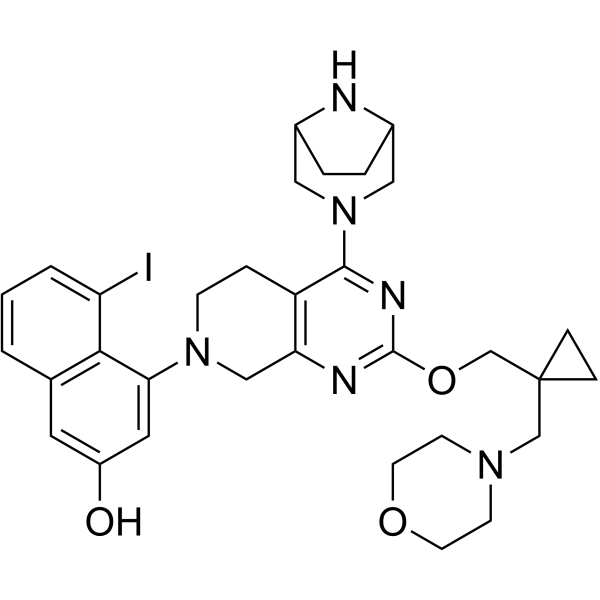
- HY-137497
-
|
|
Ras
Apoptosis
|
Cancer
|
|
KRAS inhibitor-9, a potent KRAS inhibitor (Kd=92 μM), blocks the formation of GTP-KRAS and downstream activation of KRAS. KRAS inhibitor-9 binds to KRAS G12D, KRAS G12C and KRAS Q61H protein with a moderate binding affinity. KRAS inhibitor-9 causes G2/M cell cycle arrest and induces apoptosis. KRAS inhibitor-9 selectively inhibits the proliferation of NSCLC cells with KRAS mutation but not normal lung cells .
|
-
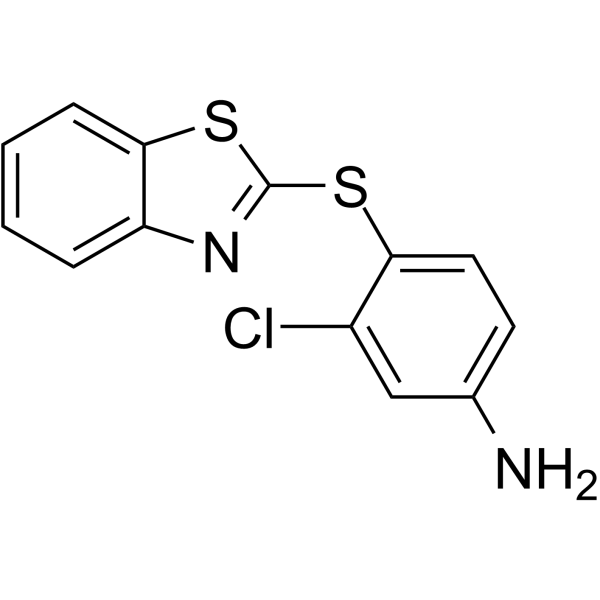
- HY-123938A
-
|
|
PI3K
|
Cancer
|
|
CYH33 methanesulfonate is an orally active, highly selective PI3Kα inhibitor with IC50s of 5.9 nM/598 nM/78.7 nM/225 nM against α/β/δ/γ isoform, respectively. CYH33 methanesulfonate inhibits phosphorylation of Akt, ERK and induces significant G1 phase arrest in breast cancer cells and non-small cell lung cancer (NSCLC) cells. CYH33 methanesulfonate has potent activity against solid tumors .
|
-
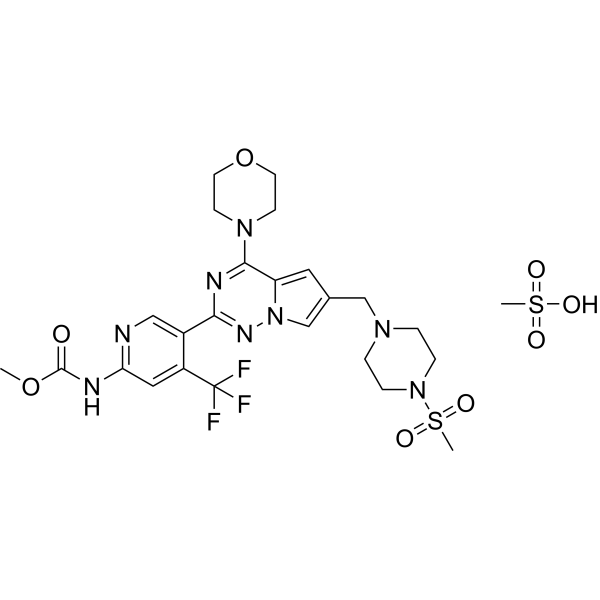
- HY-113916
-
|
AT13387 lactate
|
HSP
|
Cancer
|
|
Onalespib lactate is a potent and cross the blood-brain barrier heat-shock-protein-90 (Hsp90) inhibitor with an Kd value of 0.71 nM. Onalespib lactate inhibits the proliferation, survival and migration. Onalespib lactate decreases the expression of EGFR, p-EGFR, AKT, P-AKT, ERK1/2, P-ERK1/2, S6, P-S6 protein. Onalespib lactate shows antitumor activity. Onalespib lactate has the potential for the research of non-small cell lung cancer (NSCLC) .
|
-
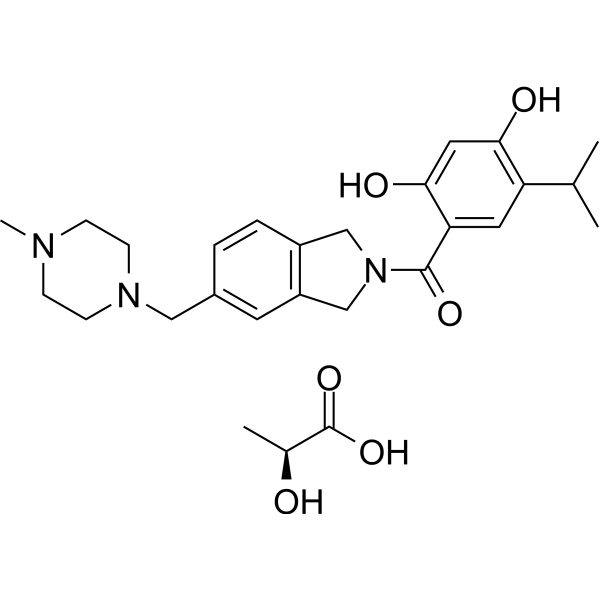
- HY-131003A
-
|
DS-6051b free base; AB-106 free base; IBI-344 free base
|
ROS Kinase
|
Cancer
|
|
Taletrectinib (DS-6051b) free base is a potent, orally active, and next-generation selective ROS1/NTRK inhibitor. Taletrectinib free base potently inhibits recombinant ROS1, NTRK1, NTRK2, and NTRK3 with IC50s of 0.207, 0.622, 2.28, and 0.98 nM, respectively. Taletrectinib free base also inhibits ROS1 G2032R and other Crizotinib-resistant ROS1 mutants .
|
-
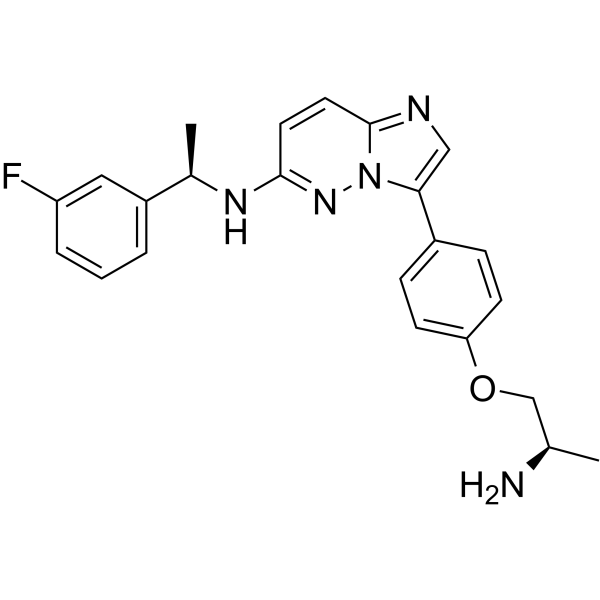
- HY-119944
-
|
|
EGFR
|
Cancer
|
|
JND3229 is a reversible EGFR C797S inhibitor with IC50 values of 5.8, 6.8 and 30.5 nM for EGFR L858R/T790M/C797S, EGFR WT and EGFR L858R/T790M, respectively. JND3229 has good anti-proliferative activity and can effectively inhibit tumour growth in vivo. JND3229 can be used in cancer research, especially in non-small cell carcinoma .
|
-
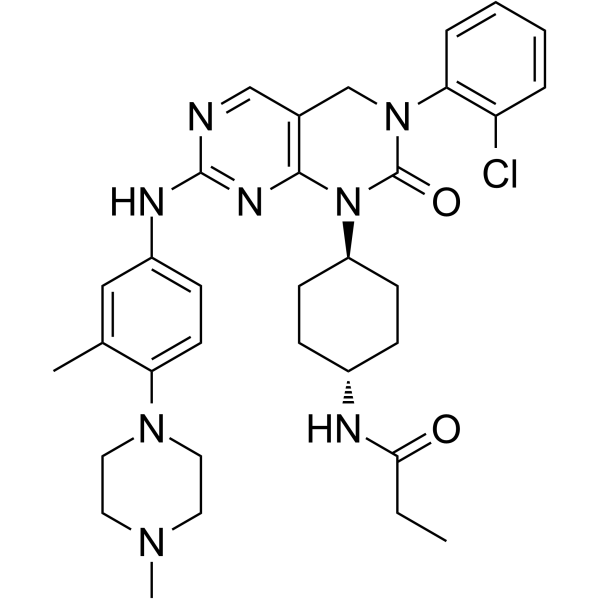
- HY-131003
-
|
DS-6051b; AB-106; IBI-344
|
ROS Kinase
|
Cancer
|
|
Taletrectinib (DS-6051b) is a potent, orally active, and next-generation selective ROS1/NTRK inhibitor. Taletrectinib potently inhibits recombinant ROS1, NTRK1, NTRK2, and NTRK3 with IC50s of 0.207, 0.622, 2.28, and 0.98 nM, respectively. Taletrectinib also inhibits ROS1 G2032R and other Crizotinib-resistant ROS1 mutants .
|
-
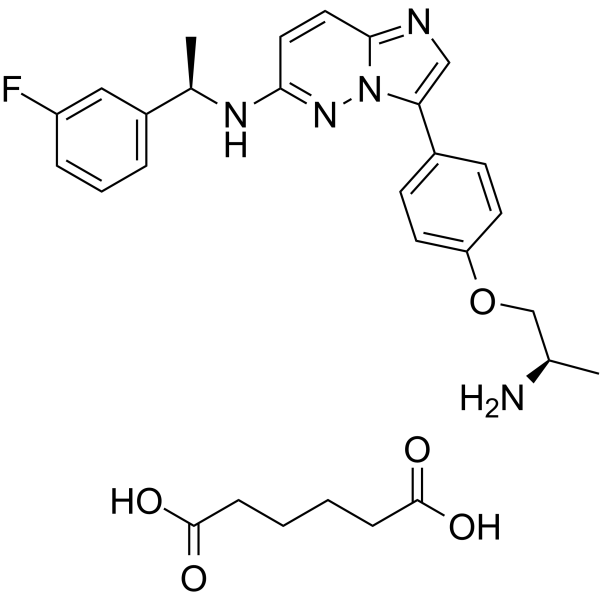
- HY-147992
-
|
|
EGFR
|
Cancer
|
|
EGFR/HER2-IN-4(compound 6d) is an orally active irreversible dual inhibitor. EGFR/HER2-IN-4 inhibits EGFR with an IC50 value of 0.6 nM and demonstrates potent EGFR kinase inhibitory activities on L858R and T790M mutations. EGFR/HER2-IN-4 has potent antitumor efficacy in vivo and can be used for lung cancer research .
|
-
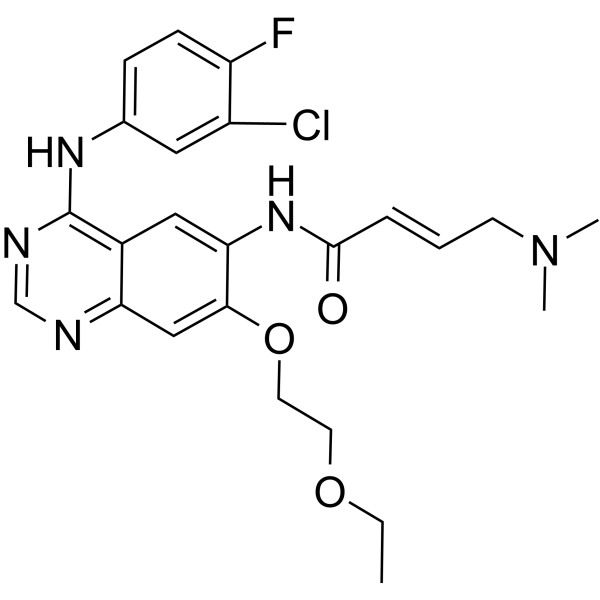
- HY-147994
-
|
|
EGFR
|
Cancer
|
|
EGFR/HER2-IN-5 (compound 6h) is an orally active irreversible dual inhibitor. EGFR/HER2-IN-5 inhibits EGFR with an IC50 value of 1.01 nM and demonstrates potent EGFR kinase inhibitory activities on L858R and T790M mutations. EGFR/HER2-IN-5 has potent antitumor efficacy in vivo and can be used for lung cancer research .
|
-
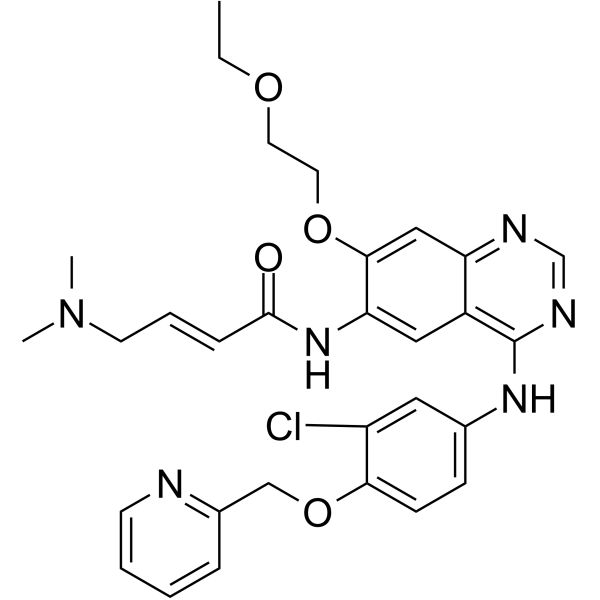
- HY-10224A
-
|
LBH589 lactate; NVP-LBH589 lactate
|
HDAC
HIV
Autophagy
Apoptosis
|
Infection
Cancer
|
|
Panobinostat lactate is a potent and orally active non-selective HDAC inhibitor. Panobinostat lactate has antineoplastic activities. Panobinostat lactate effectively disrupts HIV latency. Panobinostat lactate induces cell apoptosis and autophagy. Panobinostat lactate can be used for the study of refractory or relapsed multiple myeloma .
|
-
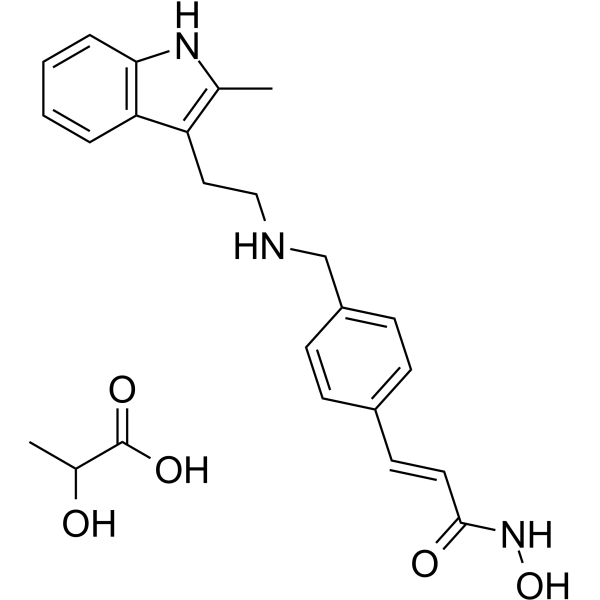
- HY-50895G
-
|
ZD1839
|
EGFR
Autophagy
Apoptosis
|
Cancer
|
|
Gefitinib (ZD1839) (GMP) is Gefitinib (HY-50895) produced by using GMP guidelines. GMP small molecules work appropriately as an auxiliary reagent for cell therapy manufacture. Gefitinib is a potent, selective and orally active EGFR tyrosine kinase inhibitor .
|
-
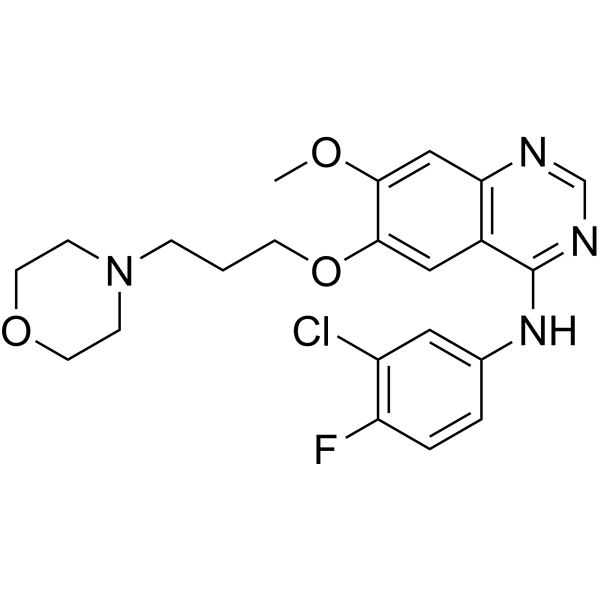
- HY-148572
-
|
|
Indoleamine 2,3-Dioxygenase (IDO)
NAMPT
|
Cancer
|
|
NAMPT/IDO1-IN-1 is an orally active dual inhibitor of NAMPT and IDO1 with IC50s of 57.7 nM and 233 nM, respectively. NAMPT/IDO1-IN-1 blocks NAD+ biosynthesis, inhibits proliferation and migration of Paclitaxel (HY-B0015)- and FK866 (HY-50876)-resistant NSCLC cell lines (A549/R cells). NAMPT/IDO1-IN-1 has shown antitumor effects in mice and enhanced A549/R cell sensitivity to paclitaxel .
|
-
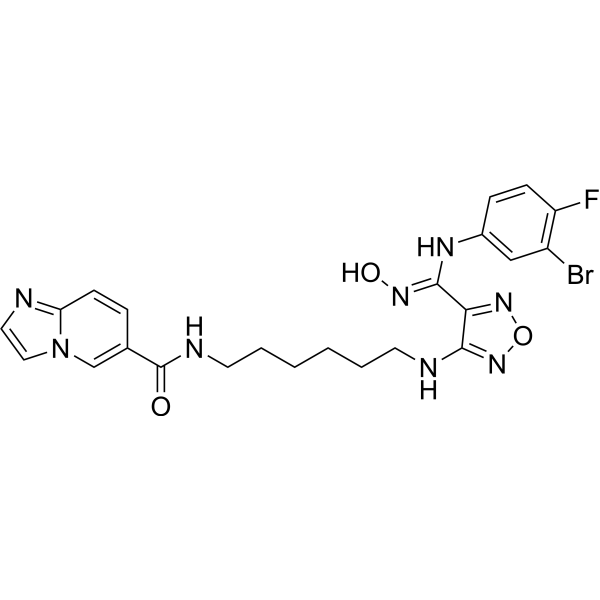
- HY-N0373
-
|
|
Amyloid-β
Apoptosis
NOD-like Receptor (NLR)
|
Neurological Disease
|
|
Licochalcone B is an extract from the root of Glycyrrhiza uralensis. Licochalcone B inhibits amyloid β (42) self-aggregation (IC50=2.16 μM) and disaggregate pre-formed Aβ42 fibrils, reduce metal-induced Aβ42 aggregation through chelating metal ionsLicochalcone B inhibits phosphorylation of NF-κB p65 in LPS signaling pathway. Licochalcone B inhibits growth and induces apoptosis of NSCLC cells. Licochalcone B specifically inhibits the NLRP3 inflammasome by disrupting NEK7‐NLRP3 interaction .
|
-
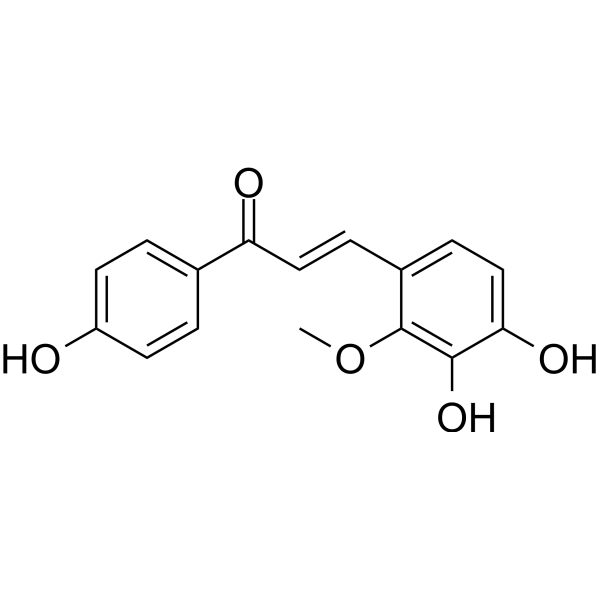
- HY-10261E
-
|
(R)-BIBW 2992
|
EGFR
c-Met/HGFR
p38 MAPK
|
Cancer
|
|
(R)-Afatinib ((R)-BIBW 2992) is the Afatinib isomer. Afatinib (HY-10261) is an orally active, potent and irreversible dual specificity inhibitor of ErbB family (EGFR and HER2), with IC50 values of 0.5 nM, 0.4 nM, 10 nM and 14 nM for EGFR wt, EGFR L858R, EGFR L858R/T790M and HER2, respectively. Afatinib can be used for the research of esophageal squamous cell carcinoma (ESCC), non-small cell lung cancer (NSCLC) and gastric cancer .
|
-
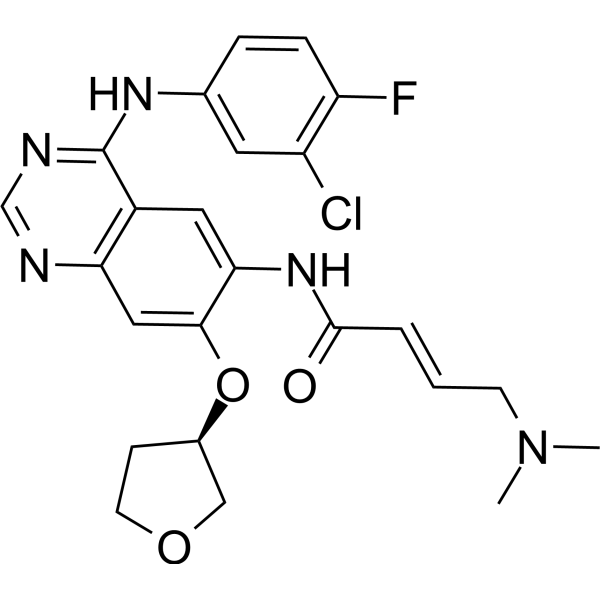
- HY-13270
-
|
E7010
|
Microtubule/Tubulin
Autophagy
Apoptosis
|
Cancer
|
|
ABT-751 (E7010) is a novel, highly orally bioavailable sulfonamides antimitotic compound and tubulin binder. It prevents tubulin aggregation by binding to the colchicine site on β-tubulin, leading to cell cycle arrest in G2/M phase and inducing apoptosis, thus effectively preventing cell division. ABT-751 induces autophagy by inhibiting the AKT/MTOR signaling pathway. ABT-751 showed significant inhibition against various types of cancer cells, including lung, gastric, colon, and breast cancer .
|
-
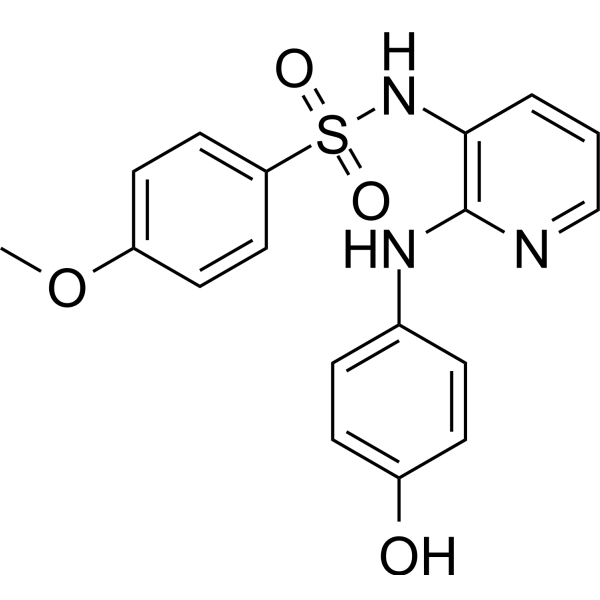
- HY-12215
-
|
PF-06463922
|
Anaplastic lymphoma kinase (ALK)
ROS Kinase
Apoptosis
|
Cancer
|
|
Lorlatinib (PF-06463922) is a selective, orally active, brain-penetrant and ATP-competitive ROS1/ALK inhibitor with anticancer activity. Lorlatinib has Kis of <0.025 nM, <0.07 nM, and 0.7 nM for ROS1, wild type ALK, and ALK L1196M, respectively. Lorlatinib targets to EML4-ALK, and inhibits ALK phosphorylation with IC50s of 15-43 nM (ALK L1196), 14-80 nM (ALK G1269A), 38-50 nM (ALK 1151Tins), 77-113 nM (ALK G1202R), respectively .
|
-
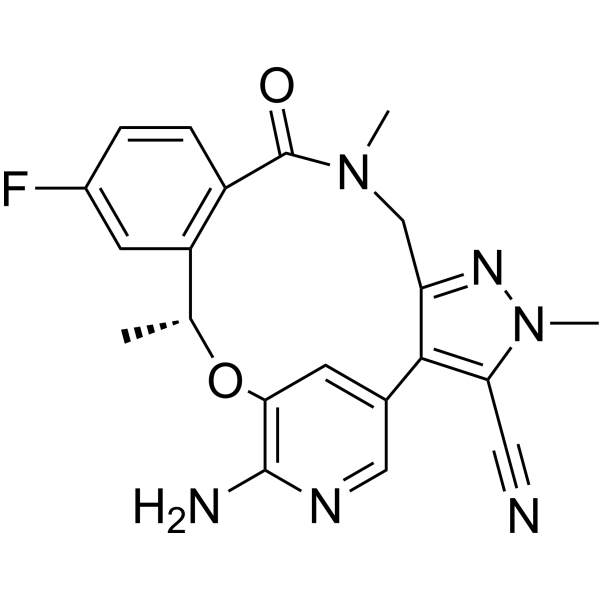
- HY-114277A
-
|
AMG-510 racemate
|
Ras
p38 MAPK
|
Cancer
|
|
Sotorasib racemate (Compound A) is an orally active racemate of Sotorasib (HY-114277), a covalent inhibitor of KRAS G12C mutant which induces adaptive feedback activation of MAPK pathway. Sotorasib racemate also exerts inhibitor activity against KRAS G12C induced cancer and can be applied to cancer research .
|
-
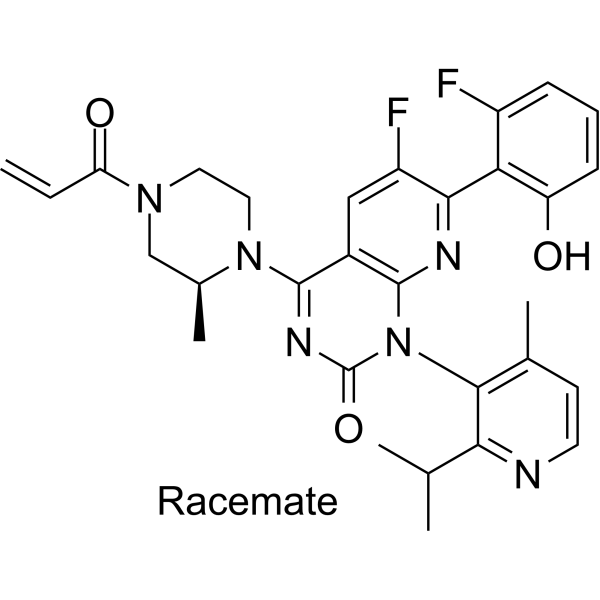
- HY-P9920
-
|
|
VEGFR
|
Cancer
|
|
Ramucirumab is a human VEGFR-2 antagonist for the treatment of solid tumors. Ramucirumab is a recombinant human immunoglobulin G1 monoclonal antibody that binds to the extracellular binding domain of VEGFR-2 and prevents the binding of VEGFR ligands: VEGF-A, VEGF-C, and VEGF-D. Ramucirumab is also an angiogenesis inhibitor .
|
-

- HY-N2359
-
|
|
Beta-lactamase
PKC
Bcl-2 Family
Apoptosis
Autophagy
|
Metabolic Disease
Inflammation/Immunology
Cancer
|
|
Chelerythrine is a natural alkaloid, acts as a potent and selective Ca 2+/phospholopid-dependent PKC antagonist, with an IC50 of 0.7 μM . Chelerythrine has antitumor, antidiabetic and anti-inflammatory activity . Chelerythrine inhibits the BclXL-Bak BH3 peptide binding with IC50 of 1.5 μM and displaces Bax from BclXL. Chelerythrine triggers apoptosis and autophagy .
|
-
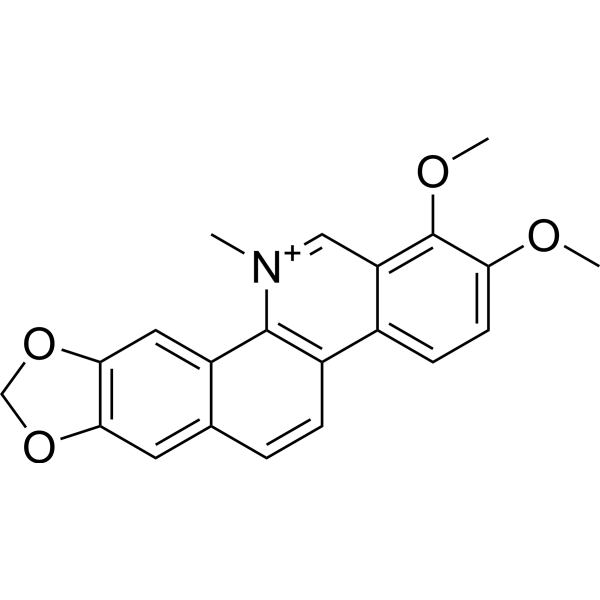
- HY-131067
-
|
|
EGFR
|
Cancer
|
|
EMI56, the derivative of EMI1, displays greater potency toward mutant EGFR than EMI1. EMI56 inhibits EGFR triple mutants .
|
-
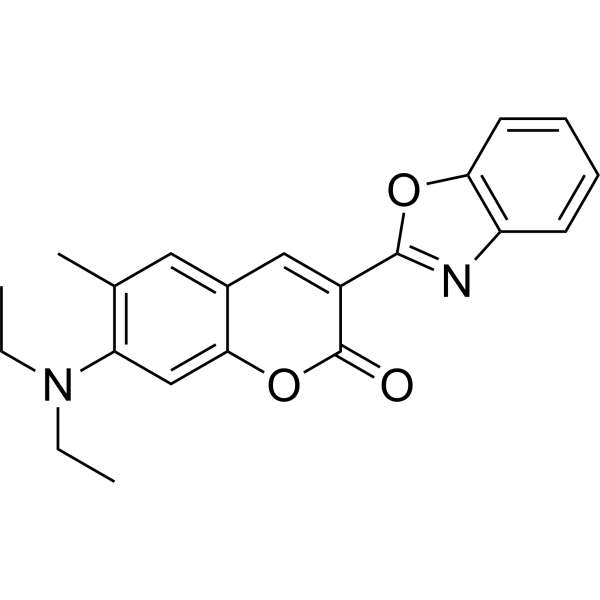
- HY-120574
-
|
|
ADC Cytotoxin
Topoisomerase
|
Cancer
|
|
TH1338 (compound 3b), an orally active camptothecin derivative and a potent chemotherapeutic agent for cancer, demonstrates excellent cytotoxic potency against human tumor cell lines in vitro. TH1338 (compound 3b) possesses significant brain penetration, favorable efflux pump properties, and hematological toxicity profile .
|
-
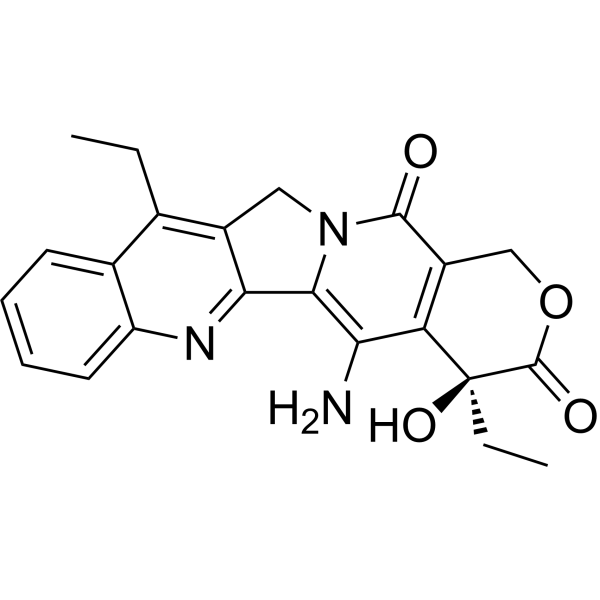
- HY-144361
-
|
|
Apoptosis
|
Cancer
|
|
Antitumor agent-44 (Compound 5n) disrupts the mitochondrial homeostasis, induces cell cycle arrest and apoptosis in human adenocarcinoma cells. Antitumor agent-44 (Compound 5n) possesses good anti-tumor activity in a lung-cancer-cell xenograft mice model .
|
-
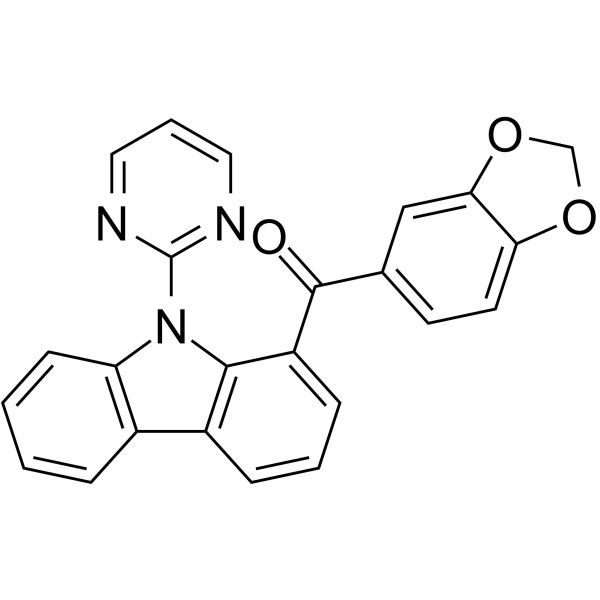
- HY-147413
-
|
TQ-B3101
|
EGFR
|
Cancer
|
|
Unecritinib (TQ-B3101) is a potent EGFR tyrosine kinase inhibitor. Unecritinib shows anticancer activity. Unecritinib inhibits ALK, ROS1, and MET. Unecritinib has the potential for the research of solid tumor and relapsed or refractory ALK-positive anaplastic large cell lymphoma .
|
-
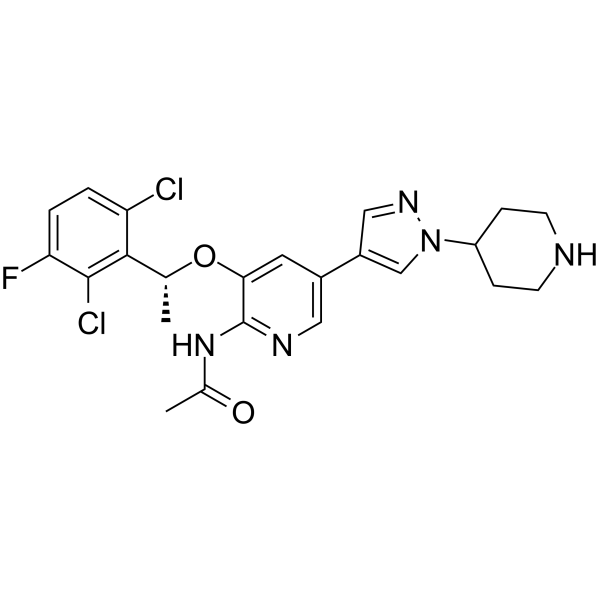
- HY-155005
-
|
|
EGFR
|
Cancer
|
|
EGFR mutant-IN-2 (Compound D51) is an EGFR mutant inhibitor. EGFR mutant-IN-2 inhibits the EGFR L858R/T790M/C797S mutant with an IC50 value of 14 nM. EGFR mutant-IN-2 inhibits the EGFR del19/T790M/C797S mutant with an IC50 value of 62 nM. EGFR mutant-IN-2 has favorable PK parameters, safety properties, in vivo stability, and antitumor activity .
|
-
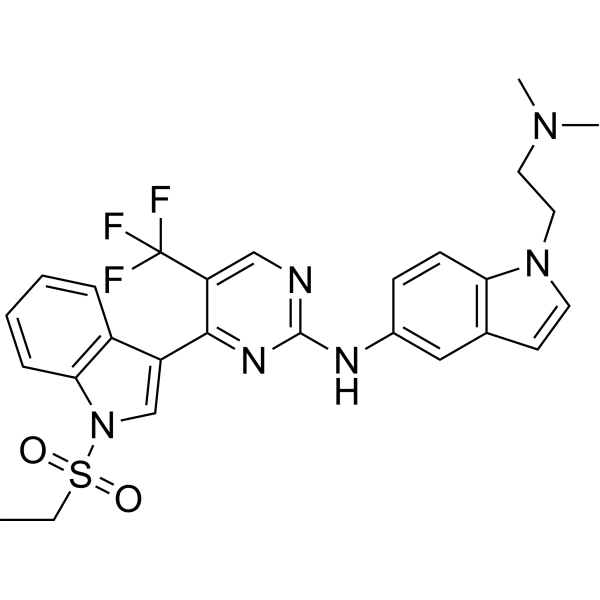
- HY-D2208
-
|
|
Fluorescent Dye
|
Others
|
|
binds to dsDNA, which emits green fluorescence. MVRGreen is suitable for staining live bacteria, including gram-positive and Gram-negative bacteria.
|
-
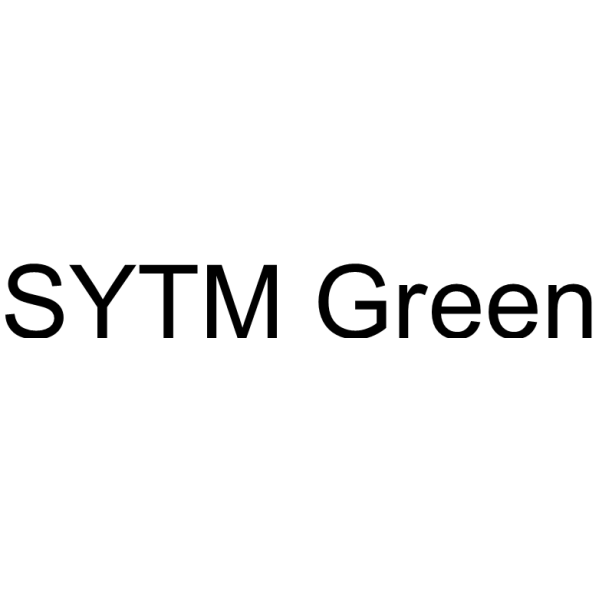
- HY-157413
-
|
|
EGFR
|
Cancer
|
|
YS-67 is a potent inhibitor of EGFR with an IC 50 of 5.2 nM. YS-67 significantly inhibits p-EGFR and p-AKT. YS-67 inhibits the proliferation of A549, PC-9, and A431cells with IC 50s of 4.1, 0.5, and 2.1 μM, respectively .
|
-
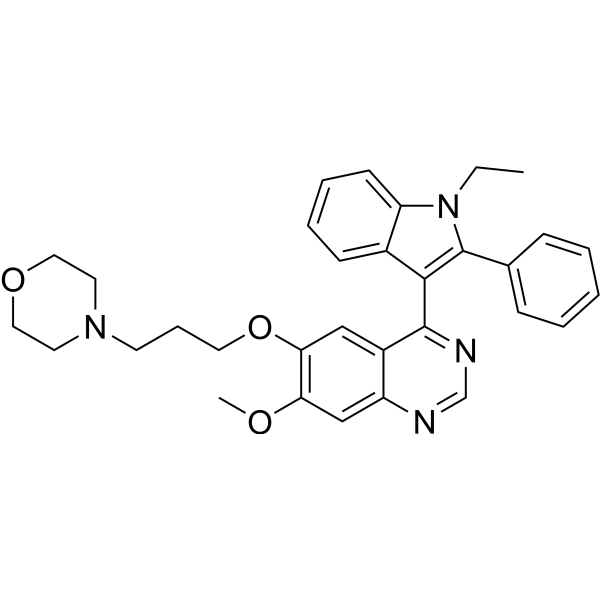
- HY-147858A
-
|
|
PROTACs
|
Cancer
|
|
PROTAC EGFR degrader 7 (compound 13b) is a potent and selective CRBN-recruiting PROTAC EGFRL858R/T790M degrader, with a DC50 of 13 .2 nM.PROTAC EGFR degrader 7 inhibits NCI-H1975 cells proliferation, with an IC50 of 46 .82 nM.PROTAC EGFR degrader 7 significantly induces apoptosis and G2/M phase arrest in NCI-H1975 cell.PROTAC EGFR degrader 7 shows antitumor activity, and can be used for non-small cell lung cancer (NSCLC) research .
|
-
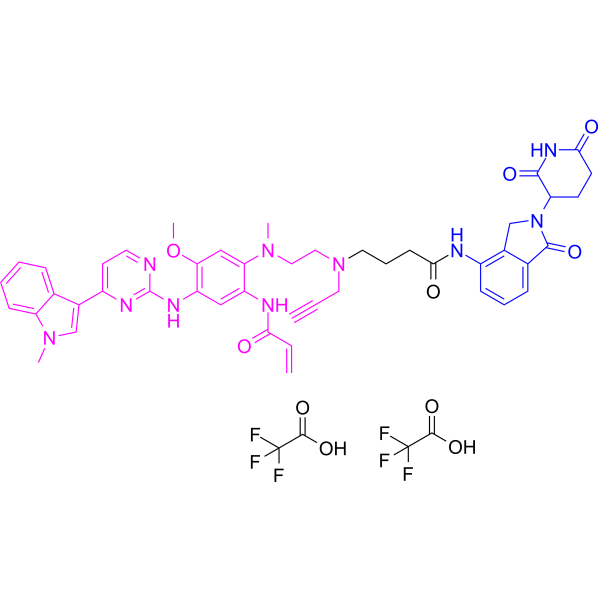
- HY-101522
-
|
|
EGFR
BMX Kinase
Btk
MEK
|
Cancer
|
|
CHMFL-EGFR-202 is a potent, irreversible inhibitor of epidermal growth factor receptor (EGFR) mutant kinase, with IC50s of 5.3 nM and 8.3 nM for drug-resistant mutant EGFR T790M and WT EGFR kinases, respectively. CHMFL-EGFR-202 exhibits ~10-fold selectivity for EGFR L858R/T790M against the EGFR wild-type in cells. CHMFL-EGFR-202 adopts a covalent “DFG-in-C-helix-out” inactive binding conformation with EGFR, with strong antiproliferative effects against EGFR mutant-driven nonsmall-cell lung cancer (NSCLC) cell lines .
|
-
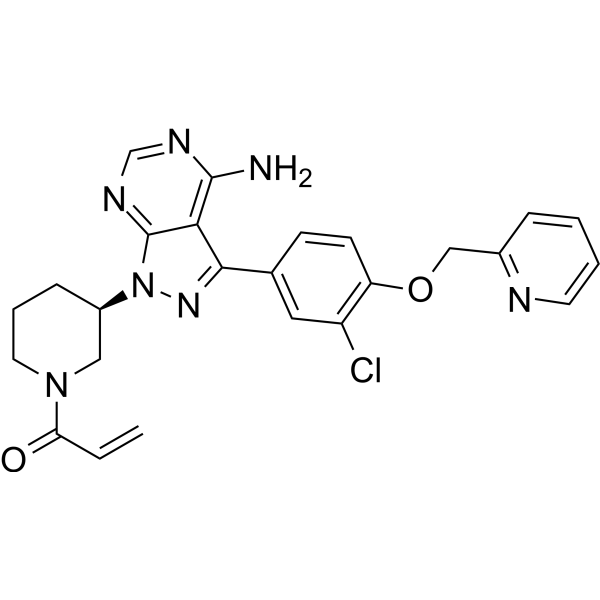
- HY-112299
-
|
TAS6417; CLN-081
|
EGFR
Apoptosis
|
Cancer
|
|
Zipalertinib (TAS6417; CLN-081) is a highly effective, orally active and pan-mutation-selective EGFR tyrosine kinase inhibitor with a unique scaffold fitting into the ATP-binding site of the EGFR hinge region, with IC50 values ranging from 1.1-8.0 nM .
|
-
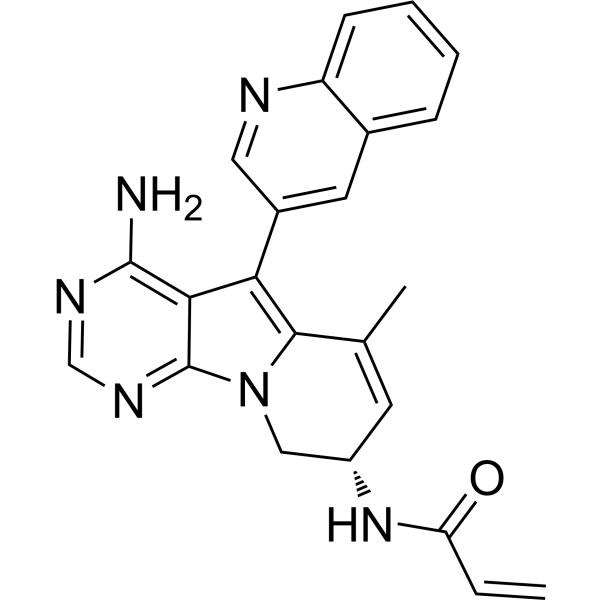
- HY-114277
-
|
AMG-510
|
Ras
|
Cancer
|
|
Sotorasib (AMG-510) is a first-in-class, orally bioavailable, and selective KRAS G12C covalent inhibitor. Sotorasib irreversibly inhibits KRAS G12C by locking it in an inactive GDP-bound state. Sotorasib is the first KRAS G12C inhibitor in clinical development and leads to the regression of KRAS G12C tumors .
|
-
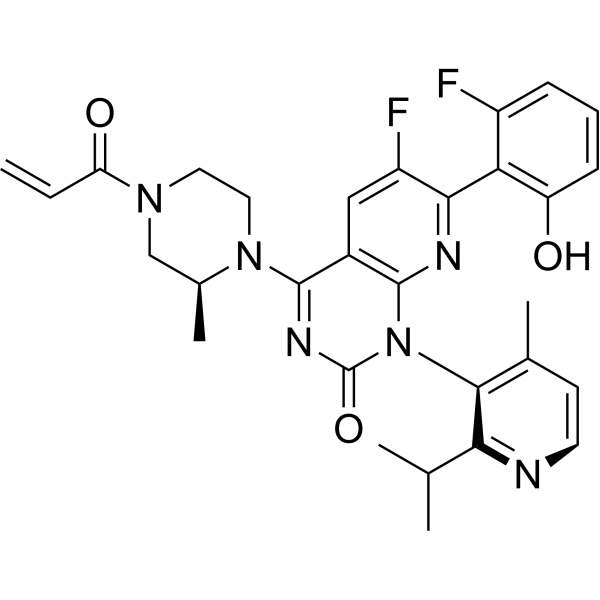
- HY-116000
-
|
Gumarontinib; SCC244
|
c-Met/HGFR
|
Cancer
|
|
Glumetinib (SCC244) is a highly selective, orally bioavailable, ATP-competitive c-Met inhibitor with an IC50 of 0.42 nM. Glumetinib has greater than 2400-fold selectivity for c-Met over those 312 kinases evaluated, including the c-Met family member RON and highly homologous kinases Axl, Mer, TyrO3. Antitumor activity .
|
-
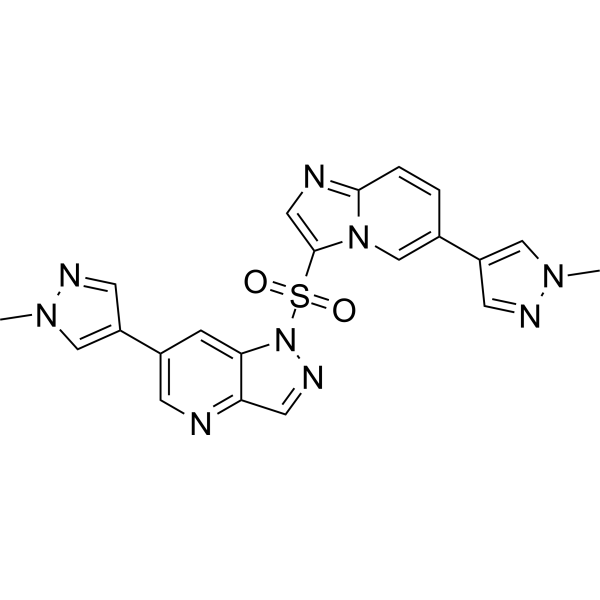
- HY-130616
-
|
|
EGFR
Apoptosis
|
Cancer
|
|
EGFR-IN-11 is a fourth-generation EGFR-tyrosine kinase inhibitor (EGFR-TKI) with an IC50 of 18 nM for triple mutant EGFR L858R/T790M/C797S. EGFR-IN-11 significantly suppresses the EGFR phosphorylation, induce the apoptosis, and arrest cell cycle at G0/G1 .
|
-
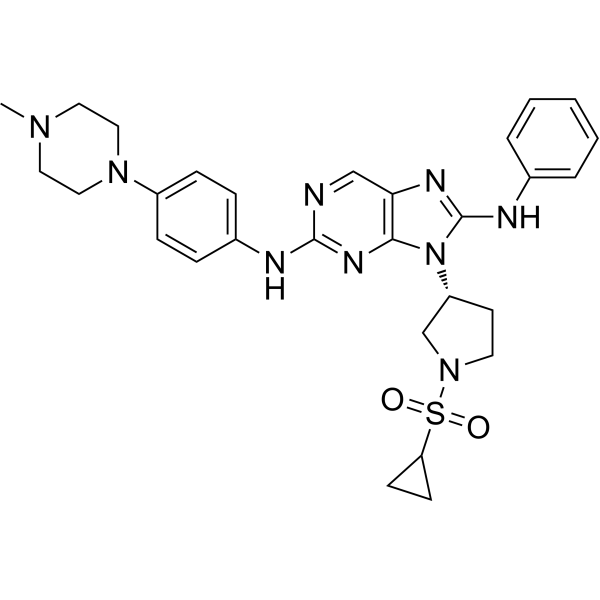
- HY-125265
-
|
|
Glucocorticoid Receptor
|
Metabolic Disease
|
|
JTP-117968, a novel selective glucocorticoid receptor modulator (a non-steroidal SGRM, IC50 of 6.8 nM), exhibits improved transrepression/transactivation dissociation .
|
-
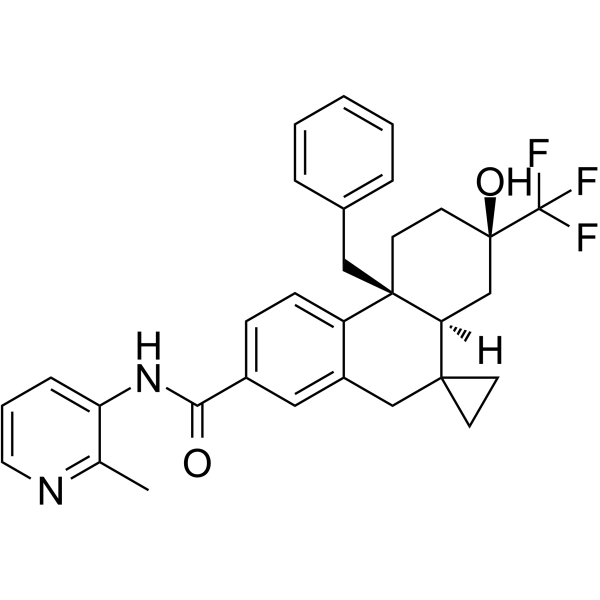
- HY-144685
-
|
|
ATM/ATR
|
Cancer
|
|
ATM Inhibitor-2 (compound 7) is a potent and selective ATM inhibitor, with an IC50 of <1 nM .
|
-
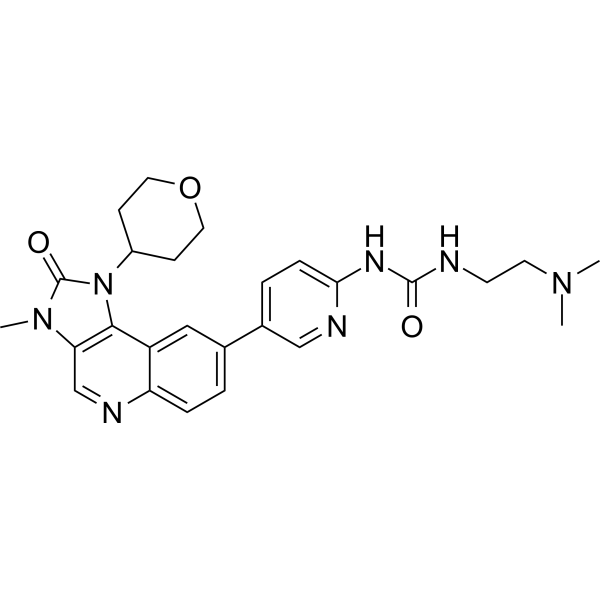
- HY-144686
-
|
|
ATM/ATR
PI3K
mTOR
|
Cancer
|
|
ATM Inhibitor-3 (compound 34) is a potent and selective ATM inhibitor, with an IC50 of 0.71 nM. ATM Inhibitor-3 shows inhibition of PI3K kinases family. ATM Inhibitor-3 exhibits favorable metabolic stability .
|
-
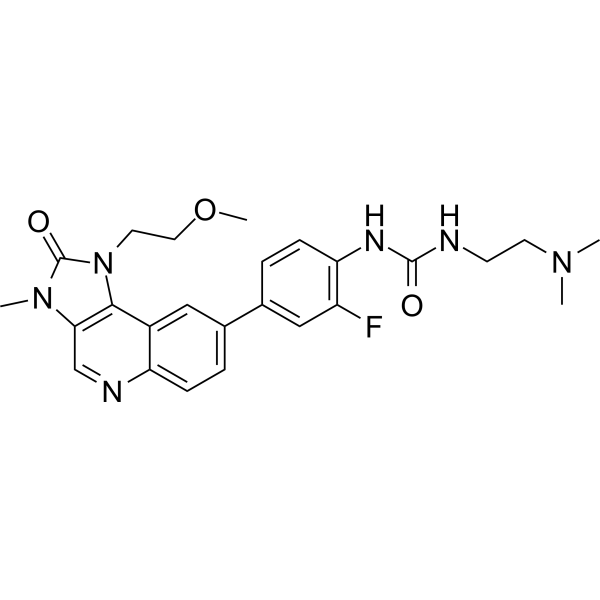
- HY-144687
-
|
|
ATM/ATR
PI3K
mTOR
|
Cancer
|
|
ATM Inhibitor-4 (compound 39) is a potent and selective ATM inhibitor, with an IC50 of 0.32 nM. ATM Inhibitor-4 shows stronger inhibition of PI3K kinases family. ATM Inhibitor-4 shows a full inhibition of mTOR at 1 μM. ATM Inhibitor-4 exhibits favorable metabolic stability .
|
-
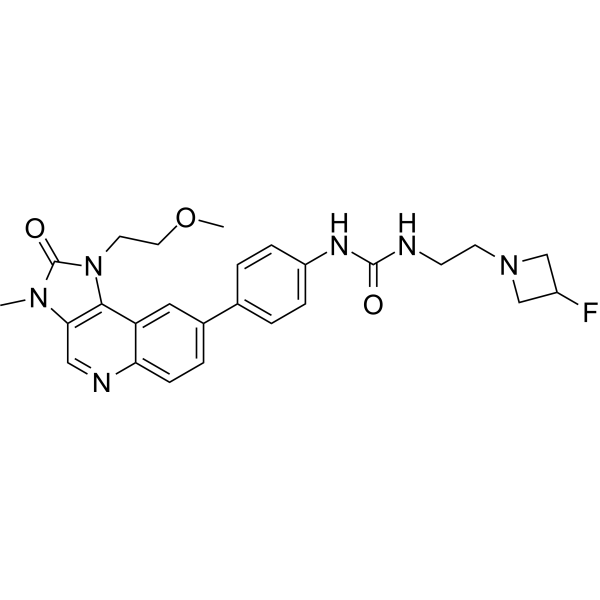
- HY-108932
-
|
Gemcitabine 5′-phosphate
|
Apoptosis
|
Cancer
|
|
Gemcitabine monophosphate (Gemcitabine 5′-phosphate) is one of the active intermediates of Gemcitabine (HY-17026). Gemcitabine monophosphate shows synergistic anti-cancer effects .
|
-
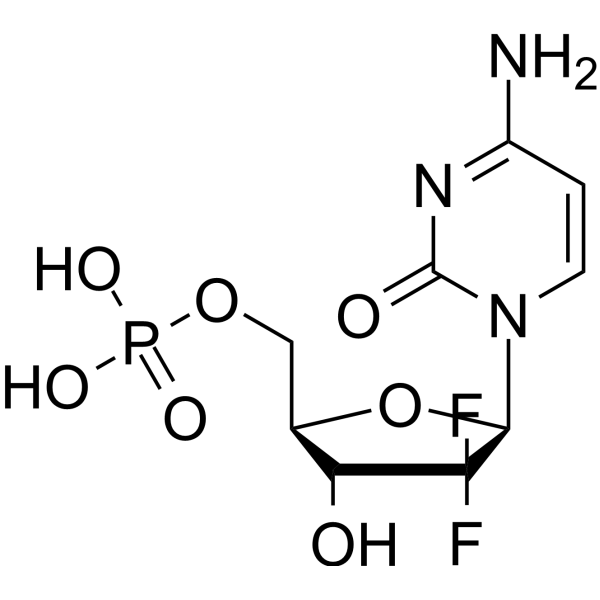
- HY-P99109
-
|
GLS-010; AB-122; WBP-3055
|
PD-1/PD-L1
|
Cancer
|
|
Zimberelimab (GLS-010) is a fully human IgG4 anti-PD-1 monoclonal antibody with an EC50 of 210 pM for human PD-1. Zimberelimab effectively blocks the binding of PD-L1 and PD-L2 to cell-surface PD-1 in CHO-S cells, with IC50 values of 580 pM and 670 pM, respectively. Zimberelimab shows antitumor activities, and can be used for various cancers research, including cervical cancer, non-small cell lung cancer and classical Hodgkin’s lymphoma .
|
-

- HY-156110
-
|
|
Insulin Receptor
|
Cancer
|
|
IGF2BP1-IN-1 (Compound A11) is a IGF2BP1 inhibitor and inhibits downstream signaling. IGF2BP1-IN-1 binds to IGF2BP1 protein with a KD value of 2.88 nM. IGF2BP1-IN-1 inhibits cancer cells proliferation (IC50: 9 nM for A549 cell, 34 nM for HCT116). IGF2BP1-IN-1 induces cancer cell apoptosis. GF2BP1-IN-1 inhibits tumor growth in A549 xenograft mouse model .
|
-
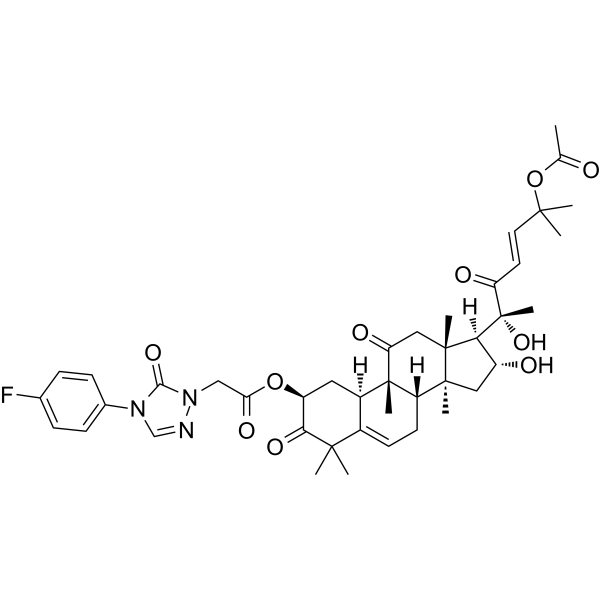
- HY-163006
-
|
|
EGFR
c-Met/HGFR
|
Cancer
|
|
EGFR/c-Met-IN-1 (compound TS-41) is a dual-target inhibitor of EGFR/c-Met. The IC50 for inhibiting EGFR L858R and c-Met is 68.1 nM and 0.26 nM respectively. . EGFR/c-Met-IN-1 induces apoptosis and cell cycle arrest in A549-P cells, downregulating the phosphorylation of EGFR, c-Met, and downstream AKT. EGFR/c-Met-IN-1 inhibits tumor growth in vitro and in vivo .
|
-
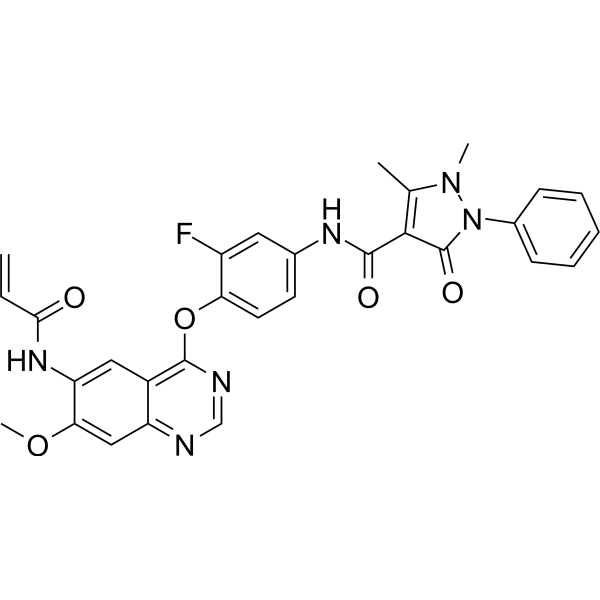
- HY-162034
-
|
|
FAK
|
Cancer
|
|
FAK-IN-17 is a focal adhesion kinase (FAK) inhibitor. FAK-IN-17 possesses anticancer activity against A549 and MDA-MB-231 cell lines with IC50 values of 130 nM and 94 nM .
|
-
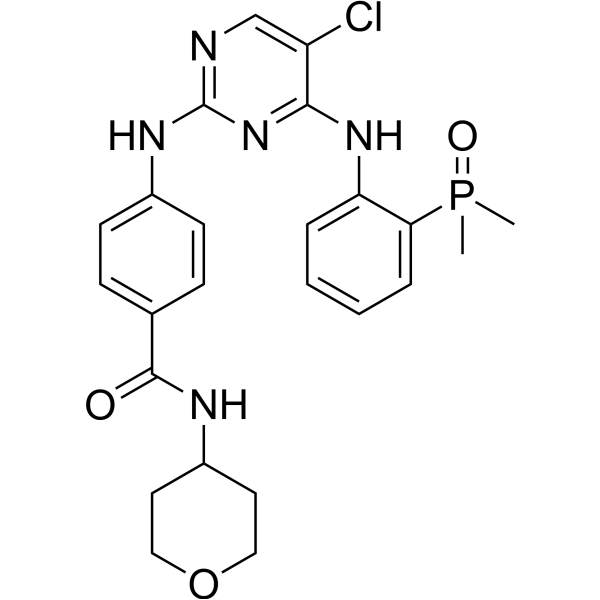
- HY-157579
-
|
|
EGFR
|
Cancer
|
|
MS154N (compound 28) is the negative control of MS39 (HY-157581). MS39 is a potent and selective EGFR degrader. MS39 reduces the expression of EGFR and downstream signaling in HCC-827 and H3255 cells .
|
-
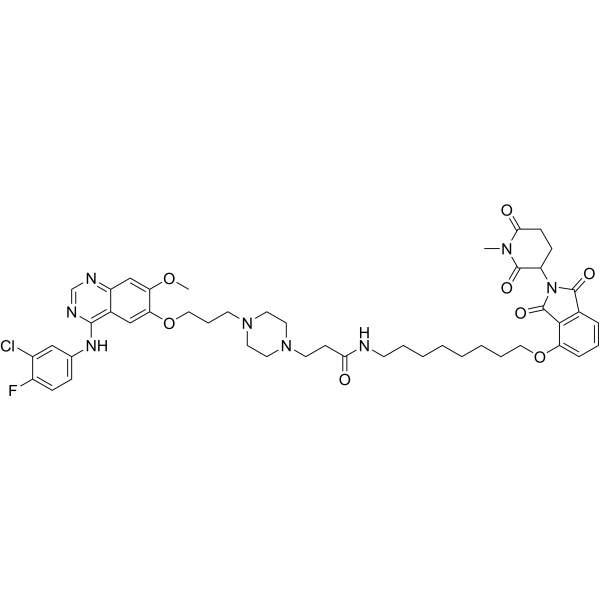
- HY-157581
-
|
|
EGFR
|
Cancer
|
|
MS39 (compound 6) is a potent and selective EGFR degrader. MS39 reduces the expression of EGFR and downstream signaling in HCC-827 and H3255 cells. MS39 inhibits the proliferation of H3255 cells .
|
-
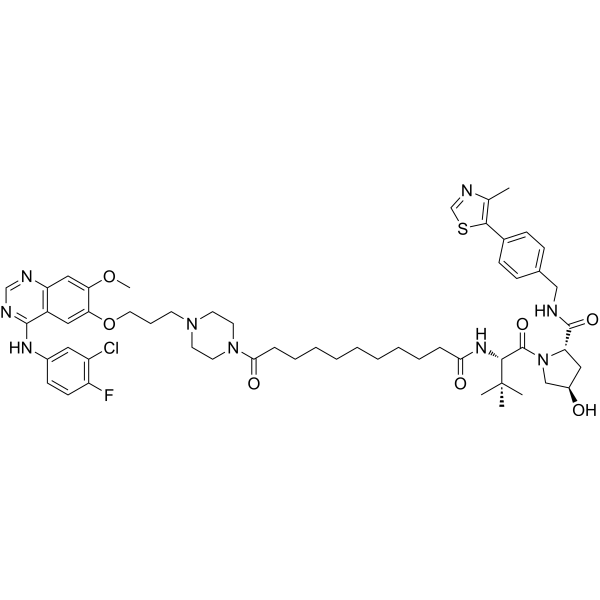
- HY-135890
-
-
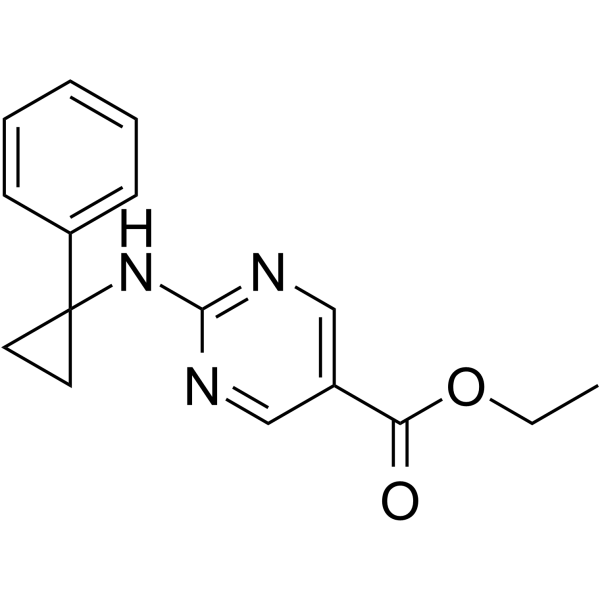
- HY-136174
-
|
|
PARP
|
Cancer
|
|
RBN-2397 is a potent, accross species and orally active NAD + competitive inhibitor of PARP7 (IC50<3 nM). RBN-2397 selectively binds to PARP7 (Kd=0.001 μM) and restores IFN signaling. RBN-2397 has the potential for the study of advanced or metastatic solid tumors .
|
-
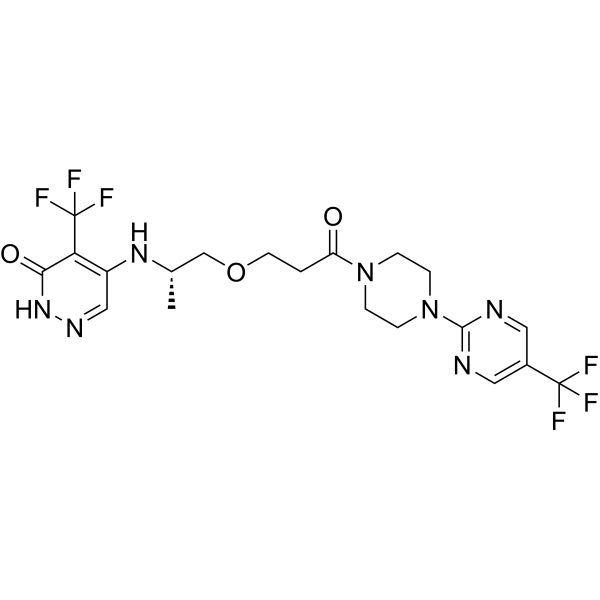
- HY-19617B
-
|
|
EGFR
|
Cancer
|
|
EGFR-IN-1 TFA is an orally active and irreversible L858R/T790M mutant selective EGFR inhibitor. EGFR-IN-1 TFA potently inhibits Gefitinib-resistant EGFR L858R, T790M with 100-fold selectivity over wild-type EGFR. EGFR-IN-1 TFA displays strong antiproliferative activity against the H1975 cells and the first line mutant HCC827 cells. Antitumor activity .
|
-
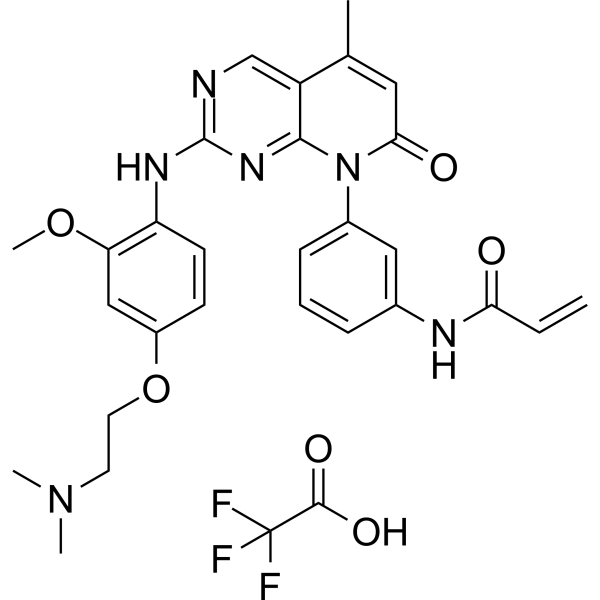
- HY-123986
-
|
|
Mitochondrial Metabolism
|
Inflammation/Immunology
Cancer
|
|
CTPI-2 is a third-generation mitochondrial citrate carrier SLC25A1 inhibitor with a KD of 3.5 μM. CTPI-2 inhibits glycolysis, PPARγ, and its downstream target the glucose transporter GLUT4. CTPI-2 halts salient alterations of NASH reverting steatosis, preventing the evolution to steatohepatitis, reducing inflammatory macrophage infiltration in the liver and adipose tissue, and starkly mitigating obesity induced by a high-fat diet. Antitumor activity .
|
-
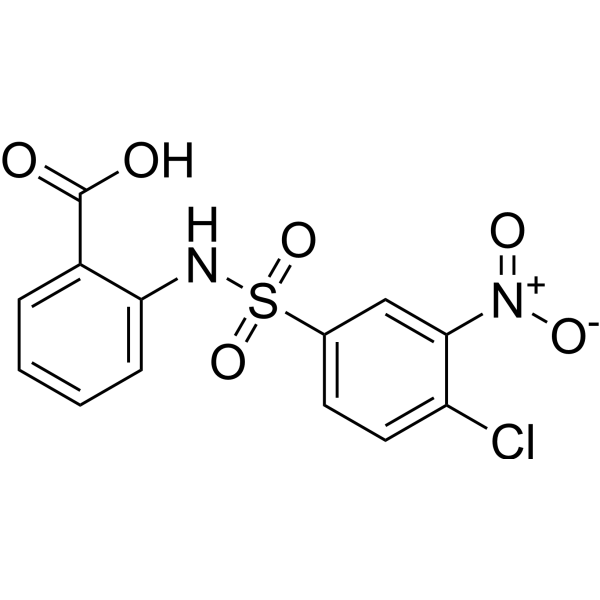
- HY-19617A
-
|
|
EGFR
|
Cancer
|
|
EGFR-IN-1 hydrochloride is an orally active and irreversible L858R/T790M mutant selective EGFR inhibitor. EGFR-IN-1 hydrochloride potently inhibits Gefitinib-resistant EGFR L858R, T790M with 100-fold selectivity over wild-type EGFR. EGFR-IN-1 hydrochloride displays strong antiproliferative activity against the H1975 cells and the first line mutant HCC827 cells. Antitumor activity .
|
-
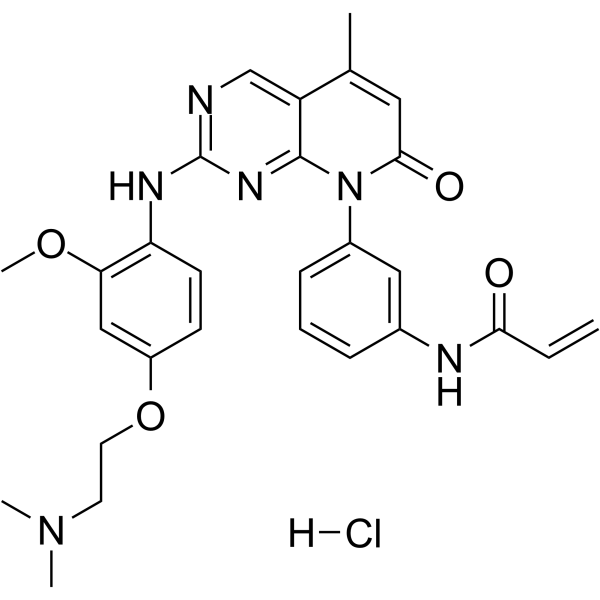
- HY-113471
-
|
|
Apoptosis
HSV
|
Infection
Inflammation/Immunology
Cancer
|
|
Perillic acid is the metabolite of Perillyl alcohol (HY-N7000). Perillic acid induces lung cancer cell cycle arrest and apoptosis. Perillic acid shows anti-HSV-1 and immunomodulatory activities .
|
-
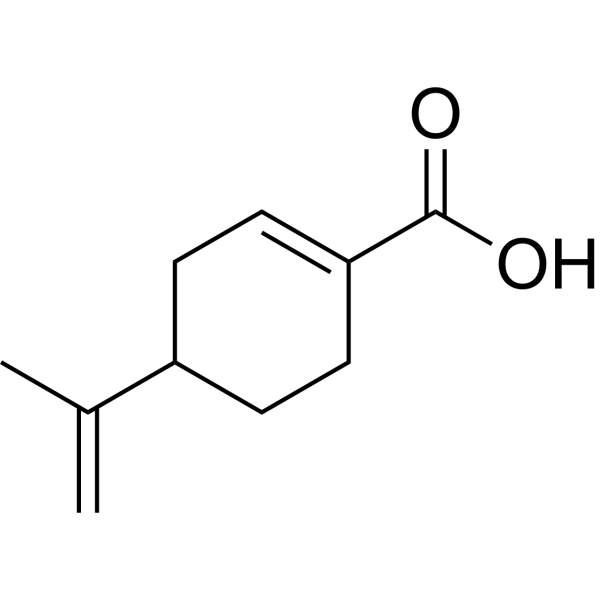
- HY-155721
-
|
22-(4′-Pyridinecarbonyl) jorunnamycin A
|
Akt
mTOR
|
Cancer
|
|
22-(4′-py)-JA is a semisynthetic derivative of junamycin A (JA) that can be isolated from the Thai blue sponge (Xestospongia sp.). 22-(4′-py)-JA has antimetastatic activity and can inhibit AKT/mTOR/p70S6K signaling. 22-(4′-py)-JA inhibits tumor cell invasion and tube formation in human umbilical vein endothelial cells (HUVEC), downregulates metalloproteinases (MMP-2 and MMP-9), hypoxia-inducible factor 1α (HIF-1α) and vascular endothelial growth factor (VEGF). 22-(4′-py)-JA has potent anticancer activity against non-small cell lung cancer (NSCLC) .
|
-
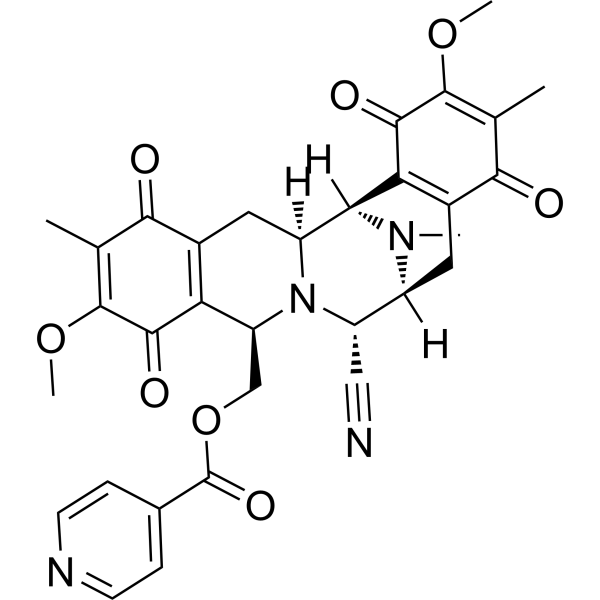
- HY-136173
-
|
TNO155
|
SHP2
Phosphatase
|
Cancer
|
|
Batoprotafib (TNO155) is a potent selective and orally active allosteric inhibitor of wild-type SHP2 (IC50=0.011 µM). Batoprotafib has the potential for the study of RTK-dependent malignancies, especially advanced solid tumors .
|
-
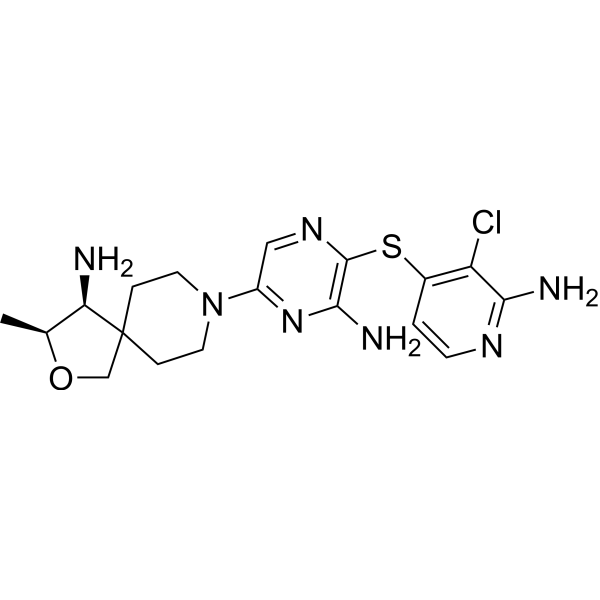
- HY-W011434
-
|
TGIC; Teroxirone
|
MDM-2/p53
Apoptosis
|
Inflammation/Immunology
Cancer
|
|
Triglycidyl isocyanurate (TGIC; Teroxirone) is a triazene triepoxide with antiangiogenic and antineoplastic activities. Triglycidyl isocyanurate inhibits the growth of non-small-cell-lung cancer cells via p53 activation. Triglycidyl isocyanurate induces cell apoptosis. Triglycidyl isocyanurate can be used for cancer research .
|
-
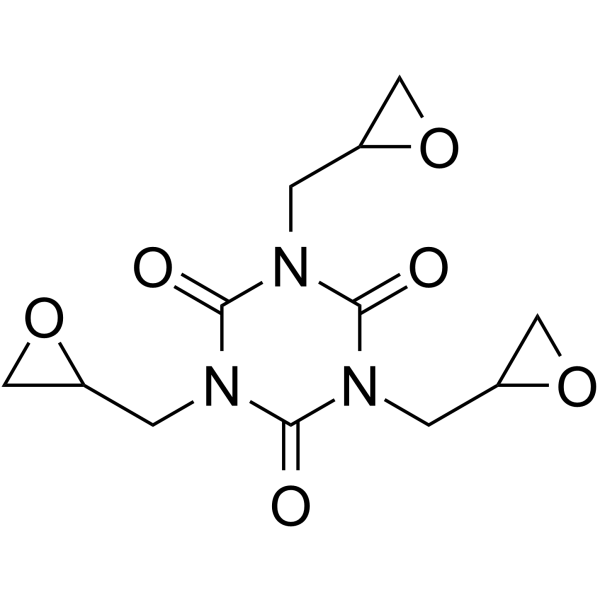
- HY-P99108
-
-

- HY-P99114
-
|
|
PD-1/PD-L1
|
Cancer
|
|
Sugemalimab is a fully human, full length, anti-programmed death ligand 1 (PD-L1) immunoglobulin G4 (IgG4) monoclonal antibody (mAb). Sugemalimab shows anticancer activities and can be used for non-small cell lung cancer research .
|
-

- HY-P99284
-
|
MK-0646; h7C10
|
IGF-1R
Apoptosis
|
Cancer
|
|
Dalotuzumab (MK-0646) is a recombinant humanized monoclonal antibody (IgG1 type) targeting IGF-1R. Dalotuzumab acts by inhibiting IGF-1- and IGF-2-mediated tumor cell proliferation, IGF-1R autophosphorylation, and Akt phosphorylation. Dalotuzumab also induces apoptosis and cycle arrest. Dalotuzumab in combination with other anticancer agents such as statins can enhance the antitumor activity of Dalotuzumab in vitro and in vivo .
|
-

- HY-155522
-
|
|
Carbonic Anhydrase
|
Cancer
|
|
WES-1 (Compound 8g) is an inhibitor of carbonic anhydrase IX (Ki: 55.9 μM). WES-1 has broad spectrum anti-proliferative activity against the cancer cells, such as leukemia (K-562 and MOLT-4), non-small cell lung cancer (NCI–H460), colon cancer (HCT 116 and HCT-15) and melanoma (LOX IMVI) cell lines .
|
-
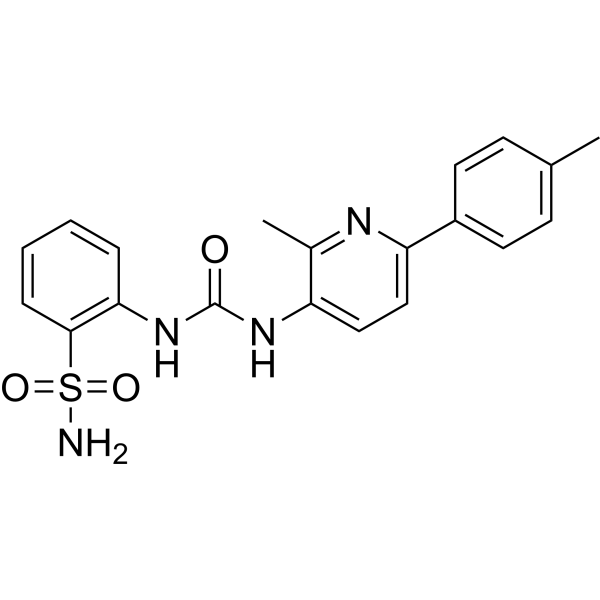
- HY-155039
-
|
|
Others
|
Cancer
|
|
Antitumor agent-105 (Compound 37) is an antitumor agent. Antitumor agent-105 has antitumor activity against A549, H1299, H460, HCT116, MDA-MB-231 cells, with IC50 values of 6.7, 8.3, 4.3, 4.4, 6.7 μM respectively .
|
-
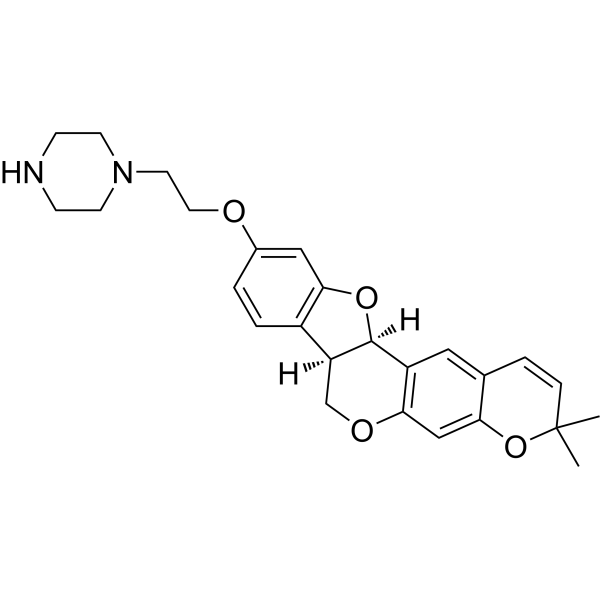
- HY-112823B
-
|
HS-10296 hydrochloride
|
EGFR
|
Cancer
|
|
Almonertinib (HS-10296) hydrochloride is an orally available, irreversible, third-generation EGFR tyrosine kinase inhibitor with high selectivity for EGFR-sensitizing and T790M resistance mutations. Almonertinib hydrochloride shows great inhibitory activity against T790M, T790M/L858R and T790M/Del19 (IC50: 0.37, 0.29 and 0.21 nM, respectively), and is less effective against wild type (3.39 nM). Almonertinib hydrochloride is used for the research of the non-small cell lung cancer .
|
-
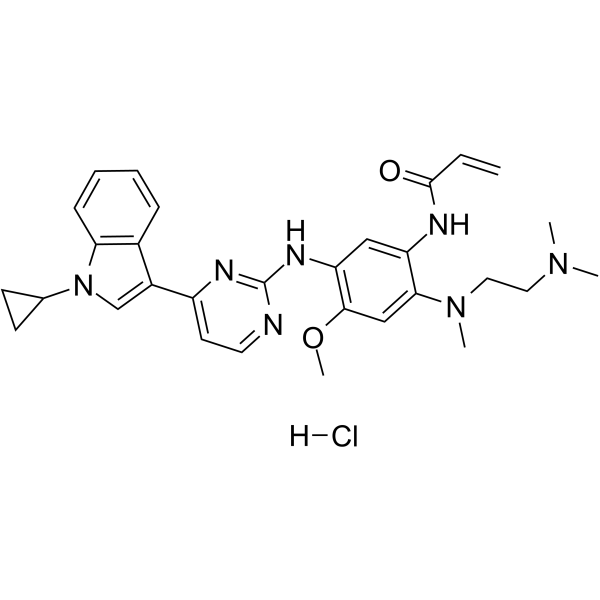
- HY-W004284
-
-
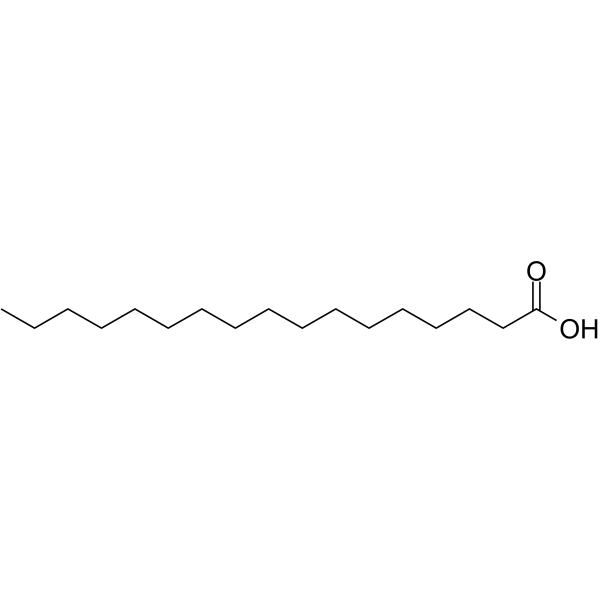
- HY-N2278
-
|
Leachianone E
|
Tyrosinase
Glucosidase
|
Cancer
|
|
Kushenol A (Leachianone E) is isolated from the root of Sophora flavescent. Kushenol A is a non-competitive tyrosinase inhibitor to block the conversion of L-tyrosine to L-DOPA, shows IC50 and Kivalues of 1.1 μM and 0.4 μM, respectively . Kushenol A is a flavonoid antioxidant, has inhibitory effects on alpha-glucosidase (IC50: 45 μM; Ki: 6.8 μM) and β-amylase . Kushenol A is confirmed as potential inhibitors of enzymes targeted by cosmetics for skin whitening and aging .
|
-
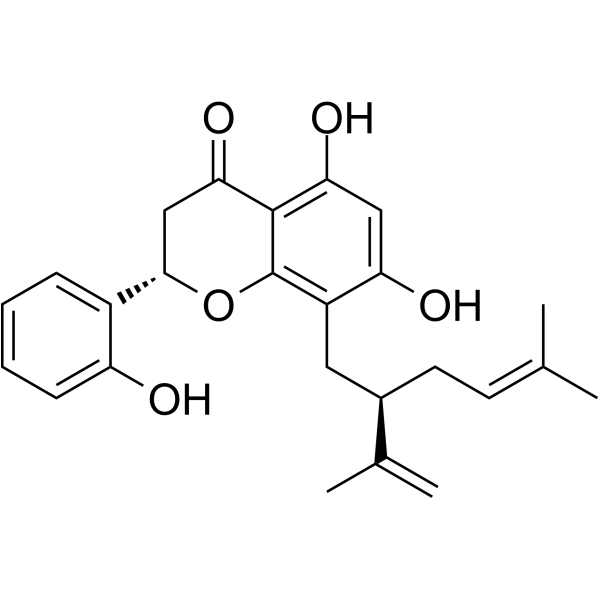
- HY-112823
-
|
HS-10296
|
EGFR
|
Cancer
|
|
Almonertinib (HS-10296) is an orally available, irreversible, third-generation EGFR tyrosine kinase inhibitor with high selectivity for EGFR-sensitizing and T790M resistance mutations. Almonertinib shows great inhibitory activity against T790M, T790M/L858R and T790M/Del19 (IC50: 0.37, 0.29 and 0.21 nM, respectively), and is less effective against wild type (3.39 nM). Almonertinib is used for the research of the non-small cell lung cancer .
|
-
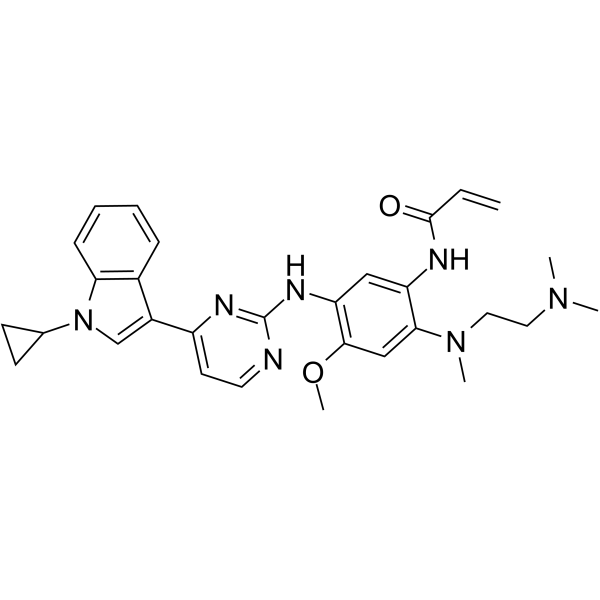
- HY-137605
-
|
|
Others
|
Cancer
|
|
WSF1-IN-1 (compound 136), an orally active WSF1 inhibitor, can be used in the study for WSF1 (Wolfram syndrome) related tumors, with IC50 values of 0.33 μM and >27 μM in HepG2 parental and HepG2 WFS1 KO cell lines, respectively .
|
-
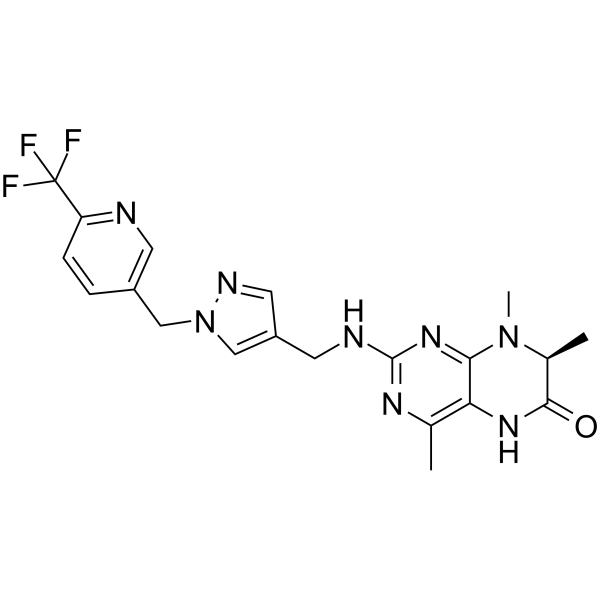
- HY-145844
-
|
|
EGFR
Apoptosis
|
Cancer
|
|
EGFR-IN-44 (Compound 6a) is a potent, orally active EGFR tyrosine kinase inhibitor with an IC50 of 4.11 nM. EGFR-IN-44 induces cell apoptosis and shows an oral bioavailability value of 33.57%. EGFR-IN-44 can be studied for non-small-cell lung cancers .
|
-
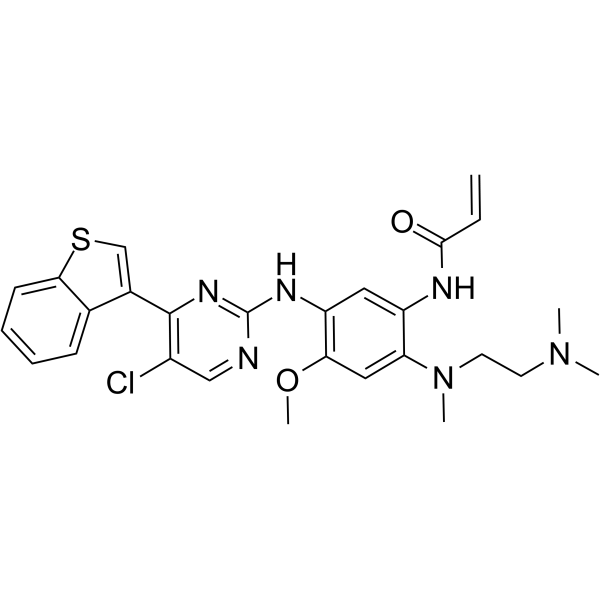
- HY-150774
-
|
|
HDAC
HSP
Apoptosis
|
Cancer
|
|
HDAC6/HSP90-IN-2 (compound 6e) is a dual inhibitor of HDAC6 and Hsp90, with IC50s of 105.7 and 61 nM, respectively. HDAC6/HSP90-IN-2 can be used for the research of cancer .
|
-
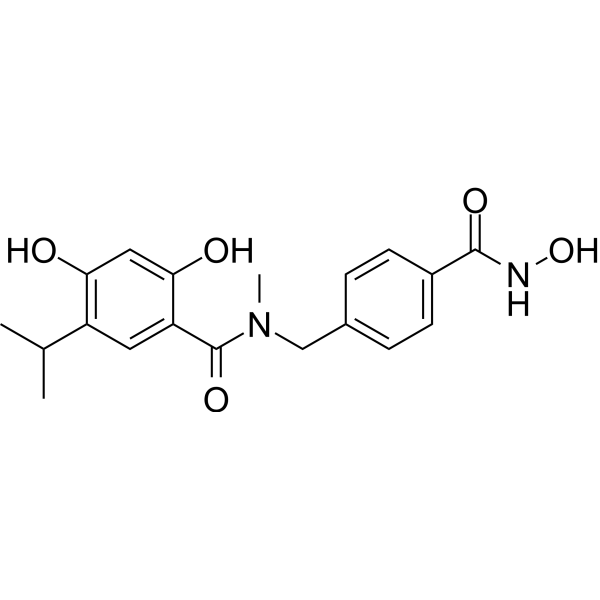
- HY-10824
-
|
PT523
|
Antifolate
Dihydrofolate reductase (DHFR)
|
Cancer
|
|
Talotrexin (PT523), an analog of Aminopterin (HY-14518), is a nonpolyglutamatable classic antifolate. Talotrexin is a RFC (reduced folate carrier) specific inhibitor and selectively inhibits RFC transport. Talotrexin shows antitumor activity by targeting DHFR to inhibit tumor growth .
|
-
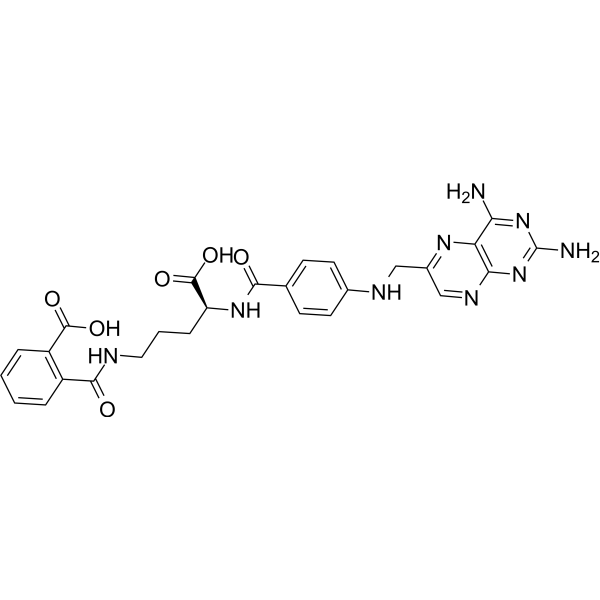
- HY-50895
-
Gefitinib
Maximum Cited Publications
112 Publications Verification
ZD1839
|
EGFR
Autophagy
Apoptosis
|
Cancer
|
|
Gefitinib (ZD1839) is a potent, selective and orally active EGFR tyrosine kinase inhibitor with an IC50 of 33 nM. Gefitinib selectively inhibits EGF-stimulated tumor cell growth (IC50 of 54 nM) and that blocks EGF-stimulated EGFR autophosphorylation in tumor cells. Gefitinib also induces autophagy and cell apoptosis, which can be used for cancer related research, such as Lung cancer and breast cancer .
|
-
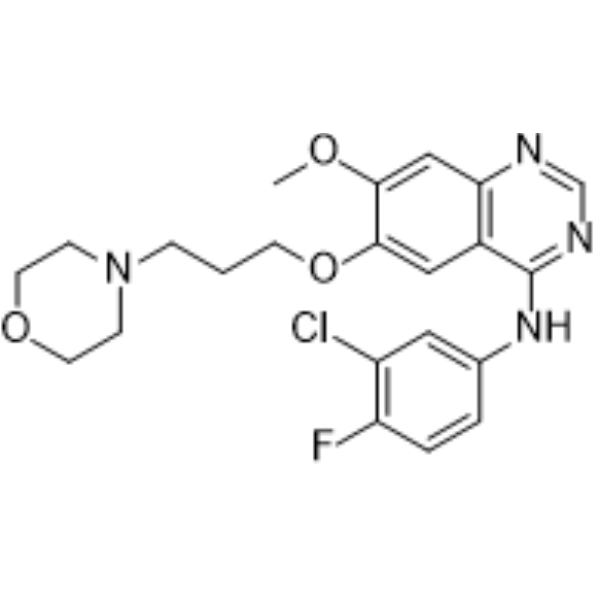
- HY-139920A
-
|
SH-1028 mesylate
|
EGFR
|
Cancer
|
|
Oritinib (SH-1028) mesylate is a selective, orally active, and pyrimidine-based irreversible inhibitor of EGFR with an IC50 of 18 nM. Oritinib (SH-1028) mesylate exhibits potent activity against EGFR sensitive and resistant (T790 M) mutations. Oritinib (SH-1028) mesylate significantly inhibits proliferation of tumor cells with EGFR sensitive and resistant mutation .
|
-
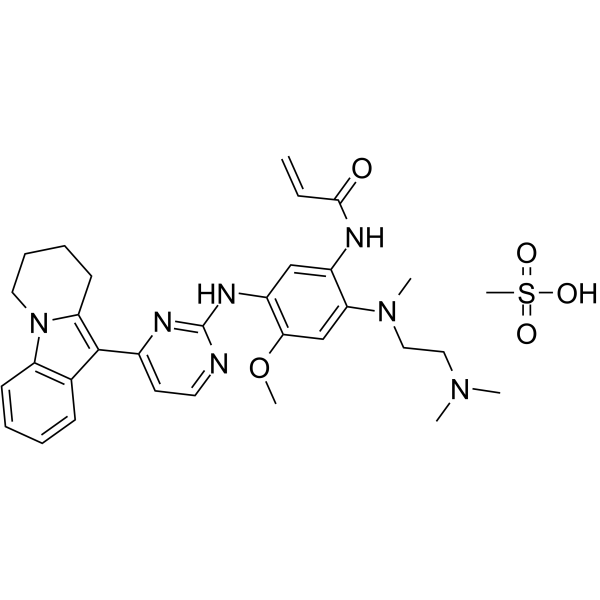
- HY-114842
-
|
|
Others
|
Cancer
|
|
TDRL-551 is a potent replication protein A (RPA) inhibitor (IC50=18 µM). TDRL-551 inhibits RPA-DNA interaction and increases the efficacy of Platinum (Pt)-based chemotherapy in lung and ovarian cancer. RPA plays essential roles in both nucleotide excision repair (NER) and homologous recombination (HR), along with its role in DNA replication and DNA damage checkpoint activation .
|
-
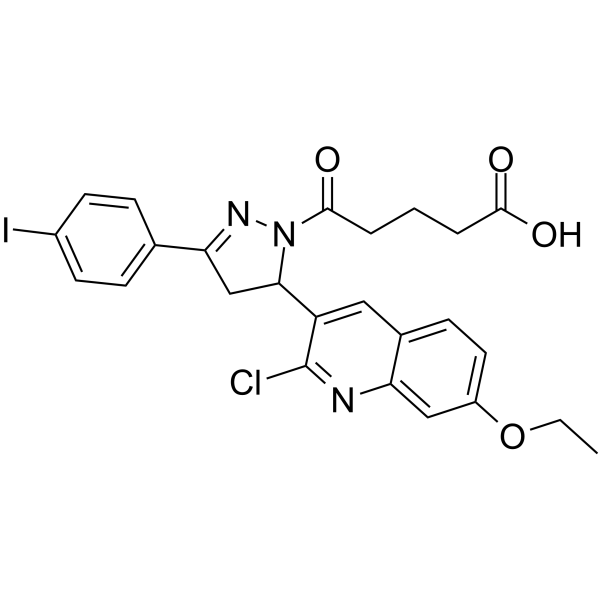
- HY-139612
-
|
JDQ-443; NVP-JDQ443
|
Ras
PERK
|
Cancer
|
|
Opnurasib (JDQ-443) (NVP-JDQ443) is an orally active, potent, selective, and covalent KRAS G12C inhibitor (extracted from patent WO2021120890A1). Opnurasib shows antitumor activity .
|
-
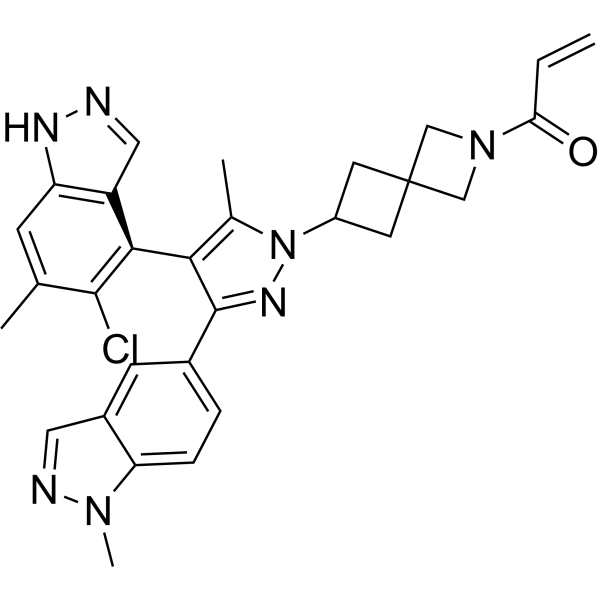
- HY-120275
-
|
|
Bcl-2 Family
Apoptosis
|
Cancer
|
|
CYD-2-11 is a selective Bax agonist with a Ki value of 34.1 nM. CYD-2-11 induces cell apoptosis and shows antiproliferative activity to breast cancer MDA-MB-231 and MCF-7 cell lines with IC50 values of 3.22 and 3.81 μM, respectively. CYD-2-11 suppresses tumor growth in MDA-MB-231 tumor models. CYD-2-11 can be used for the research of breast and lung cancer .
|
-
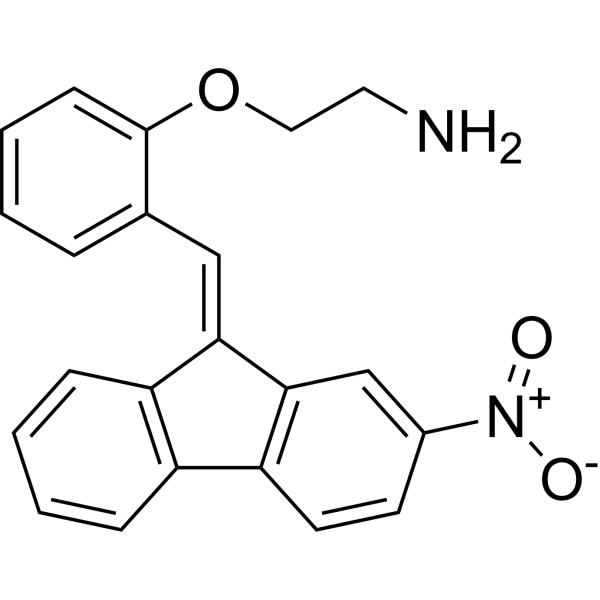
- HY-139612A
-
|
(S)-NVP-JDQ443
|
Ras
PERK
|
Cancer
|
|
(S)-JDQ-443 is an isomer of JDQ-443 (HY-139612). JDQ-443 is an orally active, potent, selective, and covalent KRAS G12C inhibitor (extracted from patent WO2021120890A1). JDQ-443 shows antitumor activity .
|
-
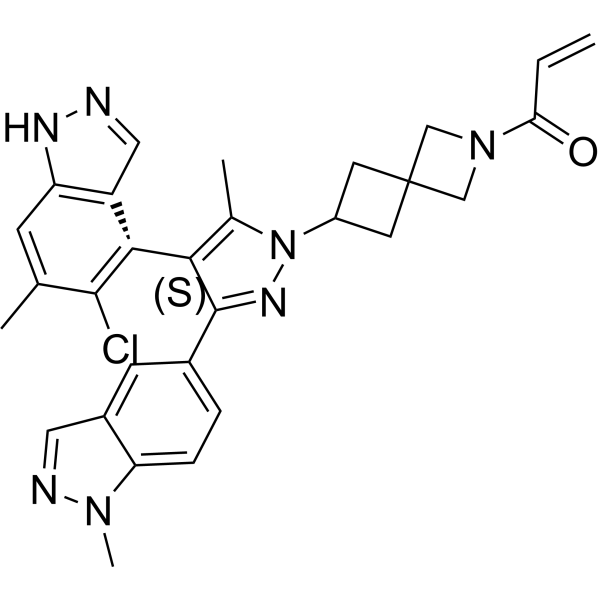
- HY-108016
-
|
Encordin
|
Src
PI3K
JNK
STAT
EGFR
Apoptosis
Autophagy
|
Cancer
|
|
Peruvoside is a potent inhibitor of Src, PI3K, JNK, STAT, and EGFR. Peruvoside induces apoptosis and autophagy and possesses a broad spectrum of anticancer activity in breast, lung, liver cancers and leukemia. Peruvoside is a broad-spectrum and potent antiviral activity against positive-sense RNA viruses. Peruvoside sensitizes Gefitinib (HY-50895)-resistant tumour cells (A549, PC9/gef and H1975) to Gefitinib .
|
-
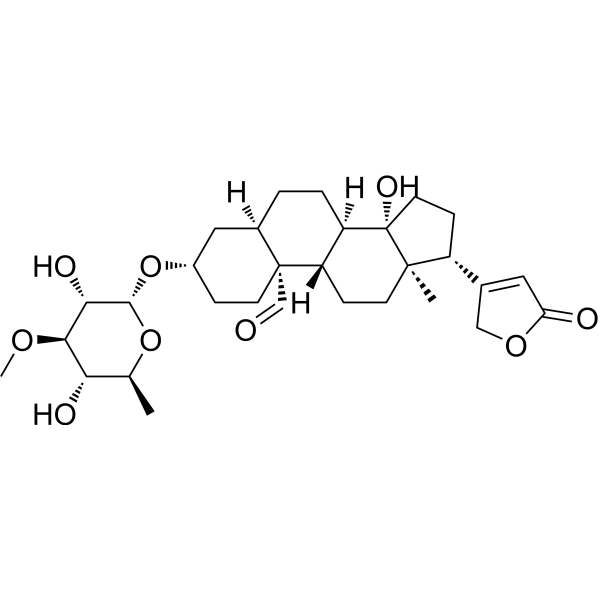
- HY-107513
-
|
|
mGluR
|
Neurological Disease
Cancer
|
|
BAY 36-7620 is a potent and noncompetitive antagonist of mGlu1 Receptor (IC50=0.16 μM) with inverse agonist activity. BAY 36-7620 inhibits tumor growth and prolongs the survival of mice with tumors by inhibiting mGlu1 receptor. BAY 36-7620 suppresses AKT phosphorylation in A549 tumors. BAY 36-762 has neuroprotective effect in acute subdural hematoma rat model.BAY 36-7620 is used in non-small cell lung cancer and breast cancer research .
|
-
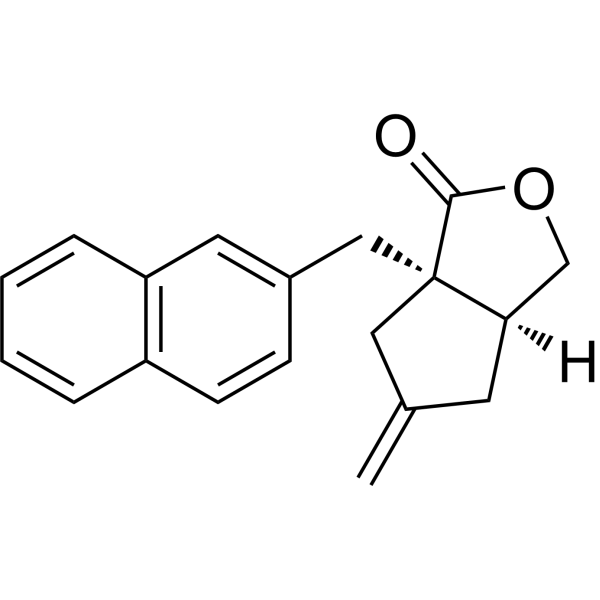
- HY-120508
-
|
AN-9; Pivalyloxymethyl butyrate
|
HDAC
Bcr-Abl
Apoptosis
|
Inflammation/Immunology
Cancer
|
|
Pivanex (AN-9), a derivative of Butyric acid, is an orally active HDAC inhibitor. Pivanex down-regulates bcr-abl protein and enhances apoptosis. Pivanex has antimetastic and antiangiogenic properties .
|
-
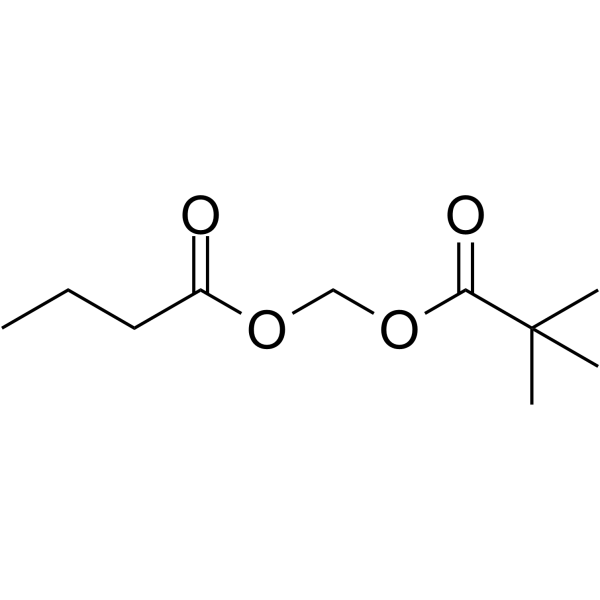
- HY-146293
-
|
|
HDAC
HSP
|
Cancer
|
|
HDAC6/HSP90-IN-1 (compound 17) is a potent and selective dual inhibitor of HDAC6 and HSP90, with IC50 values of 4.3 and 46.8 nM, respectively. HDAC6/HSP90-IN-1 down-regulates PD-L1 expression in INF-γ treated H1975 lung cancer cells. HDAC6/HSP90-IN-1 inhibits tumor growth in human H1975 xenograft mice .
|
-
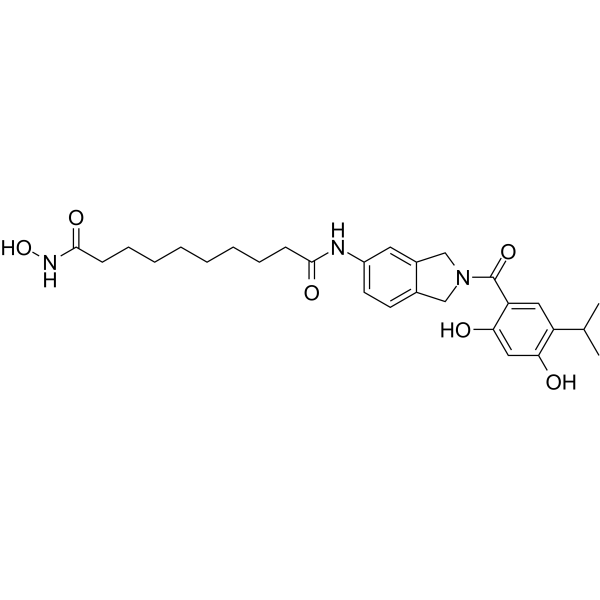
- HY-107417
-
|
|
VEGFR
MEK
FLT3
PDGFR
ERK
|
Cancer
|
|
Hypothemycin, a fungal polyketide, is a multikinase inhibitor with Kis of 10/70 nM, 17/38 nM, 90 nM, 900 nM/1.5 μM, and 8.4/2.4 μM for VEGFR2/VEGFR1, MEK1/MEK2, FLT-3, PDGFRβ/PDGFRα, and ERK1/ERK2, respectively .
|
-
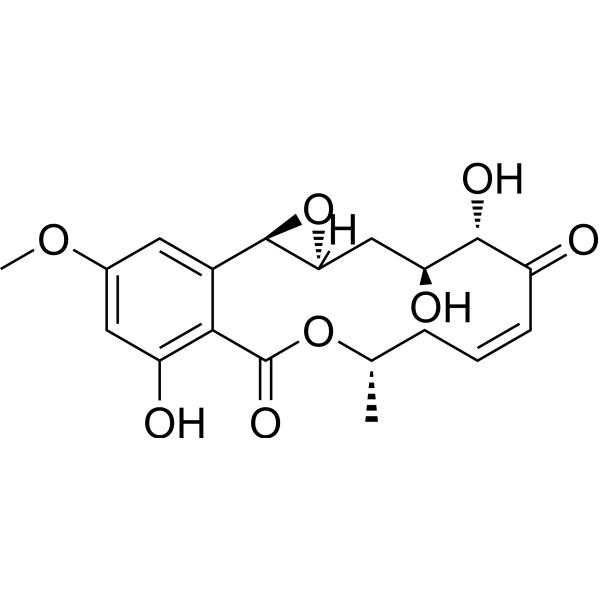
- HY-147864
-
|
|
c-Fms
c-Kit
Apoptosis
|
Cancer
|
|
c-Fms-IN-12 (Compound 4g) is an FMS kinase inhibitor. c-Fms-IN-12 can also inhibits c-KIT. c-Fms-IN-12 is a potential broad-spectrum anticancer agent against multiple cancer types. c-Fms-IN-12 induces A549 cell apoptosis .
|
-
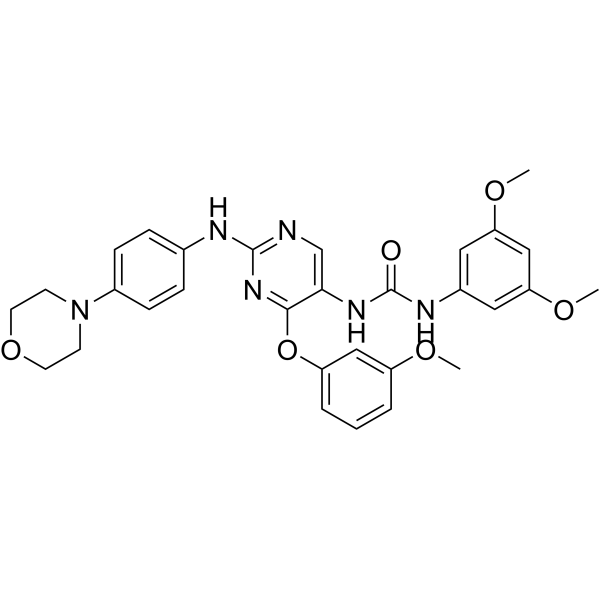
- HY-106381
-
|
|
PKC
|
Inflammation/Immunology
Cancer
|
|
Aurothiomalate sodium is a potent and selective oncogenic PKCι signaling inhibitor. Aurothiomalate sodium inhibits tumor cell proliferation and not cell apoptosis. Aurothiomalate sodium is a potent thioredoxin reductase (TrxR) inhibitor. Aurothiomalate sodium, an anti-rheumatoid agent, exhibits potent anti-tumor activity .
|
-
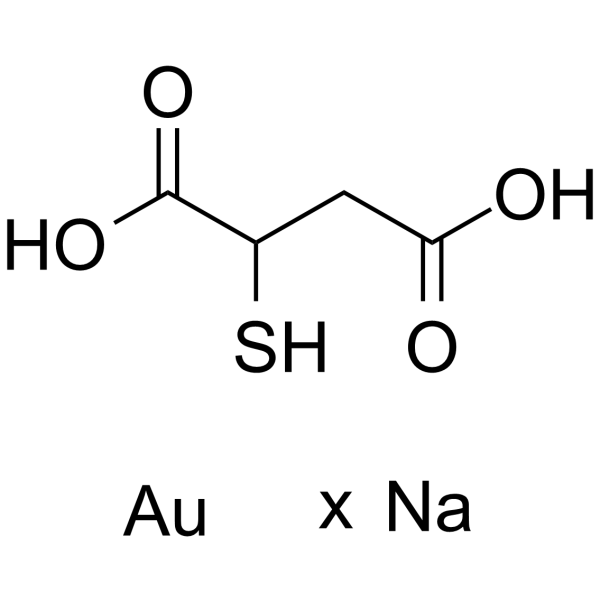
- HY-19357
-
-
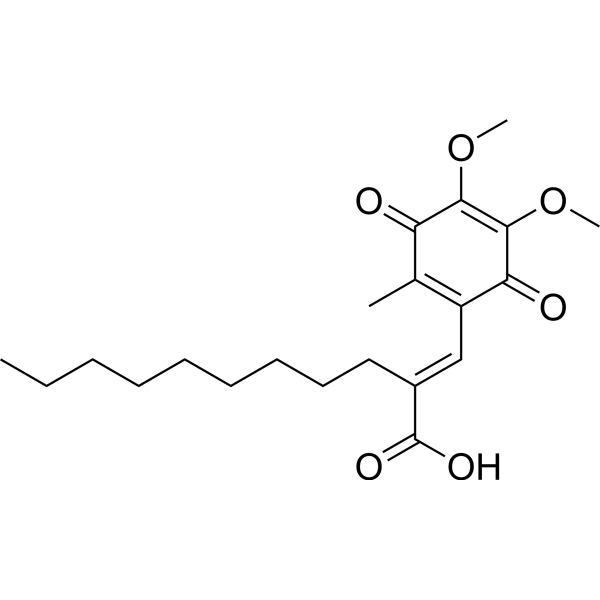
-
-
HY-L075
-
|
|
1835 compounds
|
|
Lung cancer is a major global health problem, as it is the leading cause of cancer-related deaths worldwide. Lung cancer is divided into two categories: small cell lung cancer and non-small cell lung cancer (NSCLC). Non-small cell lung cancer accounts for about 85 percent of lung cancers.
As with all cancers, lung cancer may be treated with surgery, chemotherapy, radiation therapy, targeted therapy, immunotherapy or a combination thereof. Targeted therapy is one of the most exciting developments in lung cancer medicine, especially for NSCLC. Extensive genomic characterization of NSCLC has led to the identification of molecular subtypes of NSCLC that are oncogene addicted and exquisitely sensitive to targeted therapies. These include activating mutations in epidermal growth factor receptor (EGFR) and BRAF or echinoderm microtubule-associated protein-like 4 (EML4)-anaplastic lymphoma kinase (ALK) fusions and ROS1 receptor tyrosine kinase fusions. These are important targets for target therapy.
MCE offers a unique collection of 1835 compounds with identified and potential anti-lung cancer activity. These compounds target lung cancer’s major targets and signaling pathways. MCE anti-lung cancer compound library is a useful tool for anti-lung cancer drugs screening and other related research.
|
| Cat. No. |
Product Name |
Type |
-
- HY-114491
-
|
|
Fluorescent Dyes/Probes
|
|
Rineterkib (compound B) is an orally available ERK1 and ERK2 inhibitor in the treatment of a proliferative disease characterized by activating mutations in the MAPK pathway. The activity is particularly related to the treatment of KRAS-mutant NSCLC, BRAF-mutant NSCLC, KRAS-mutant pancreatic cancer, KRAS-mutant colorectal cancer (CRC) and KRAS-mutant ovarian cancer. Rineterkib hydrochloride can also inhibit RAF .
|
-
- HY-D2208
-
|
|
Fluorescent Dyes/Probes
|
|
binds to dsDNA, which emits green fluorescence. MVRGreen is suitable for staining live bacteria, including gram-positive and Gram-negative bacteria.
|
-
- HY-50895G
-
|
ZD1839 (GMP)
|
Fluorescent Dye
|
|
Gefitinib (ZD1839) (GMP) is Gefitinib (HY-50895) produced by using GMP guidelines. GMP small molecules work appropriately as an auxiliary reagent for cell therapy manufacture. Gefitinib is a potent, selective and orally active EGFR tyrosine kinase inhibitor .
|
| Cat. No. |
Product Name |
Type |
-
- HY-50895G
-
|
ZD1839 (GMP)
|
Biochemical Assay Reagents
|
|
Gefitinib (ZD1839) (GMP) is Gefitinib (HY-50895) produced by using GMP guidelines. GMP small molecules work appropriately as an auxiliary reagent for cell therapy manufacture. Gefitinib is a potent, selective and orally active EGFR tyrosine kinase inhibitor .
|
| Cat. No. |
Product Name |
Target |
Research Area |
-
- HY-P5005
-
|
|
Biochemical Assay Reagents
|
Cancer
|
|
VIPhyb (compound VIPhyb) is a vasoactive intestinal polypeptide (VIP) receptor antagonist that can be used in the study of cancers such as non-small cell lung cancer (NSCLC) .
|
-
- HY-P10087
-
|
Mouse TREM-1(213–221), GF9
|
Peptides
|
Cancer
|
|
Mouse TREM-1 SCHOOL peptide (Mouse TREM-1(213-221), GF9) targets interactions between TREM-1 and its signaling partner DAP-12, and inhibits TREM-1 signaling. Mouse TREM-1 SCHOOL peptide has antitumor effect .
|
-
- HY-P3430
-
|
|
Peptides
|
Cancer
|
|
JM3A is a highly specific peptoid reagent that targets newly appears cell surface vimentin (CSV) on tumor-transformed early lung cancer cells. JM3A can detect and stain CSV by coupling with fluorophores .
|
| Cat. No. |
Product Name |
Target |
Research Area |
-
- HY-P9964
-
|
|
EGFR
|
Cancer
|
|
Necitumumab is a human IgG monoclonal antibody directed against EGFR. Necitumumab can be used for research of NSCLC, colorectal cancer, etc .
|
-
- HY-P99269
-
|
BIBH 1; Anti-Human FAP Recombinant Antibody
|
FAP
|
Cancer
|
|
Sibrotuzumab (BIBH 1) is a humanized IgG1 monoclonal antibody targets fibroblast activation protein (FAP). Sibrotuzumab can be used for the research of colorectal cancer and non-small cell lung cancer (NSCLC) .
|
-
- HY-P99202
-
|
|
Inhibitory Antibodies
|
Cancer
|
|
Vibostolimab is an anti-TIGIT (T cell immunoglobulin and ITIM domain) monoclonal antibody. Vibostolimab shows antitumor activity, and can be used in non-small cell lung cancer (NSCLC) and melanoma research .
|
-
- HY-P99223
-
|
MEDI-575
|
PDGFR
|
Cancer
|
|
Tovetumab (MEDI-575) is an anti-PDGFRα monoclonal antibody that selectively blocks the PDGFRα signal transduction. Tovetumab can be used in the research of glioblastoma and non-small cell lung cancer (NSCLC) .
|
-
- HY-P99827
-
|
TSR-022; GSK4069889
|
Tim3
|
Cancer
|
|
Cobolimab (TSR-022) is an anti-TIM-3 monoclonal antibody. Cobolimab mediates the internalization of TIM3 with an IC50 value of 0.4464 nM. Cobolimab has potential application in solid tumors and non-small cell lung cancer (NSCLC) .
|
-
- HY-P9986
-
|
|
Inhibitory Antibodies
|
Inflammation/Immunology
Cancer
|
|
Tiragolumab is an immune checkpoint inhibitor binding to T-cell immunoglobulin and ITIM domain (TIGIT). Tiragolumab, alone or in combination with the PD-L1 inhibitor Atezolizumab (HY-P9904), may be effective against multiple solid malignancies-most notably non-small cell lung cancer (NSCLC) .
|
-
- HY-P9971
-
|
SHR-1210
|
PD-1/PD-L1
|
Cancer
|
|
Camrelizumab (SHR-1210) is a potent humanied high-affinity IgG4-κ monoclonal antibody (mAb) to PD-1. Camrelizumab binds PD-1 at a high affinity of 3 nM and inhibits the binding interaction of PD-1 and PD-L1 with an IC50 of 0.70 nM. Camrelizumab acts as anti-PD-1/PD-L1 agent and can be used for cancer research, including NSCLC, ESCC, Hodgkin lymphoma, and advanced HCC et,al .
|
-
- HY-P99379
-
|
CAN04; Anti-IL-1RAP/IL-1R3 Reference Antibody (nidanilimab)
|
Interleukin Related
|
Cancer
|
|
Nidanilimab (CAN04) is a fully humanized monoclonal anti-IL1RAP antibody with a Kd value of 1.10 pM. Nidanilimab blocks IL1α and IL1β signaling and stimulates the immune system to destroy tumour cells. Nidanilimab can be used in research of non-small lung cancer (NSCLC) and pancreatic ductal adenocarcinoma (PDAC) .
|
-
- HY-P99675
-
|
AK112
|
PD-1/PD-L1
VEGFR
|
Cancer
|
|
Ivonescimab (AK112) is a PD-1/VEGF Bispecific Antibody. Ivonescimab can be used for cancer research .
|
-
- HY-P9920
-
|
|
VEGFR
|
Cancer
|
|
Ramucirumab is a human VEGFR-2 antagonist for the treatment of solid tumors. Ramucirumab is a recombinant human immunoglobulin G1 monoclonal antibody that binds to the extracellular binding domain of VEGFR-2 and prevents the binding of VEGFR ligands: VEGF-A, VEGF-C, and VEGF-D. Ramucirumab is also an angiogenesis inhibitor .
|
-
- HY-P99109
-
|
GLS-010; AB-122; WBP-3055
|
PD-1/PD-L1
|
Cancer
|
|
Zimberelimab (GLS-010) is a fully human IgG4 anti-PD-1 monoclonal antibody with an EC50 of 210 pM for human PD-1. Zimberelimab effectively blocks the binding of PD-L1 and PD-L2 to cell-surface PD-1 in CHO-S cells, with IC50 values of 580 pM and 670 pM, respectively. Zimberelimab shows antitumor activities, and can be used for various cancers research, including cervical cancer, non-small cell lung cancer and classical Hodgkin’s lymphoma .
|
-
- HY-P99254
-
|
1E10
|
Inhibitory Antibodies
|
Inflammation/Immunology
Cancer
|
|
Racotumomab (Anti-Human NGcGM3 Recombinant Antibody) is an anti-idiotype monoclonal antibody (MAb). Racotumomab reacts to Neu-glycolyl (NeuGc)-containing gangliosides, sulfatides, and other antigens expressed in tumors. Racotumomab is an active anticancer agent for lung cancer .
|
-
- HY-P99108
-
-
- HY-P99114
-
|
|
PD-1/PD-L1
|
Cancer
|
|
Sugemalimab is a fully human, full length, anti-programmed death ligand 1 (PD-L1) immunoglobulin G4 (IgG4) monoclonal antibody (mAb). Sugemalimab shows anticancer activities and can be used for non-small cell lung cancer research .
|
-
- HY-P99284
-
|
MK-0646; h7C10
|
IGF-1R
Apoptosis
|
Cancer
|
|
Dalotuzumab (MK-0646) is a recombinant humanized monoclonal antibody (IgG1 type) targeting IGF-1R. Dalotuzumab acts by inhibiting IGF-1- and IGF-2-mediated tumor cell proliferation, IGF-1R autophosphorylation, and Akt phosphorylation. Dalotuzumab also induces apoptosis and cycle arrest. Dalotuzumab in combination with other anticancer agents such as statins can enhance the antitumor activity of Dalotuzumab in vitro and in vivo .
|
| Cat. No. |
Product Name |
Category |
Target |
Chemical Structure |
-
- HY-137295
-
-

-
- HY-N8321
-
-

-
- HY-W004206
-
-

-
- HY-N11912
-
-

-
- HY-N2104
-
-

-
- HY-N4139
-
-

-
- HY-N9954
-
-

-
- HY-N0883
-
-

-
- HY-N2993
-
-

-
- HY-N8207
-
-

-
- HY-N3974
-
-

-
- HY-N1121
-
-

-
- HY-N0373
-
-

-
- HY-N2359
-
-

-
- HY-W004284
-
-

-
- HY-N2278
-
-

-
- HY-108016
-
-

-
- HY-107417
-
|
|
Structural Classification
Monophenols
Microorganisms
Antifungal
Macrolide Antibiotics
Classification of Application Fields
Antibiotics
Source classification
Phenols
Disease Research
Disease Research Fields
Cancer
|
VEGFR
MEK
FLT3
PDGFR
ERK
|
|
Hypothemycin, a fungal polyketide, is a multikinase inhibitor with Kis of 10/70 nM, 17/38 nM, 90 nM, 900 nM/1.5 μM, and 8.4/2.4 μM for VEGFR2/VEGFR1, MEK1/MEK2, FLT-3, PDGFRβ/PDGFRα, and ERK1/ERK2, respectively .
|
-

| Cat. No. |
Product Name |
Chemical Structure |
| Cat. No. |
Product Name |
|
Classification |
-
- HY-147858
-
|
|
|
Alkynes
|
|
PROTAC EGFR degrader 7 (compound 13b) is a potent and selective CRBN-recruiting PROTAC EGFR L858R/T790M degrader, with a DC50 of 13.2 nM. PROTAC EGFR degrader 7 inhibits NCI–H1975 cells proliferation, with an IC50 of 46.82 nM. PROTAC EGFR degrader 7 significantly induces apoptosis and G2/M phase arrest in NCI–H1975 cell. PROTAC EGFR degrader 7 shows antitumor activity, and can be used for non-small cell lung cancer (NSCLC) research . PROTAC EGFR degrader 7 is a click chemistry reagent, it contains an Alkyne group and can undergo copper-catalyzed azide-alkyne cycloaddition (CuAAc) with molecules containing Azide groups.
|
Your information is safe with us. * Required Fields.
Inquiry Information
- Product Name:
- Cat. No.:
- Quantity:
- MCE Japan Authorized Agent:









































































































































































































































